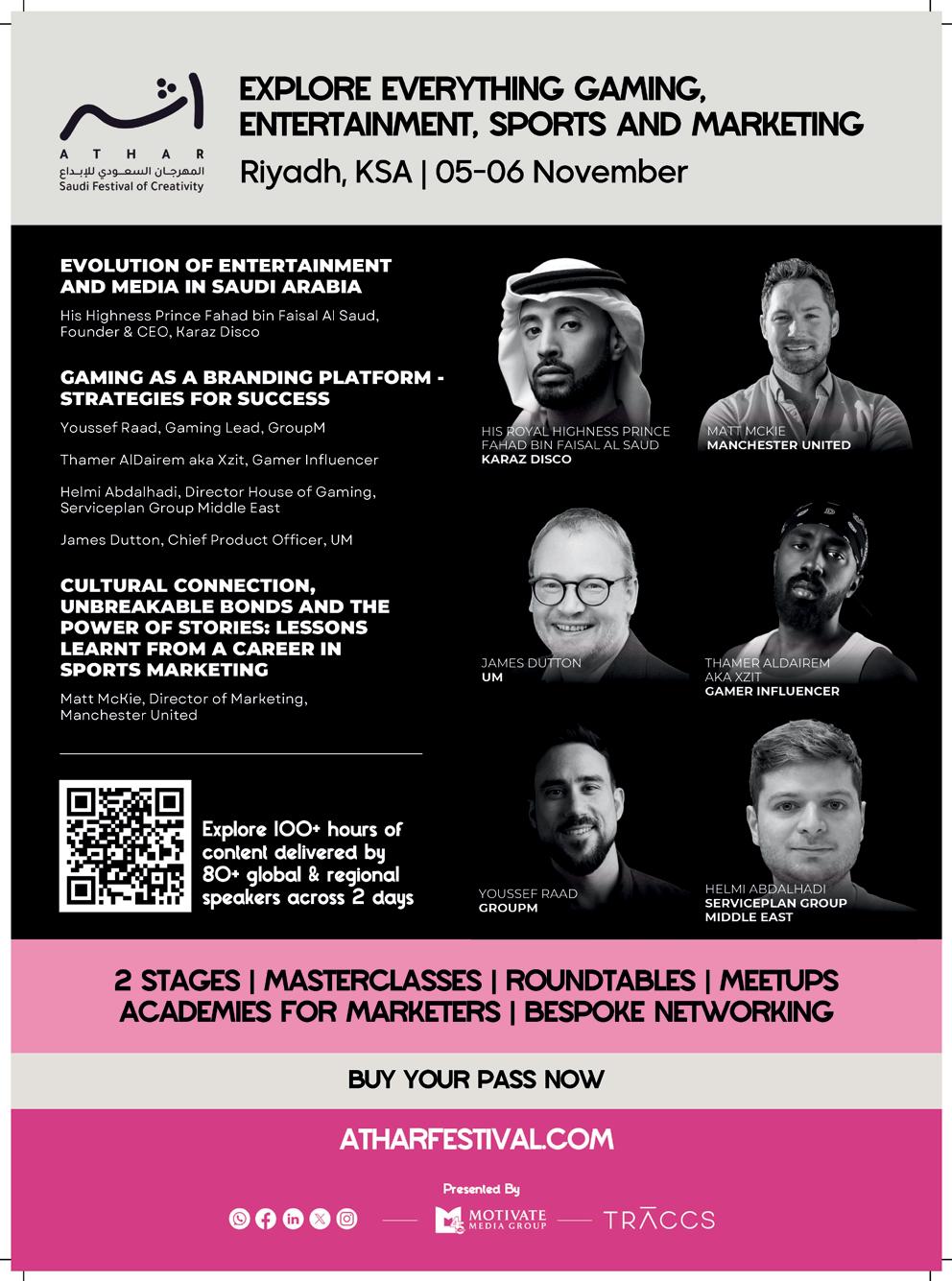

THE BEAUTY OF WORKING WITH STRONG PARTNERS IS THAT YOU CAN COME UP WITH GREAT, INNOVATIVE SOLUTIONS THAT WORK FOR BOTH ENTITIES.
KHALID ALKHUDAIR CEO, SMC

















THE BEAUTY OF WORKING WITH STRONG PARTNERS IS THAT YOU CAN COME UP WITH GREAT, INNOVATIVE SOLUTIONS THAT WORK FOR BOTH ENTITIES.



















SMC CEO Khalid Alkhudair explains how the company is evolving into a regional champion within the media, advertising, sports and entertainment landscape.

Motivate Media Group
Head Office: 34th Floor, Media One Tower, Dubai Media City, Dubai, UAE. Tel: +971 4 427 3000, Fax: +971 4 428 2266. Email: motivate@motivate.ae Dubai Media City: SD 2-94, 2nd Floor, Building 2, Dubai, UAE. Tel: +971 4 390 3550, Fax: +971 4 390 4845 Abu Dhabi: Motivate Advertising, Marketing & Publishing, PO Box 43072, Abu Dhabi, UAE. Tel: +971 2 677 2005, Fax: +97126573401, Email: motivate-adh@motivate.ae
Saudi Arabia: Regus Offices No. 455 - 456, 4th Floor, Hamad Tower, King Fahad Road, Al Olaya, Riyadh, KSA. Tel: +966 11 834 3595 / +966 11 834 3596. Email: motivate@motivate.ae
London: Motivate Publishing Ltd, Acre House, 11/15 William Road, London NW1 3ER. Email: motivateuk@motivate.ae www.motivatemedia.com
EDITORIAL: Motivate Media Group Editor-in-Chief Obaid Humaid Al Tayer | Managing Partner and Group Editor Ian Fairservice Campaign Middle East Editor Anup Oommen | Reporter Ishwari Khatu | Junior Reporter Shantelle Nagarajan
DESIGN: Senior Designer Thokchom Remy
ADVERTISING ENQUIRIES: Chief Commercial Officer Anthony Milne | Publisher Nadeem Ahmed Quraishi (nadeem@motivate.ae) Sales Manager Tarun Gangwani (tarun.gangwani@motivate.ae)
PRODUCTION: General Manager S. Sunil Kumar | Production Manager Binu Purandaran | Production Supervisor Venita Pinto
HAYMARKET MEDIA GROUP: Chairman Kevin Costello | Managing Director Jane Macken





Ccopyright of Haymarket. Campaignis a trademark of Haymarket and is used under licence. The views and opinions expressed within this magazine are not necessarily those of Haymarket Magazines Limited or those of its contributors.
“STEP BEYOND THE COMFORT
ontent is king. Whether it’s doomscrolling on social media, binge-streaming television, or getting distracted by a digital billboard at a traffic signal, we are constantly entertained, informed, and provoked through dopamineinducing video content. It’s no surprise that given the seemingly unending supply of content in this world, brands and advertisers have stepped up the competition for the intangible currency we possess – our time and attention. In tandem, expectations of production houses, content creators, and influencers have skyrocketed alongside the correspondingly high demand from critics and consumers baying for higher quality content across all formats.
In this edition of the magazine, we not only share a directory of the production houses in the region, their specialisms, and the clients they serve, but also turn a spotlight on the challenges that leaders in the production industry are facing. According to them, the speed of digital consumption, explosion of digital platforms, and the never-ending content feed has caused immense pressure. They’re being asked to deliver engaging video content, in trending formats, with high-definition visuals, and complex CGI within very tight deadlines and tighter budgets.
However, on a positive note, there’s been an abundance of homegrown talent blooming in the region, from local scriptwriters and editors to directors, filmmakers and production crew. As a result, rather than following a ‘one-size-fits-all’ approach or importing and testing ‘global best practices’ in the region, the coming together of homegrown talent and tech-leaning creatives has resulted in human-centred storytelling, muchneeded cultural flavour, and stronger trust and loyalty in brands rooted in regional narratives. Also, we can’t ignore the elephant in the room: generative AI (GenAI) has well and truly entered the conversation. Regional brands such as Chalhoub Group have already demonstrated the impact of completely AI-driven campaigns, eliminating the need for budgets set aside for models, photographers, and physical locations.
Yet, leaders within the industry have opined: although GenAI is a powerful tool, human creativity and insights will always remain the fuel driving the industry. What’s next? The future for production houses will require people willling to step beyond their comfort zone to bring bold ideas to life in order to witness true brand impact. Ali Azarmi, Managing Partner, Joy Films encapsulatives it well, saying, “Great ideas break the rules. They are unexpected, different and daring, so they should make decision-makers a little nervous and uncomfortable. It takes a brave client to see the potential and take the plunge.”
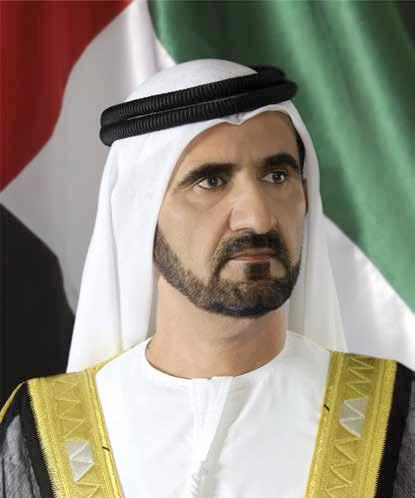
The Kingdom of Saudi Arabia-based media, marketing and creative agency Lhamim has secured four new clients: Alramz Real Estate, Petromin Corporation, the Public Investment Fund’s (PIF’s) Halal Products Development Company (HPDC), and the Ministry of Culture’s Saudi National Commission for Education, Culture and Science.
Each of these four clients brings a tailored and bespoke scope of work to the agency.
The new business wins bring an array of different tasks to the agency including advertising campaigns, comprehensive marketing strategies, comprehensive marketing and communications support, including strategy development, visual production, and social media management.
Lhamim’s Founder and CEO Saleh Aleidah said with the new business comes a sense of responsibility to raise the Kingdom’s status globally.
His Highness Sheikh Mohammed bin Rashid Al Maktoum, Ruler of Dubai, and UAE Vice President and Prime Minister, has created the Mada Media Company, a private joint-stock company (PJSC), to manage and operate advertising sites in Dubai, under law No. (20) of 2024.
Mada Media Company is tasked with managing, developing, and operating advertising sites; investing in advertising technologies; conducting research; and ensuring regulatory compliance.
The law also allows the company to form partnerships, own assets, and sign contracts with third parties to achieve its objectives within and outside the emirate.
The Commissioner General for the Infrastructure, Urban Planning, and Well-Being Pillar in Dubai will oversee the company’s operations and ensure it meets its objectives, with the articles of association under the law defining his responsibilities and powers.
HH Sheikh Hamdan bin Mohammed bin Rashid Al Maktoum, Crown Prince of Dubai, Deputy Prime Minister, Minister of Defence, and Chairman of The Executive Council of Dubai, issued Decision No. (79) of 2024 approving the Articles of Association of Mada Media (PJSC), including its rules and provisions.
Furthermore, RTA and Dubai Municipality, in coordination with the Dubai Investment Fund and other relevant entities, will transfer their advertising-related assets, rights, and obligations to the company, including system access.
Government entities will facilitate the transfer and registration of these assets to the company or its subsidiaries in accordance with the concession agreement and applicable provisions.
The law also outlines the mechanisms for subscription and ownership of the company’s shares, the powers of its board of directors, and the human and financial resources it may draw upon.
The company’s shares may be offered for public subscription in ratios set by the Chairman of The Executive Council of Dubai.
HH Sheikh Hamdan also issued Decision No. (80) of 2024 forming the Board of Directors of Mada Media, chaired by Mattar Mohammed Al Tayer, with Hussein Mohammed Al Banna serving as Vice-Chairman.
Members of the Board include: Wissam AlAbbas Hussain Lootah, Mariam Obaid Al Muhairi, Mohammed Yousef Al Mudharreb, Ahmad Hassan Mahboub, Moaza Saeed Al Marri, Shehab Hamad Bu Shehab, and Saeed Mohammed Al Marri.


The United Arab Emirates has claimed its spot among the Top 10 nations featured in the Cannes Lions annual rankings revealed with the Lions Creativity Report, which has been described as the global benchmark for impactful creativity and creative effectiveness.
The UAE ranked eighth worldwide, climbing three spots from its 11th-place ranking in 2023.
Based on the performance from Cannes Lions 2024, the report shows benchmarked work of creative excellence, along with the insights and impact of the results it delivered, demonstrating how the world’s most creative businesses are using creativity as a lever for growth and progress.
In terms of global agencies, Ogilvy claimed the top spot on the podium, followed by Leo Burnett and Dentsu, which claimed the second and third spots respectively.
TBWA Worldwide, McCann Worldwide, VML, AKQA, FCB, and Edelman also claimed their spots within the Top 10 networks on the Cannes Lions ranking.
From a regional perspective, Impact BBDO – Dubai led the rankings, with FP7 McCann – Dubai, and Saatchi & Saatchi ME – Dubai claiming the second and third sports respectively.

Leo Burnett – Dubai & Jeddah, Impact BBDO – Cairo, ADPRO OMD – Amman, Serviceplan Middle East – Dubai, and SRMG Labs – Riyadh closed out the Top 10 agencies in the region.
Other highlights from the rankings include Coca-Cola taking Creative Brand of the Year for the first time. The multinational corporation’s brands received 17 Lions.
Manolo Arroyo, EVP and Global Chief Marketing Officer, The Coca- Cola Company, said, “The


The supermarket chain launched ‘the most likeable and lickable’ campaign to promote its dog food offering and lead dog ‘pawrents’ to the brand’s mobile app. In an interesting twist, the creative agency developed a campaign that targeted the dogs themselves, instead of their owners. This was done with the creation of out-of-home posters, slathered with aromas of the store’s most-loved doggie delights. The posters were then placed across hot-spots for dogs in Dubai. With shots from a dog’s point of view, and comedic jerks and pulls towards the dog-intended posters, the result is an endearing journey of dogs leading their humans to advertising made for them.
Omnicom Group has unveiled its new global division Omnicom Advertising Group (OAG), which aligns its creative agencies globally under one leadership team, following which TBWA revealed changes to its global leadership. In the Middle East region, the newly structured OAG will oversee creative networks including Impact BBDO, TBWA, and DDB Dubai.
Coca-Cola Company believes creativity is a superpower that drives growth, inspires people and – most importantly – ignites change.”
WPP was named Creative Company of the Year, with its collaboration with Coca-Cola helping to secure three Gold Lions for ‘Thanks for Coke-Creating’, along with 14 more Lions across four pieces of work.
The United States took the leading spot in the location rankings, followed by Brazil in second place, moving up a place from 2023.
The global OAG leadership will see Troy Ruhanen, formerly Global CEO of TBWA Worldwide, taking the helm as its CEO. Deepthi Prakash, formerly international president and chief product officer of TBWA Worldwide, will take the role of COO at OAG, and Denis Streiff, formerly the CFO of TBWA Worldwide, has now been promoted to global CFO OAG. Erin Riley, current US CEO of TBWA\Chiat\Day, has been elevated to global CEO of TBWA. Erwan Guillou, current TBWA\ Chiat\Day US CFO and global chief pricing officer, has been appointed as global CFO of TBWA. Reda Raad, Group CEO TBWA\ RAAD, said, “After nearly 10 years working under Troy’s leadership, it has been an incredible journey to witness how he transformed TBWA and elevated it to new heights.”


The Commercial International Bank Egypt launched a digital campaign to introduce a new credit card that aims to help medium-sized business owners meet their various company needs. The film shares the fictional story of Mr Magdy, the owner of a medium-sized company, who falls into the trap of overthinking the various expenses of the company to the point of madness. The solution is a CIB Visa credit card, which offers him many benefits that can him help solve his company’s problems. Throughout the ad, the protagonist appears as four different characters. He talks to himself and disagrees about prioritising tasks. Finally, a narrator offers the solution to these problems with the new CIB Visa card.

Dubai’s Roads and Transport Authority (RTA) has awarded the naming rights of Mashreq metro station to InsuranceMarket.ae, the largest insurance platform in the UAE.
The Mashreq metro station will be fully rebranded as InsuranceMarket.ae metro station for 10 years.
The station is on the Red Line between Mall of The Emirates and Dubai Internet City metro stations, located on Sheikh Zayed Road.
Abdul Mohsen Ibrahim Kalbat, CEO of the Rail Agency at RTA, emphasised that RTA is dedicated
to establishing successful partnerships with the private sector because of its vital role in stimulating economic growth.
He said that the collaboration with InsuranceMarket.ae serves as a model for a successful public-private partnership, benefiting from RTA’s projects and initiatives, creating job opportunities in various fields, and paving the way for the private sector to support the government’s direction.
The Emirate of Dubai provides an excellent platform for major companies and entrepreneurs to


The real estate developer’s CSR brand campaign, in collaboration with Arsenal Women FC, aims to highlight its focus on empowering women and girls by offering access to opportunities, raising awareness about the need for female education, and promoting the shared values of inclusion, equality, and social responsibility. community and beyond. The campaign intended to offer an inspiring glimpse into the dreams and ambitions of the next generation of young women, illustrating how they can be empowered through opportunity and accessibility. The collaboration also reiterates a commitment to equality in football, by providing equal opportunities.
showcase and promote their brands and Dubai’s metro stations offer a unique and advanced advertising opportunity for companies and investors in the UAE and the region, he added.
“Here, they can market their products, services, and solutions across various economic and commercial sectors. This aligns with their goals to enhance global competitiveness, grow their businesses in Dubai and the UAE, and expand into international markets,” added Kalbat.
Avinash Babur, Founder and CEO of InsuranceMarket.ae, expressed his appreciation for the awarding of the metro station naming rights, noting that having one of Dubai’s iconic metro stations dedicated to InsuranceMarket is a significant milestone in the insurance provider’s journey.
He said the new station’s name aims to draw a parallel between the metro’s role in connecting people across Dubai and InsuranceMarket.ae’s mission to connect customers with the right insurance solutions.
As RTA’s media partner, Hypermedia is responsible for RTA’s OOH media landscape and will oversee the rebranding of the metro station.
Habib Wehbi, Chairman and Group CEO of W Group Holding, the parent company of Hypermedia, commented on the change.
“This naming rights agreement further strengthens our comprehensive out-of-home media offering across Dubai Metro. By partnering with InsuranceMarket.ae, we are complementing the existing naming rights partnerships and completing our media solutions in this key transportation network,” said Wehbi.
“This collaboration underscores Hypermedia’s ongoing commitment to delivering strategic and innovative media exposure in Dubai,” Wehbi added.
From September to November 2024, RTA will be renaming the station on the external as well as the indoor and outdoor directional signage.
The new name will also be updated on the smart systems and RTA’s public transport apps, along with the onboard audio announcements before and at the time of arriving at the station.


The trailer reel, directed by Guy
was launched to promote the 2024 Riyadh Season Card Wembley Edition. The reel stars prominent British boxers who find themselves in tight spots, battered and bruised, teetering on the edge of defeat as if the final bell is about to toll. Just as all hope seems lost, they manage to conjure up that fighting spirit in them, spurred on by a rendition of the sporting anthem Sweet Caroline, by Neil Diamond. The beautiful song, coupled with brutal imagery, aims to inject an absurdly uplifting energy. The film is gritty, dynamic and riveting, with no CGI transitions to distract the viewer, but instead, captured through the lens of a timeless cinematic approach.

Al Masaood’s Marwa Kaabour emphasises the importance of transparency, feedback and face-to-face communications for successful transformation.
Transformation is inevitable for companies seeking to remain competitive. Whether driven by digital innovation, sustainability initiatives, or evolving market demands, transformation can lead to remarkable growth. But the success of any transformation is largely dependent on effective internal communication.
Communication is not just an organisational function; it is the bedrock that ensures alignment, transparency, and trust during times of change.
COMMUNICATE FROM THE TOP
Transformation begins at the leadership level, and so should communications. Employees look to their leaders for guidance, especially during periods of uncertainty. Clear and consistent messaging from the top fosters confidence and reinforces a shared sense of purpose.
Leaders must take the responsibility of articulating the vision for transformation, explaining why the change is necessary, and setting expectations for what success looks like. Regular touchpoints, whether through town halls, video messages, or direct interactions, help keep employees connected to the leadership’s strategic intent.
At Al Masaood, this principle was demonstrated during Project Leap, a corporate support services initiative designed to elevate service quality across the group. The leadership team actively communicated the objectives of the project, ensuring that every employee understood the broader vision of ‘Going Further & Faster Together’.
ENSURE TRANSPARENCY
Transparency is critical in fostering trust. Employees are more likely to embrace change when they feel informed about what’s happening and why. Leaders need to be upfront about the challenges that the organisation faces, and the decisions being made to address them. Transparency involves sharing both the good and the bad. This leads to a more resilient workforce that is prepared to navigate the complexities of transformation.
During our Project Leap retreat, transparency was key to aligning corporate support services with the company’s growth strategy. Business leaders and teams openly discussed the areas that required improvement and the potential obstacles they might face. This openness helped create a culture where employees felt they were part of the solution, not just spectators of the change.
No transformation journey is without its setbacks. So, it’s vital to communicate them as they arise. Hiding or downplaying setbacks only erodes trust and creates uncertainty. When challenges occur, addressing them openly and honestly is the best approach. It demonstrates to employees that leadership is both aware of the situation and committed to finding solutions.
Transformation can often be overwhelming, leaving employees with numerous questions. To mitigate uncertainty, it is essential to create a space where employees feel comfortable seeking clarification and sharing their feedback.

Providing platforms for inputs and questions – whether through Q&A sessions, internal communication channels, or dedicated forums – ensures that everyone is on the same page and that concerns are addressed in a timely manner.
For communication to be effective, employees must feel that it is safe to express their thoughts, ideas, and concerns without fear of retribution.
Creating a safe environment for communication involves establishing clear guidelines on respect and confidentiality, as well as modelling the right behaviours from the top down. When employees feel safe, they are more likely to engage meaningfully in the transformation process.
Going beyond emails and memos to incorporate roadshows, events, and micro meetings brings a human element to the transformation process.
These face-to-face interactions help build stronger connections and provide an opportunity for real-time feedback. They also allow leaders to gauge the emotional temperature of the workforce and address concerns directly.
Ultimately, successful transformation requires uniting the entire organisation under a shared vision. When employees understand the ‘why’ behind the transformation and how their roles contribute to the larger picture, they are more likely to be engaged and motivated. Crafting a compelling vision that resonates with the workforce and consistently reinforcing it throughout the transformation journey is key.
By Marwa Kaabour, Group Head of Marketing & Corporate Communication, Al Masaood







The surge of a digital-savvy generation in the Middle East in tandem with colossal technological breakthroughs have shifted priorities towards key partnerships, diversified strategies, borderless branding, data-driven decisions, and heavy investments in talent, digital infrastructure, and sponsorships.
The long overdue blend of the right assets, content, events, and entertainment have created several innovative ways for advertisers to connect with specific demographics, redefining the media, advertising, sports, and entertainment landscape in the Middle East.
Campaign Middle East welcomed Khalid Alkhudair, CEO of SMC, to its On The Record podcast to discuss key trends and how SMC is shaping this landscape.
EVOLUTION OF A REGIONAL POWERHOUSE
Khalid Alkhudair, who is the first Ashoka Fellow from Saudi Arabia, a Young Global Leader at the World Economic Forum, and a member of the General Entertainment Authority’s Board of
Management, joined SMC in 2022 and since then has overseen remarkable investments, partnerships, profits, and transformation through this tenure. However, dialling back the clock to SMC’s origins, Alkhudair revealed, “When it was birthed six years ago, the organisation was initially called AlWasail Company and was solely focused on working together with the Saudi Broadcasting Authority, as its exclusive media sales representative. Over time, Al-Wasail expanded into other verticals, including an investment in Alawwal Park – which is currently home to the Al-Nassr Football Club – and, thus, diversified the company from being a media entity into having an investment arm in sports and entertainment, as well.”
He added, “In 2022, we had a reshuffle in the strategy. We had to consolidate our approach to the market, and that’s when SMC was born. The management of the company had a vision that SMC would turn into the national champion for Saudi in the field of media. To achieve this vision, we created a brand that hits a home run in the Kingdom, and at the same time is adaptable and agile on a regional and global level.”
As part of the Engineer Holding Group (EHG), SMC is the sister company of Saudi Arabia’s out of home (OOH) giant Al Arabia. SMC has invested in commercial integrated advertising and content solutions provider MBC Media Solutions (MMS) and owns 40 percent of the entity.
“Today, SMC is divided into three verticals,” Alkhudair explained. “The first vertical is media and digital, where we work on a number of assets – locally and globally – including offline media, print, digital, as well as airline inflight entertainment. The second vertical is sports and entertainment, which includes an investment in Alawwal Park stadium, which SMC operates and manages. The third vertical is its investments, including in Webook.com, one of the largest ticketing platforms in the region.”
SMC is also the commercial representative for the Saudi Football Federation and the Riyadh Season – a series of entertainment, cultural, and sporting events held in Saudi Arabia’s capital City of Riyadh. Additionally, the company has partnerships with the BeIN Media Group, and the Saudi Broadcasting Authority.
The company also manages IPs for Saudi Arabia’s Ministry of Sport and the Kingdom’s General Entertainment Authority, while also bringing in successful IPs such as the Egypt Super Cup played during the Riyadh Season in Alawwal Park. For these events, the company identifies media opportunities, packages and prices them, negotiates sponsorships, and oversees the execution of on-ground activations.
“We now have three offices across Riyadh, Dubai, and Cairo with more than 100 employees. We’re very proud that we’ve witnessed more than 200 per cent growth over the past two years and that growth is continuing,” Alkhudair said.
When asked about the secret behind this success, he added, “Our strength lies in our relationships. Take into consideration that our sister company Al Arabia has been a major player in the OOH and media industry for more than 45 years, and has set a great baseline. We’ve built on this baseline and have established great relationships with media buying agencies across the region.”
“We understand the Kindom’s vision, the target audiences and demographics that we need to communicate to, and we then partner and acquire assets that are tailored to the needs of the audiences that Saudi Arabia’s governmental entities are targeting,” Alkhudair explained.
SMC has also been credited with the digitalisation of the Alawwal Park, which has now also become home to footballing legend Cristiano Ronaldo, who plays with Al Nassr Football Club.
SMC CEO Khalid Alkhudair explains how the company is evolving into a regional champion within the Middle East media, advertising, sports and entertainment landscape.
By Anup Oommen


“When we decided to invest in it, Alawwal Park was a government-owned university stadium, previously called the King Saud University Stadium, where several local football team used to play. When the owners and management of SMC bid for the stadium at the tender, it caused quite a stir as this would make it the first privatised stadium in the Kingdom,” Khalid Alkhudair revealed.
SMC then brought in several top consultants and stadium managers to look into the full experience that the stadium could potentially provide, which led to the digitalisation of the stadium.
“The digitalisation initiative created new revenue streams. We commercialised the seating, the lounges, and the VIP box,” Alkhudair added. “Although it generally takes a long time to break even on large assets, we managed to realise profits within a very short span of time. Today, we have Cristiano Ronaldo playing in the stadium, which has not only brought in global fans and a global audience, but has also helped us take the next step in launching season tickets for all Al Nassr games at our stadium. What does this say about SMC? We remain a commercially driven organisation that likes to think outside the box.”
As the exclusive commercial partner for the Saudi Football Federation, SMC also brokered the deal for the naming rights of the Saudi Super Cup, bringing KSA UNESCO heritage destination Diriyah on board for the sports event to be named the Diriyah Saudi Super Cup. Beyond playing a part in contracting the deal for the Saudi Super Cup, SMC was also involved in the management and organisation of the Diriyah Saudi Super Cup held in Abu Dhabi.
“That is the beauty of working with strong partners, because you can come up with great, innovative solutions that can work for both entities,” Alkhudair said.
Earlier this year, the SMC team also brought together Saudi Arabia’s Public Investment Fund (PIF)-owned business and lifestyle destination King Abdullah Financial District (KAFD) with the Globe Soccer Awards European edition, securing the naming rights for the 2024 edition of the event to be called the KAFD Globe Soccer Awards. The event was attended by the likes of French national and Real Madrid football star Kylian Mbappe.
SMC also manages the commercial assets for Riyadh Season sponsorships and successfully oversaw more than SAR 500mn in sponsorships for the 2023 season. Additionally, SMC facilitated a shirt sponsorship deal for AS Roma, with the Riyadh Season logo prominently displayed on the front of the shirt.
Furthermore, SMC orchestrated the largest sponsorship agreement between the Saudi Football Federation and the Saudi National Bank, the Kingdom’s largest financial institution.
Demonstrating the magnitude of the stadium’s growth, in January 2024, Alawwal Park also hosted the 2024 iteration of the Supercopa de España (Spanish Super Cup), hosting arguably the most-celebrated clubs in the world – Real Madrid and Barcelona –
KHALID
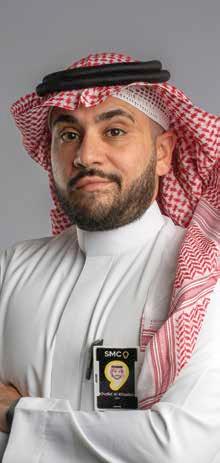
“
THE BEAUTY OF WORKING WITH STRONG PARTNERS IS THAT YOU CAN COME UP WITH GREAT, INNOVATIVE SOLUTIONS THAT WORK FOR BOTH ENTITIES.”
thus garnering worldwide attention and establishing it as a global sporting hub.
Although the media, sports and entertainment landscape in the Middle East is in a constant state of flux, SMC has continued to accelerate on the highest gear, driving the advertising industry towards growth and innovation.
Alkhudair said, “From a media perspective, everything is changing. We have to look at the latest technologies that are out there and how we can continue to create solutions for advertisers. SMC recently opened up opportunities for in-game advertising in the GCC region through a partnership with gaming content and activations company Evolution Group.”
“This will create more organic offerings, which is a big trend for the coming period. Organisations want their
products to be placed within television programmes, movies, video on demand content, or games as organically as possible. The cost for such opportunities is higher, but the message is stronger,” he added.
Of course, our conversation with Alkhudair also encompassed the topic that has dominated most conversations in the region: artificial intelligence (AI), which is causing advertisers to focus more on measurement, outcomes, return on advertising spend (ROAS), and real-time and predictive data -driven insights.
“Yes, AI is in its initial stages, but it is definitely going to change the game,” Alkhudair said. “Everyone wants access to data, better insights, more predictive analytics. If this is available, they will definitely utilise it. In the coming years, we will also see AI play a role in the ways and means that messages are being delivered to audiences – whether it is digital or in real life.”
“AI is already replacing a lot of redundant and repetitive tasks. This means that the onus is on us to keep up with the change, because if we don’t keep up with the constantly evolving industry, there’s a possibility that AI will replace us, as well,” he added.
When asked about the challenges we face today, and how that is likely to affect the future, Alkhudair doubled down on the need to address the skills gap.
“One of the main challenges we face today is talent. The industry has is transforming digitally. So, those who have been working for the past 25 years in the fields of print and production need to shape up to the latest trends and start learning,” he said.
SMC has already begun advocating for technology and training within the organisation.
“It’s very simple, in order to reach this audience, we need to truly understand them, their behaviour, what they’re looking for. So, having people of that age working in your organisation helps add a new perspective. Advertisers also need to start paying attention to the needs and demands of this age group,” Alkhudair said. “At SMC, we ensure that we hire a very big batch of co-ops from universities, a programme that combines classroom education with valuable paid work experience. This not only provides them with the opportunity to get hands-on experience, but also provides us the opportunity to learn from them. This helps us adopt what they are looking for within our products and services.”
Alkhudair confirmed that his outlook for the future of SMC remains positive.
“We have built good momentum, and we’re looking forward carrying this momentum forward. We are already the Saudi champion in the fields of media, sports, entertainment, advertising, and sponsorships. and by the end of the year we will be the regional champion,” he concluded.




‘Omnichannel’ has become a buzzword in marketing circles. Many brands feel the pressure to maintain a presence across websites, mobile apps, social media, and every other channel and platform available. However, while the omnichannel approach is traditionally the gold standard, it’s worth questioning whether this strategy truly serves the best interests of every brand.


Is it possible that brands are diluting their impact by trying to be everywhere at once? What is the most effective strategy for building a strong, cohesive brand?
THE RESOURCE PINNACLE
The allure of an omnichannel strategy lies in its promise to meet customers wherever they are, offering a seamless experience across all platforms. However, the reality can be far less ideal. Resource dilution is a significant challenge; by spreading efforts across multiple channels, brands risk delivering a mediocre experience on all fronts.


An omnipresent strategy strains budgets and timelines and weakens the overall brand experience. Young businesses and start-ups are clued in and understand this. The resources for marketing budgets are flowing over to product and service research development. This is not necessarily something to worry about.



Cheval Group’s Girish Nathaney makes the case against omnichannel strategies for brands.


remains cohesive. It can lead to confusion among consumers and diluted brand identity, which is particularly detrimental in today’s market, where consumers seek brands they can trust and relate to.

Take a magnifying glass to Tesla’s sales models. By focusing more on building a unique product and then incentivising customers to buy the car only directly from the app, Tesla maximised the power of digital tools.
Some experts might disagree with me, but the truth is – no marketer or expansive marketing budget can support a badly designed product for too long.

CMOs must consider the increased complexity and risk of managing multiple platforms. The more complex a brand’s digital operations become, the higher the risk of inefficiencies and errors. This complexity can lead to a fragmented user experience, further eroding the brand’s credibility and appeal. On the other hand, brands that streamline their focus can mitigate these risks and create a more cohesive and impactful user experience.



In contrast, brands that focus on a single channel often find it easier to maintain consistency and clarity. Take Headspace, the meditation app, for example. By concentrating its efforts on optimising its mobile app, Headspace was able to focus on app store optimisation (ASO) to improve visibility and search performance. This targeted approach led to a 40 per cent increase in visibility and an 18 per cent increase in app installs. Headspace’s success highlights how a single-channel focus can ensure that brand messaging remains solid and practical, resonating deeply with its target audience.

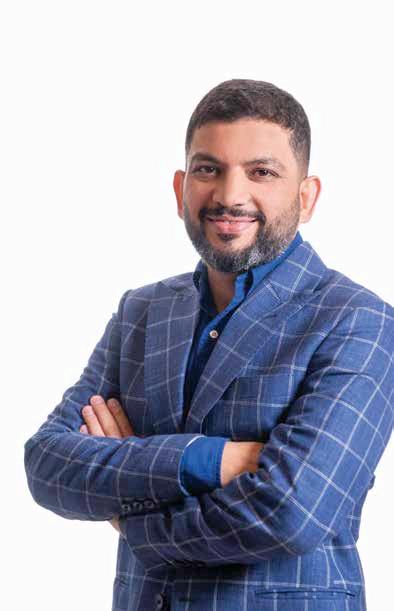

‘‘MANY BRANDS COULD BENEFIT FROM FOCUSING ON A SINGLE PLATFORM.’’
THE POWER OF FOCUSED EXCELLENCE
In contrast, focusing on a single platform allows brands to excel in delivering a high-quality experience. For instance, by investing deeply in an expertly designed and constantly updated mobile app, a brand can create a standout product that meets and exceeds consumer expectations.

Wio Bank is the first one that comes to mind. By investing time in creating a phenomenal digital offering and using the straightforward marketing tactic of the best deal, they have captured a solid market share.

Historically, omnichannel marketing strategies were sold on the idea that they were to create one single voice across all channels and unite brand messaging. However, in today’s world, this only seems to be further muddling.

This is where partnering with specialists, like those focusing on mobile app UI design, becomes invaluable. They ensure the app reflects the latest technological advancements and aligns perfectly with the brand’s identity and goals.

Each channel has its nuances, making it challenging to ensure that messaging

industry. In a landscape where digital saturation is a genuine concern, brands must shift their focus from quantity to quality.
Marketing leaders should replace the pressure to be omnipresent with being exceptional in one area and driving a more experiential and seamless experience offline and online. This shift will improve consumer experiences and help brands build stronger, more lasting connections with their audiences.


Consider the case of KLM Airlines, which sought to increase mobile bookings and create a platform for mobile marketing techniques like location-based notifications. By focusing on enhancing its mobile app and launching a targeted campaign, KLM saw a 34 per cent increase in bookings and a 38 per cent rise in mobile revenue. This success demonstrates how investing in one platform, like a mobile app, can deliver substantial results and strengthen the brand’s market position.

While the omnichannel approach may suit some brands, many could benefit more from concentrating on a single platform. By creating profound, impactful experiences on one channel, brands can ensure their digital presence is consistent and exceptional, ultimately leading to a stronger, more cohesive brand identity that stands out in a crowded market.


BROADER IMPLICATIONS FOR THE INDUSTRY
The implications of this argument are significant for the broader marketing

For brand leaders, the time is now to reassess their digital strategy. Consider where their resources might be better spent and explore how a focused approach could yield more significant results in building a lasting and meaningful connection with their audience.
By Girish Nathaney, Founder, Cheval Group






In the evolving landscape of e-commerce and digital transformation, brands are caught in a fascinating paradox. On one hand, the digital age offers boundless opportunities for creativity in advertising. On the other hand, the overwhelming reliance on data and algorithms threatens to strip marketing of its very soul: the human touch.
As part of a brand that operates in more than 65 markets, I witness daily the delicate dance between creativity and technology. It’s a dance that’s both thrilling and challenging, akin to trying to waltz through a minefield while blindfolded.

‘‘AS MARKETERS, OUR CHALLENGE IS TO USE TECHNOLOGY NOT TO REPLACE CREATIVITY, BUT TO ENHANCE IT.”

Take the advent of AI and machine learning, for instance. These technologies promise to unlock new creative potentials by allowing brands to personalise content at an unprecedented scale.



However, there’s a catch. When creativity is driven solely by algorithms, we risk losing the very essence of what makes a campaign resonate – the human connection. Creativity is not just about pushing products; it’s about telling stories that touch the heart, spark emotions, and inspire action. If we let AI take over completely, we might end up with campaigns that are perfectly optimised but utterly soulless. May they forgive me for the above statement, when they do take over.

resonated globally, garnering more than 14 million views and engaging millions more in a call for peace via our dedicated website. It’s a perfect example of how creativity, when used thoughtfully, can transcend traditional marketing goals to deliver a message that truly matters.









Moreover, in our quest for personalisation, we’re confronted with the challenge of balancing privacy and relevance. Consumers today are hyper-aware of how their data is used, and they demand transparency and control. The fine line between personalised experiences and intrusive ads is thinner than ever. It’s like trying to serve a perfectly cooked steak to a vegan; it’s a delicate matter of knowing your audience’s preferences without making them uncomfortable.



At Aramex, we believe in the power of creativity to drive change, not just sales. This belief was at the heart of our recent Ramadan campaign, ‘The Undelivered’. The campaign
But let’s be honest: creativity in advertising is also about taking risks, sometimes even the kind that make your heart skip a beat. When we launched ‘The Undelivered’, we knew it was a bold move. Addressing the sensitive issue of conflict through the lens of logistics could have easily backfired. But as a brand that often operates in conflict zones, we felt compelled to use our platform to make a statement. And it paid off. The campaign became one of our most talked-about initiatives, not because it was safe or conventional, but because it was daring and sincere. It reminded the world that sometimes, even the simplest message – a call for peace – can be the most powerful.

In a world where brands are increasingly competing for attention in a cluttered digital space, the role of creativity cannot be understated. It’s what sets us apart, what makes us memorable. As marketers, our challenge is to use technology not to replace creativity, but to enhance it, to find that perfect harmony where data informs, but imagination leads. After all, even in a digital age, the most compelling stories are the ones that are deeply human.




In conclusion, the future of advertising lies not in choosing between creativity and technology, but in finding the sweet spot where they intersect. At Aramex, we will continue to navigate this everchanging landscape with creativity at our core, reminding ourselves that while we may deliver parcels, it’s the stories we tell and the impact we make that truly define us.








Aramex’s Shahir Sirry on the creative odyssey of marketing in the digital age.


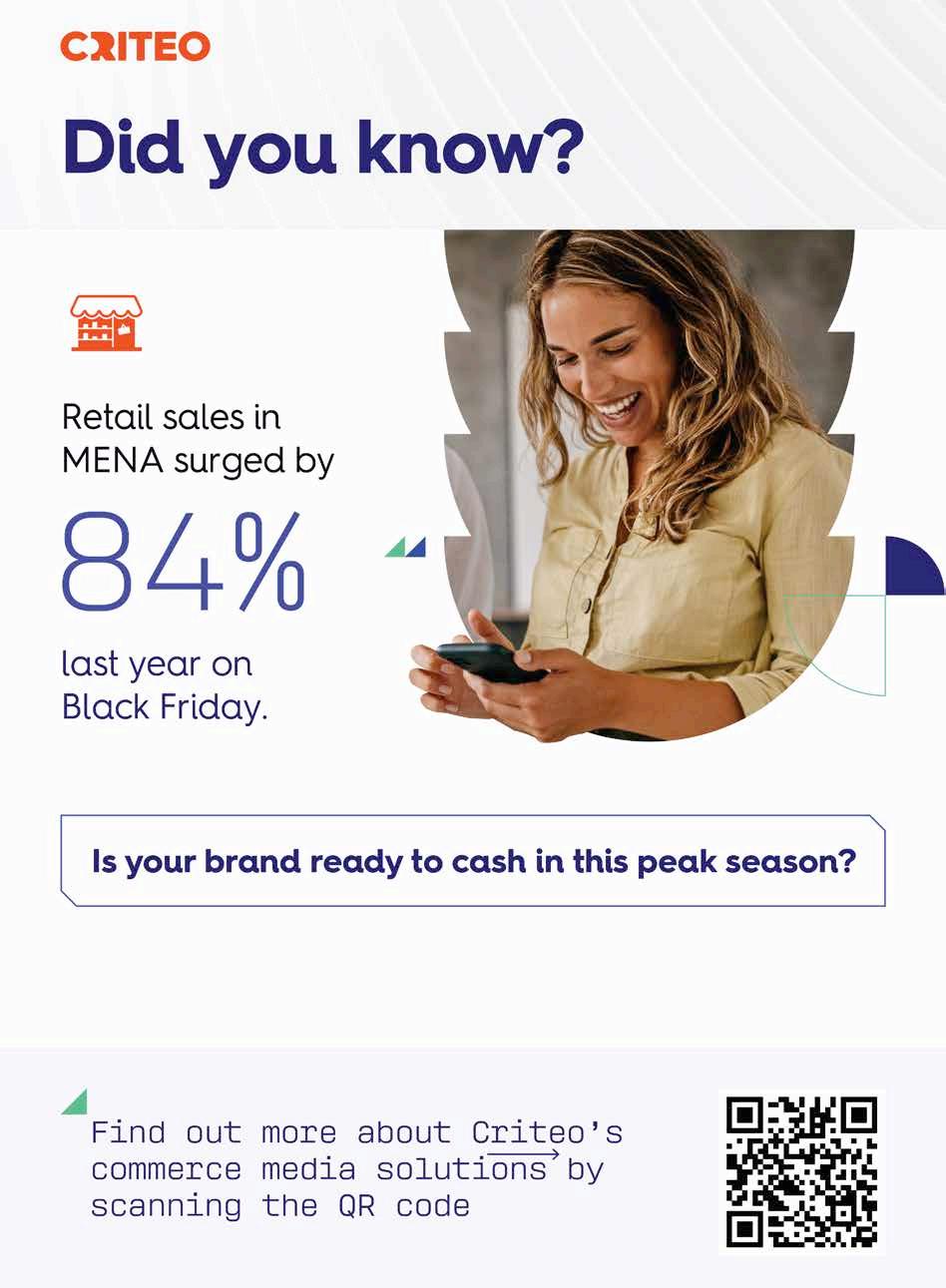
The last few years have fundamentally changed how individuals interact with brands.
Globally, industries have been affected by multiple factors, such as the Russia-Ukraine conflict and Covid-19, to name two.
How can a brand weather the effects of these increasingly difficult times and stay ahead of the game? Digital evolution, like e-commerce, and customer experience, must be at the heart of everything.
However, in today’s rapidly evolving world, standing out can be tricky. With technology advancing rapidly and consumer preferences constantly shifting, new trends are reshaping how brands engage with their audiences and deliver value.
From the rise of personalised, AI-driven experiences to the continued emphasis
on omnichannel approaches, these trends are defining the industry’s trajectory. These new, exciting developments offer a glimpse into the future.
At its core, e-commerce is moving towards maturity through data, technology and AI.
DATA-DRIVEN APPROACHES: AUGMENTING YOUR CRM
Gone are the days of solely relying on your customer relationship management (CRM) platform. To truly capitalise on emerging technologies like AI, automation and personalisation, consolidating your data into a customer data platform (CDP) is key.
This central hub unites offline and online data, giving you a single, true, integrated view. A CDP enables data-
KFC MENA’s Sony Nagpal talks about redefining the consumer experience and adapting to customer expectations in a digital-first world.


‘‘TO CAPITALISE ON EMERGING TECHNOLOGIES, CONSOLIDATING DATA INTO A CDP IS KEY.’’
Its impact is profound, from AI-powered robots in manufacturing to improved customer service with AI-enabled chatbots.
In the marketing world, personalised marketing and shopping experiences are getting powered by AI to a greater extent. This encompasses everything from custom content (e.g. tailored product recommendations and adaptive website layouts) and AI chatbots to targeted advertising and dynamic pricing.
This personalisation goes beyond just addressing your customers by their names and involves creating a unique experience for each of them – the products they are shown, the content they consume and the offers they receive. The options are limitless as AI helps brands better understand consumer behaviour to deliver targeted messaging.
Customers yearn for a seamless, unified experience that ensures all touchpoints – physical stores, websites, apps and social media – work cohesively. Creating a true omnichannel experience should be a top priority for every brand, as it is proven to enhance customer loyalty and boost sales.
Driven by our commitment to putting customers at the heart of everything we do, in the first quarter of 2023, KFC introduced a truly omnichannel experience by allowing customers to click and collect meals from offline, dine-in, and takeaway channels, effectively bypassing queues. This innovation has considerably improved operational efficiencies and driven incremental growth.
We continue to put our customers first and engage with them at every step of the purchase cycle. As the boundaries between offline and online shopping continue to blur, embracing an omnichannel strategy is imperative to meet consumer needs and stay competitive.
driven decision-making across your business, not just your marketing team.
I’ve seen its value first-hand, as it has helped KFC become one of the first quick-service restaurant brands in the region to move from nascent to multimoment digital maturity.
Today, more advanced CDPs are even using machine learning and AI to help anticipate consumer behaviour and reach the right audience with the right message at the right time.
PERSONALISATION AND AI: THE FUTURE OF CUSTOMER ENGAGEMENT
Artificial intelligence (AI) is transforming industries worldwide and opening them up to new possibilities.
These trends encapsulate the everchanging e-commerce and marketing landscape, as technology and changing consumer behaviours have led to further innovations. Through data-driven marketing, personalised and AI-driven experiences and omnichannel approaches, brands have a real opportunity. This list is not, however, exhaustive.
For instance, there are promising developments in voice commerce, a space with huge growth potential as consumer adoption increases. Overall, the opportunities in digital and e-commerce are endless. I encourage brands to work with their teams or agency partners and be bold and confident to test, fail and innovate.
By Sony Nagpal, Senior Director of E-commerce, KFC MENA







self-worth, while tech companies emphasise innovation and lifestyle. This emotional data tells us not only what consumers are buying, but also why – and what they might want next.
DATA AND THE NEW CUSTOMER SEGMENTATION: ONE SIZE NO LONGER FITS ALL


Traditional marketing relied heavily on broad demographic segmentation – age, gender, location, and income. While these segments still play a role, they are no longer sufficient in a world where different demographics often converge under one shared belief or interest.
Consider a fitness app targeting health enthusiasts; its audience could range from teenagers discovering wellness to retirees seeking an active lifestyle. They may differ in age, but they unite under a common goal: staying healthy.

IFZA’s Adam Taylor talks about balancing data-driven strategies with empathy, intuition and creativity.


Marketing today is all about precision. And at the heart of this precision lies data – vast amounts of it. Every click, swipe, and purchase generates insights that redefine how brands connect with their audiences. But, as we dive deeper into this data-driven world, it’s essential to ask: Where does all this data come from, and how far can we go in using it to shape the modern consumer landscape?





On the opposite end, some brands face a more fragmented reality. We have customers divided across distinct demographics, each with unique needs and expectations. Marketing can’t afford to be one-dimensional; it must go deeper, peeling back the layers of what truly motivates each customer segment.
This is where data shines. It allows brands to micro-segment audiences not just by who they are but by how they behave and what they value. For instance, Spotify doesn’t just recommend songs based on genre but tailors playlists to your mood, time of day, or even your past listening habits. It’s a reminder that marketing today isn’t just about selling a product or service; it’s about tapping into the feelings, experiences, and identities of consumers.


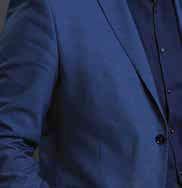




Modern data-driven marketing acts like a GPS for brands, guiding strategies and decisions. Without it, campaigns risk wasting precious resources. Every day, consumers leave a digital trail – from social media activity to online shopping habits and browsing history. These digital breadcrumbs fuel advanced AI systems, making personalised marketing more effective than ever.

Data sources are as diverse as they are abundant. Every day, consumers generate billions of data points, leaving a digital footprint through social media activity, online shopping behaviour, and browsing and location history – which all feed into advanced AI systems. While traditional sources like surveys and feedback still matter, the real gamechanger is the data collected through interactions.

At the heart of marketing transformation is hyper-personalisation. No longer confined to generic segments or broad demographics, brands now tap into real-time data to craft experiences that resonate on a deeply individual level. We’re not just talking about addressing a customer by their first name in an email; it’s about creating dynamic content that adjusts to a consumer’s behaviour – whether it’s through personalised product recommendations or tailored advertisements that feel more like conversations than sales pitches.


In the business-to-business world, this is like the friendly shop that remembers your usual order, but digitally scaled. A great example of hyper personalisation is the change in marketing strategies during the pandemic. Luxury brands had to rethink the traditional approach, such as in-store engagement, and adjust their messaging and product offerings to cater to the changing needs of consumers, to help them stay competitive.
Locally, Invygo, a UAE car subscription service, personalises its offers based on the user’s location, driving preferences and history. Similarly, ‘The Luxury Closet’ leverages hyper-personalisation strategies to send highly tailored emails with price drops to recommend products based on browsing history, boosting engagement and sales.


Emotion is a key element driving purchasing decisions, shaping marketing strategies and campaign design. Successful marketing evokes strong feelings, leading customers to form lasting connections with brands.
Rather than just selling products, brands sell emotions – luxury brands link their products to


POWER OF AI AND PREDICTIVE ANALYTICS
Hyper-personalisation hinges on smart data collection and analysis. By tapping into customer behaviour and past interactions, businesses can uncover individual preferences, and AI and machine learning help bring these insights to life at scale.
Today, about 92 per cent of companies use AI-driven personalisation to boost growth

‘‘IT’S NOT JUST ABOUT EFFICIENCY – IT’S ALSO ABOUT MEETING EXPECTATIONS FOR SPEED AND CONVENIENCE.’’
and refine the understanding of their customers, adjusting content and recommendations in real time. Predictive analytics takes this a step further, allowing brands to anticipate what consumers want before they even know it themselves. It’s not just about efficiency – it’s also about meeting customer expectations for speed and convenience.




In the past, brands dictated what the customer needed. Today, marketers need to fine-tune every aspect of the marketing funnel to resonate with their audiences. In a world where data can tell us almost everything, the real challenge lies in maintaining the human touch.
Data-driven strategies are powerful, but they must be balanced with empathy, intuition, and creativity. As we leverage data analytics to shape the future of marketing, the brands that will stand out are those that understand that marketing isn’t just about numbers and algorithms, and instead focus on creating connections that feel personal and authentic. With the boundaries between digital and human experience merging, one thing is clear: in the end, it’s not the data that defines us – it’s how we choose to use it.
By Adam Taylor, Director of Marketing, IFZA













In the era of artificial intelligence (AI), data has emerged as the most valuable currency for marketers. Machine learning (ML) and generative AI (GenAI) have the potential to revolutionise marketing practices, but their effectiveness depends on the quality and accessibility of data. The more comprehensive and accurate the data, the better AI systems can provide insights, recommendations, and informed decision-making.
However, a significant challenge arises from the fragmented nature of data across numerous marketing management tools. This fragmentation leads to data silos, each with its own unique schema. When siloed data is fed into ML models for AI-guided marketing, it can often result in biases and inaccuracies. These biases can hinder marketers’ ability to act on data effectively, leading to missed opportunities and lost sales. While siloed data might be helpful for some tasks, it creates a blind spot when viewed holistically.





Traditionally, marketing teams have relied on isolated pockets of data stored in separate systems. Disconnected customer data poses significant challenges for marketers, particularly in creating accurate consumer profiles. When a customer interacts with a brand through multiple channels (e.g., website, social media, in-store), fragmented data hinders a comprehensive understanding of their preferences and needs.
This lack of a unified customer view makes it difficult to personalise marketing messages and offers effectively, potentially leading to customer disengagement and decreased loyalty. Marketers may struggle to analyse customer segments and identify trends due to limited understanding of target demographics. Additionally, inaccurate consumer profiles hinder the ability to tailor marketing efforts effectively.


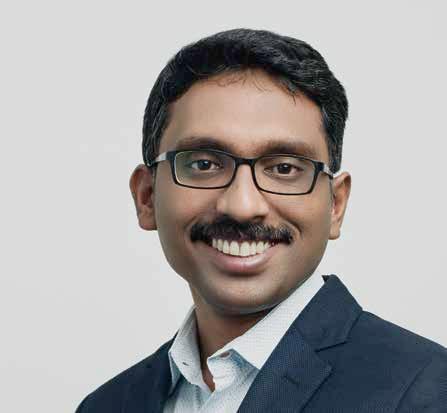



environment. Without them, businesses are flying blind and risk making decisions that could negatively affect profitability. A fragmented approach to data management extends beyond marketing. It creates inefficiencies throughout the entire business.


The causes of data fragmentation often lie in the use of disparate systems that don’t effectively communicate with each other. For example, a company may have separate databases for email marketing, social media, and CRM. This siloed approach makes it difficult to consolidate customer data into a single view.

The ability to analyse data across various marketing channels provides a comprehensive view of the customer journey, offering valuable insights for improvement. For example, by analysing data from supply chain management, CRM, social media, inventory, website traffic, and sales, marketers can gain a deeper understanding of how these factors interact and affect overall business performance. Simultaneously, a unified view of marketing campaign performance across different channels empowers businesses to measure ROI and identify areas for improvement.



Zoho’s Hyther Nizam explains why marketing needs a broader view.

The solution lies in breaking down data silos with unified platforms. This can encourage businesses to adopt a first-party data strategy. By leveraging their own customer data, brands can gain a deeper understanding of their audience. By collecting and analysing this data, they can tailor marketing efforts for a more personalised and effective customer experience.


Every aspect of the business can have a ripple effect on the others, and marketers might not understand the change in patterns unless viewed in a larger context. For instance, delays in the supply chain can lead to longer delivery times, which can negatively impact customer experience.
This, in turn, can affect social media sentiment, as dissatisfied customers may express their frustration online. By analysing, for instance, negative ratings online alone, marketers might not read much into the problem. However, when viewed alongside sales or inventory data, marketers can identify patterns and correlations between supply chain issues and customer behaviour.




‘‘BUSINESSES REMAIN TRAPPED IN OUTDATED MARKETING STRUCTURES, HINDERED BY DATA SILOS AND FRAGMENTED TEAMS.’’


Similarly, AI chatbots can serve as a valuable tool for gathering insights into customer inquiries and interests. When integrated with other marketing management tools, AI can analyse interactions and identify common questions, pain points, and emerging trends. This can then be used to refine marketing strategies, tailor offerings, and improve overall customer satisfaction.
Real-time data and insights are crucial for success in today’s competitive


First-party data offers several advantages. It’s often more accurate and complete than third-party data, ensuring a reliable information source. Customers have also explicitly consented to its use, ensuring privacy compliance. Since it’s directly relevant to customers and their interactions, first-party data is highly valuable for personalisation.



Data-driven marketing is the future, and those who fail to adapt are falling behind. Companies that leverage technology and analytics are consistently outperforming their competitors. However, many businesses remain trapped in outdated marketing structures, hindered by data silos and fragmented teams. As the volume and complexity of data continue to increase, the importance of unified data will only grow.
By Hyther Nizam, President Middle East and Africa (MEA) and VP of Products, Zoho




As we approach 2025, it’s undeniable that the e-commerce landscape has been reshaped entirely. The Covid-19 pandemic didn’t just push brands online – it redefined the entire shopping experience.
The most successful brands today understand that the traditional, linear shopping journey is dead. Gone are the days when a customer casually browsed a store, selected a product, and made a purchase in a straightforward transaction.



‘‘GET THE TECH STACK RIGHT, AND YOU’LL HAVE THE TOOLS TO TRANSFORM, ADAPT, AND GROW.’’

Now, the consumer journey is a web of touchpoints, both online and offline, that require businesses to be agile, responsive, and – most importantly – intelligent about how they use data. Brands must now go beyond surface-level data if they want to succeed. It’s no longer enough to just know who your customer is; you need to know what they want even before they do. Brands that invest in real-time data analysis powered by AI are the ones that will not only survive but thrive in this fast-paced environment.


Whether it’s personalised product recommendations or real-time inventory adjustments based on local demand, using data to tailor the shopping experience is no longer a luxury – it’s a necessity.
Think about it: 56 per cent of consumers expect personalised offers. That’s more than half of your potential customer base who might pass on your product if you don’t speak directly to their individual preferences. The key is identity resolution – understanding who your customers are, even when they’re just anonymous browsers. The days of one-size-fits-all marketing are long gone. Today, it’s about creating a connection, making the consumer feel seen and heard through personalised experiences.






customers to visualise how furniture will look in their homes before buying. It’s not just a clever gimmick – it’s an intelligent use of data to enhance the customer experience. This technology doesn’t just help make a sale; it opens the door for upselling complementary items, further enhancing brand loyalty.
Nike and Sephora are also shining examples of how to blend online and offline experiences seamlessly. Nike’s app-driven strategy creates a sense of community, making customers feel part of a lifestyle rather than just purchasers of a product. This sense of belonging


Data infrastructure plays a huge role in this. It’s easy to throw buzzwords like ‘AI’ and ‘personalisation’ around, but none of it matters if a brand’s data isn’t properly managed and utilised. Investing in the right technology – whether it’s data lakes or consumer data warehouses – ensures brands can integrate and analyse data across multiple platforms while keeping privacy concerns in check. It’s the backbone of a seamless, personalised shopping experience.





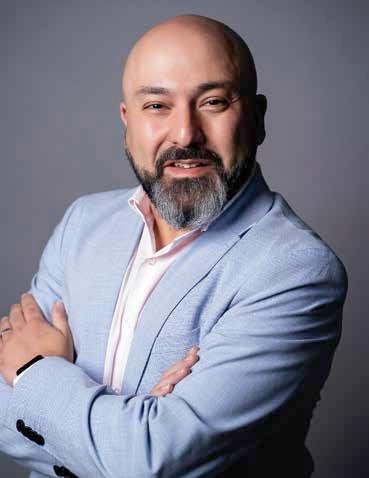



Merkle MENA’s Sameer Poonja points to the building blocks of any successful digital transformation.


drives engagement, while user-generated content keeps customers returning to the brand. Similarly, Sephora’s virtual try-ons and personalised app content bridge the gap between digital and physical shopping, creating a smooth, engaging experience that encourages conversions.

And then there’s the power of AI and analytics. As the saying goes, ‘what gets measured, gets managed’ and it couldn’t be more relevant in the e-commerce space. With predictive modelling and customer segmentation, brands can anticipate consumer needs and fine-tune their strategies. This not only makes for more effective marketing but creates a better overall shopping experience.
Take IKEA as a prime example. By using augmented reality (AR), it allows

But it’s not just about the shiny, customerfacing side of e-commerce. Behind the scenes, experience orchestration is vital. Brands need to streamline their operations so that all aspects – loyalty programmes, audience management, marketing tools –work in harmony to deliver a consistent, personalised experience across all touchpoints.


business will be outpaced by competitors who can pivot at a moment’s notice in response to shifting market trends.
Ultimately, a strong tech stack is the foundation – the very building blocks – of any successful digital transformation. It enables brands to not only meet consumer expectations but to exceed them through seamless personalisation, data-driven insights, and agile responses to market shifts.

In a world where change is the only constant, agility is critical. As Merkle’s latest Tech Stack report rightly highlights, organisations must build core capabilities that allow for scalability and flexibility. Brands that are stuck in old models of doing



Just as a building relies on its structural integrity, your business’s ability to thrive in the e-commerce world depends on how well these foundational elements are put together. Get the tech stack right, and you’ll have the tools to continuously transform, adapt, and grow in an ever-evolving digital landscape.
By Sameer Poonja, Managing Director –Experience and Platforms, Merkle







Cars24 Arabia’s Utkarsh Verma says brands must embrace opportunities within the evolving adtech landscape.

In today’s fast-paced marketing landscape, where digital transformation is reshaping industries at an unprecedented rate, the question of how to optimise brand spending for maximum performance has never been more critical.
ability to launch and scale campaigns, even for smaller teams.
The integration of artificial intelligence (AI) and machine learning (ML) into ad-tech has been a game-changer. These technologies allow for real-time optimisation of campaigns, ensuring that ad spend is directed toward the most effective channels. By analysing data continuously, businesses can adjust their strategies on the fly, maximising the impact of their marketing budgets.

As businesses in the Gulf region and beyond navigate this complex ecosystem, the need for a strategic balance between creativity and data-driven precision is paramount.
Today, data is at the core of every successful marketing strategy. The ad-tech revolution has transformed demand generation, enabling marketers to harness vast amounts of data to make informed decisions. This shift towards data-driven strategies has enhanced marketing efforts and democratised the





This level of agility was unimaginable a few years ago but is now a critical component of success in the modern marketing landscape.
The evolution of ad-tech has fundamentally altered how brands approach marketing. No longer can branding efforts thrive without the integration of technology and data. These tools provide essential insights into both the inputs and outputs of marketing campaigns, enabling brands to measure effectiveness with greater accuracy and at previously unprecedented speed.



When brands focus on optimising their inputs – whether through data-driven ATL campaigns, precise targeting, or real-time adjustments – the outputs naturally improve. Key performance indicators such as click-through rates, brand impressions, and ad responsiveness are directly influenced by the quality of the inputs.
Furthermore, enhanced customer relationship management (CRM) activities can also be traced back to well-executed inputs. The importance of systematic observation and analysis of these outputs cannot be overstated. Brands must adopt a scientific approach to measure the effectiveness of their campaigns. This not only involves tracking performance metrics, but also drawing actionable conclusions that can inform future strategies. In this way, every campaign becomes an opportunity to learn and improve, driving long-term success.



‘‘THE FUTURE OF BRAND SPEND LIES IN THE CONTINUED INTEGRATION OF TECHNOLOGY AND DATA INTO EVERY ASPECT OF MARKETING.’’

For example, above-the-line (ATL) campaigns, such as radio and out-ofhome (OOH) advertising, remain crucial inputs in a brand’s marketing mix.

The marketing industry is witnessing a growing shift towards optimising creative channels through scientific methods. While creativity remains at the heart of branding, it is increasingly being informed and enhanced by data. This trend is particularly relevant in the Gulf region, where brands are looking to stand out in a crowded marketplace while ensuring their marketing spend delivers tangible results.
The future of brand spend lies in the continued integration of technology and data into every aspect of marketing. As AI and ML technologies evolve, they will provide even deeper insights into consumer behaviour, allowing brands to craft more personalised – essential for the multinational culture mix of Gulf state populations – and effective campaigns. At the same time, the importance of creativity cannot be diminished; it is the unique ideas and innovative approaches that ultimately capture consumer attention and drive brand loyalty.


However, the effectiveness of these campaigns can now be predicted and enhanced through careful analysis. By using data to determine the optimal timing and execution of ATL campaigns, brands can ensure that these traditional channels contribute meaningfully to their overall marketing objectives.
Moreover, ad-tech has empowered brands to move beyond traditional methods of campaign optimisation. Hypothesis-driven testing, a staple of the scientific method, is increasingly being applied to creative channels. This approach allows brands to continuously refine their campaigns, testing different creative elements to see which resonate most with their target audiences. By backing creativity with data, brands can strike the right balance between innovation and effectiveness.



Brands that can marry creativity with scientific precision will be the ones that not only survive but thrive in the dynamic ad-tech ecosystem. By focusing on optimising inputs and systematically analysing outputs, businesses can ensure that their brand spending is not just effective, but transformative.
As the adtech landscape continues to evolve, brands must embrace the opportunities it presents. By leveraging data and technology to inform their strategies, while also maintaining a commitment to creativity, they can optimise their spending for maximum performance.


The Gulf region, with its unique market and multinational consumer dynamics, highly competitive landscape and leadership in technology adoption, will be a ‘paradigm platform’ for this new era of marketing innovation.
By Utkarsh Verma, Head of Marketing, Cars24 Arabia – Gulf Region

Hypermedia CEO Philip Ma a discusses AI, smart targeting, data measurement, holographic ads, and the role of sustainability within the ongoing outdoor media revolution.
The days of static billboards and generic messaging are a thing of the past. At Hypermedia, we are not merely adapting to this change; we are at the forefront, reshaping the industry with a bold vision for AI-driven, smart and data-powered solutions. As the largest digital out-of-home (DOOH) media network in the UAE, we have embraced the challenge of transforming traditional advertising into interactive, real-time experiences that resonate with today’s audiences.
Our journey, in collaboration with DXTA Technology, is a revolutionary shift, not just a technological upgrade. From digitising more than 3,000 static signages across the UAE to integrating AI-powered technology into our digital screens, we are setting a new standard for what OOH advertising can achieve.
By combining data, AI, and smart infrastructure, we are creating a more relevant, targeted, and engaging platform for brands – pushing the boundaries of advertising as we know it. This is more than an evolution; it’s the future of OOH, realised today.
At Hypermedia, we are not just talking about digital screens, we are talking about intelligent screens. Through a partnership with DXTA Technology, we have integrated AI-powered sensors into nearly 850 of our digital screens, creating a network of smart signage that tailors ads based on real-time demographics and audience data.
This is a game changer for the industry. It allows advertisers to engage with their target audiences more effectively, serving ads only to those who fit specific demographics, and ensuring 100 per cent transparency with a new mode of buying: Cost Per Qualified View (CPQV).
This is a major leap forward in accountability and efficiency for our clients. It is not just about showing an ad anymore; it is about showing the right ad to the right person at the right time. For brands, it means every advertising dollar is working harder, with real-time data backing up campaign performance. This precision targeting was once the domain of online advertising, but now it is here in the physical world, thanks to AI and the power of data.

The digital transformation of OOH goes beyond smart screens. At Hypermedia, we are also pioneering immersive 3D experiences through our exclusive partnership with HYPERVSN. By shifting from 2D to 3D holograms, we are not only enhancing the visual impact of advertising but also tapping into how consumers naturally perceive the world.
These holographic ads appear to float in mid-air, creating a level of engagement and memory recall far beyond traditional formats. We are aligning our digital experiences with human sensory understanding, which makes this innovation not just a technological leap but a more effective way to connect brands with audiences.
A
In our mission to transform the OOH experience, we are also innovating the way advertisers access media spaces. Later this year, we will launch ‘pinned’, a platform that digitises the entire booking process for our promo spaces in malls.
This platform connects retailers, suppliers, and customers through a seamless digital interface.
Brands and agencies will be able to book their media spaces online with full transparency – streamlining everything from cost comparisons to booking and payment.




Our AI-powered audience targeting technology and data management platform (DMP) takes the guesswork out of OOH advertising. We are collecting, processing, and analysing audience data in real time, allowing advertisers to not only see who is engaging with their ads but also adjust campaigns on the fly to optimise performance and relevant reach. This is more than just technology – it is the future of how we measure and enhance audience engagement in real-time, bridging the gap between online and in-door advertising. What we are offering is a fully transparent, real-time responsive system where advertisers can target every interaction, down to the demographic level. It is this kind of measurable accountability that gives brands the confidence to invest heavily in DOOH. And it is why we are seeing rapid growth in both digital and AI-powered DOOH solutions.






Sustainability has become a central pillar of Hypermedia’s operations.
We’re integrating eco-friendly practices across our business, starting from the materials we use to our internal office policies.

Our digital screen network, the largest in the UAE, is equipped with energy-saving LED technology, drastically reducing our environmental footprint. Additionally, we’ve adopted the use of fabric polypropylene (PP), a versatile, PVC-free material that is approved by SGS, making it a promising material for sustainable advertising solutions.











The brand and marketing industry in the Middle East is experiencing a seismic shift, driven by the dual forces of e-commerce growth and digital transformation.
With a rapidly growing young population, increasing internet penetration, and a tech-savvy consumer base, the region is primed for a digital revolution.


But amid this surge of opportunity lies a critical challenge: how can brands deliver highly personalised experiences while respecting privacy in a region with unique cultural sensitivities and evolving regulatory landscapes?
The Middle East’s e-commerce market has witnessed exponential growth in recent years, with the sector expected to reach $49bn by 2025. This boom, accelerated by the Covid-19 pandemic, has led countries like the UAE and Saudi Arabia to the forefront of digital transformation, with consumers increasingly relying on online shopping and digital experiences.




Chalhoub Group’s Marilena Hadgianni emphasises the need to prioritise trust, embrace transparency, and respect cultural sensitivities.

‘‘DELIVER PERSONALISED EXPERIENCES AND SAFEGUARD PRIVACY IN A WAY THAT IS CULTURALLY APPROPRIATE.”


personalisation can bring to the consumer. Being transparent, consistent and honest can set a brand apart from its competitors.
Moreover, younger consumers in the region are increasingly focused on sustainability. They are not only concerned with what they buy but also with how the content they consume is produced. This demographic expects brands to demonstrate responsible practices, from how they handle personal data to how they approach content creation.


Personalisation has emerged as a key driver of success in this space, where consumers expect tailored experiences that cater to their unique preferences and needs. Whether it’s personalised product recommendations, localised content, or targeted advertising, brands that can deliver relevant and meaningful interactions are more likely to capture and retain consumer loyalty.
But at what cost? And what does this mean for the future of brand identity in a region where trust is paramount?
This is not just a rhetorical question but a critical issue that brands must address as they navigate this rapidly changing landscape.


THE PRIVACY CHALLENGE IN A CULTURALLY DIVERSE REGION
The pursuit of personalisation in the Middle East, however, is not without its challenges.
The region is characterised by a diverse cultural landscape, where privacy is not just a regulatory concern but also a deeply ingrained cultural value. In many Middle
Eastern societies, privacy is closely linked to concepts of family honour and personal dignity, making it infinitely more complex to navigate. Moreover, the regulatory environment around data privacy is still evolving. While countries like the UAE have introduced data protection laws, such as the UAE Personal Data Protection Law (PDPL), the region lacks the uniformity seen in places like Europe with the General Data Protection Regulation (GDPR). This creates a complex environment for brands operating across multiple Middle Eastern markets, where they must navigate differing regulations while also respecting cultural norms. Cultural sensitivity is not a one-size-fits-all approach in the Middle East. What works in the UAE might not resonate in Saudi Arabia or Egypt. Brands must invest in understanding these nuances to tailor their strategies effectively.

with its decentralised and secure nature, offers a way to give consumers more control over their data while ensuring that it is used responsibly. Brands that adopt such technologies can differentiate themselves as leaders in privacy and security.

Apps like Whering and Conbyne, which promote sustainable fashion choices through virtual wardrobe management, reflect this shift in consumer expectations. Brands that align with these values are more likely to build lasting connections with this critical audience.
Additionally, brands should embrace the concept of ‘privacy by design’. This involves integrating data protection measures into the development of products and services from the outset, rather than as an afterthought. Demonstrating commitment to protecting personal data can be a powerful way to build trust.


Emerging technologies such as blockchain could play a significant role in enhancing transparency and trust in the Middle East’s digital economy. Blockchain technology,
Furthermore, the ethical use of AI and machine learning is crucial in this context. As these technologies become more integral to personalisation efforts, brands must ensure they are used in ways that respect privacy and avoid biases. In a culturally diverse region like the Middle East, where societal norms and expectations can vary significantly, it is essential that AI systems are designed and trained with these considerations in mind.


The Middle East’s digital transformation is set to continue at a rapid pace, with e-commerce playing a central role in the region’s economic growth. However, as brands race to capitalise on this opportunity, they must also address the challenges that come with it, particularly the need to balance personalisation with privacy and sustainability.

A one-size-fits-all approach could lead to missteps that not only alienate consumers but also damage the brand’s reputation in this complex and diverse market.


To successfully navigate this challenge, brands in the Middle East must prioritise building and maintaining consumer trust. This begins with transparency – brands must be clear about what data they collect and how it is used, and clearly demonstrate the benefits that



By prioritising trust, embracing transparency, and respecting cultural sensitivities, brands can successfully navigate this complex landscape. The future of brand marketing in the Middle East will be defined by those who can strike the right balance –delivering personalised experiences that resonate with consumers while safeguarding their privacy in a way that is culturally appropriate and ethically sound.
In a region where trust is the cornerstone of business relationships, brands that can build and maintain this trust will be best positioned to lead the industry forward, setting new standards for marketing in the digital age. Now is the time for brands to take a proactive approach – because in this rapidly evolving region, those who fail to adapt may be left behind.


By Marilena Hadgianni, Director of Brand Marketing, Chalhoub Group

DBy Prasad Sawant, Head of Performance, Boopin
igital transformation means different things to different industries and departments. However, in simpler terms, it refers to the process of digitising business operations across departments such as finance, HR, and marketing to increase efficiency, make informed decisions, and deliver value to the organisation.
In the context of marketing, heads of marketing constantly face questions such as: “How do we measure the ROI of our campaigns?” or “How can we better understand our customers and create campaigns that truly resonate?” This highlights the importance of digitalising the entire marketing process, which not only addresses these questions but also helps drive ROI and improve overall efficiency in marketing operations.
Organisations that have not integrated digitalisation often struggle with the ‘data deluge’ crisis. Yes, that’s another piece of jargon that we need to unravel to understand the importance of digital transformation.
According to Hewlett Packard Enterprise, data deluge occurs when data is generated faster than it can be managed, analysed, and used effectively for decision-making.
Many organisations lack the infrastructure to manage their first-party data efficiently, which limits their ability to measure campaign ROI, perform effective customer segmentation, optimise content strategy, and nurture customer loyalty.
ADDRESSING THE DATA DELUGE
At its core, the role of digital transformation in marketing is to solve the data deluge crises. The first step is building the right infrastructure, integrating multiple digital tools to unify all data signals.
This allows organisations to map the entire customer journey. Once data is unified, sophisticated tools and machine learning algorithms can transform raw data into actionable insights. These include customer segmentation, predictive modeling, multi-touch attribution, customer lifetime value analysis, marketing mix modeling, and more.
This enables CMOs and marketing heads to budget their campaigns efficiently and accurately assess ROI. For performance marketers, this data-driven transformation refines targeting strategies, messaging, and communication, ultimately driving cost-efficient results.
Let’s understand the key areas of impact in marketing through digital transformation:

Personalised customer experience: Today’s consumers expect brands to understand their needs and preferences. Through advanced data analytics, AI, and machine learning, businesses can segment audiences more precisely and create personalised marketing campaigns. Leveraging data from websites, social media, and apps enables businesses to deliver a seamless, personalised customer journey across channels. This not only boosts customer satisfaction but also improves conversion rates and loyalty, driving long-term growth.



Boopin’s Prasad Sawant delves into the key areas of marketing impacted by digital transformation done right.
behavior and campaign performance. When these platform-level optimisation deeper
Data-driven decision making: Data is critical for performance marketers to make optimisation decisions that drive ROI. Platforms like Google Ads, Meta, TikTok, and programmatic advertising provide data signals in real-time, offering insights into user behavior and campaign performance. When these platform-level signals are combined with analytics tools like GA4 and big data, marketers can dive deeper into customer insights, enabling better budget allocation, precise audience targeting, and enhanced campaign efficiency.
Automation for efficiency: Automation doesn’t mean campaigns run on autopilot. it’s about speeding up execution, ensuring regular campaign hygiene checks, and generating real-time reports with actionable insights. Automated systems like Meta’s ad campaigns or Google Ads’ bidding systems use machine learning to predict which ads are most likely to convert, optimising campaign delivery. This not only saves time but also scales marketing efforts efficiently, reducing human error and improving ROI.



Omnichannel marketing integration: Customers interact with brands through multiple platforms like social media, websites, apps, and even offline channels. To ensure a consistent brand experience, businesses need to align their messaging across these touchpoints. Digital transformation helps break down data silos, connecting various platforms to create a unified view of the customer journey. This integration ensures a seamless customer experience, leading to higher engagement and stronger brand loyalty.
Enhanced agility and innovation: With new platforms, tools, and consumer behaviors emerging rapidly, businesses must stay agile to remain competitive. Digital transformation allows companies to adopt innovative technologies and remain flexible in their marketing approaches. Trends like voice search, AI-driven chatbots are changing the way businesses engage with consumers. Embracing these technologies enables companies to reach new audiences, create engaging experiences, and stay ahead in a highly competitive market.



Improved customer retention and loyalty: Customer retention is as crucial as customer acquisition. Through digital transformation, businesses can enhance retention strategies by using data to predict behavior and understand customer needs. For example, CRM systems integrated with marketing platforms allow businesses to manage customer relationships more effectively by enabling lead scoring & visitor scoring models. When businesses have a understanding of customer preferences and pain points, retaining loyal customers becomes easier.
“Many organisations lack the infrastructure to manage their first-party data efficiently.”
To conclude digital transformation helps businesses with the necessary infrastructure to improve efficiency, enhance targeting, boost conversion rates, and nurture stronger customer loyalty. In today’s data-driven world, adopting digital tools and strategies is essential for marketing teams to stay competitive, agile, and effective in delivering value to their organisations.



Artificial intelligence (AI) and machine learning (ML) are transforming how brands operate – and most importantly – thrive. These technologies are driven by complex algorithms and are providing brands with unmatched insights into customer behaviour and preferences. AI and ML are helping companies stay one step ahead of the curve. Without a doubt, AI is an indispensable asset that’s reshaping the future of customer engagement.
DECODING


these points together to ensure a consistent personalised experience regardless of where the interaction takes place. Imagine walking into a store after browsing online, only to find that the in-store displays are personalised just for you, showcasing items that complement your recent searches. A great example is Noon.com, which uses AI to predict customer preferences based on browsing behaviour and previous purchases.



As exciting as AI and ML are, they also raise important questions about data privacy and ethical use. In a world where consumer trust is fragile, brands must prioritise transparency and comply with regional data protection laws.



Brands are currently getting closer to anticipating your next purchase. That’s the reality machine learning is delivering today. This happens when large amounts of data are being analysed – that is everything from online searches to in-store interactions. ML algorithms identify patterns and trends that human analysis could never catch. These insights help brands to offer personalised, real-time recommendations tailored to each customer’s unique preferences. Take Amazon, for instance. By leveraging ML, the e-commerce giant predicts what products you’ll be interested in, based on your browsing and purchase history. This hyperpersonalisation has led to a 15 per cent to 20 per cent increase in conversion rates, according to McKinsey. Imagine applying this kind of precision to retail, where trends are predicted not just by what’s happening today but by understanding the customer behaviours of tomorrow. Retailers who embrace this can see significant boosts in both customer satisfaction and sales.
THE ‘PHYGITAL’


Machine learning enables Noon to provide personalised product recommendations, which contributes to higher conversion rates and customer loyalty. This kind of personalised omnichannel experience is a game changer for brands looking to differentiate themselves in a crowded marketplace. AI is not just enhancing experiences – it’s revolutionising them.




Andreas Hassellof, CEO, Ombori explains how machine learning is revolutionising customer understanding.

What was previously only possible for e-commerce can now also be done in physical stores. The line between physical and digital shopping experiences has blurred. Brands gain insights from both interactions, such as browsing history and in-store displays. This provides a 360-degree view of customer behaviour.
Picture this: a customer walks into a store, and an in-store display instantly suggests products based on what they were browsing online last week. This level of personalisation feels intuitive, almost magical, but it’s powered by AI-driven insights. Retailers using this technology have reported sales increases and have seen an improvement in customer loyalty. This isn’t just tech for tech’s sake – it’s about creating seamless, personalised experiences that resonate with today’s consumers.




The future of retail lies in customers seamlessly transitioning between physical stores and online shopping without wasting time. These omnichannel experiences, powered by AI-driven insights, are the key to tying

In 2021, the UAE introduced its Federal Data Protection Law, which closely aligns with GDPR principles. It requires businesses to obtain explicit consent from individuals before collecting and processing their personal data to ensure transparency in data usage, and to secure that data. At the same time, fairness in AI is crucial. Algorithms must be designed to avoid biases that could alienate specific groups. Incorporating ethical frameworks into AI models ensures that customer data is handled responsibly while still delivering insights that drive growth. Brands that adopt AI responsibly will not only gain a competitive edge but also maintain the trust and loyalty of their customers.


As of 2023, 42 per cent of businesses in the UAE had already implemented AI in their operations. Moreover, 65 per cent of IT professionals reported accelerating their AI integration over the past two years, emphasising how AI is reshaping industries, particularly in enhancing customer interactions.





The proof is in the numbers: brands incorporating AI into their strategies are seeing massive returns. From operational efficiency to customer satisfaction, the business impact of AI-driven insights is transformative. Companies using AI to analyse customer data are reporting a 15 per cent to 20 per cent improvement in engagement and up to a 30 per cent boost in sales. The ability to make data-driven decisions quickly is a necessity in today’s fast-paced world.
AI’s potential in shaping the future of customer engagement is limitless. As brands continue to harness AI-driven insights, they’ll discover new ways to forge deeper connections with their customers. Those who creatively use AI to deliver personalised, transparent, and meaningful experiences will be the brands that thrive in tomorrow’s marketplace.




Now is the time for businesses to embrace AI, not just as a tool for efficiency but as a driver of innovation and growth. The future of customer experience lies in the seamless integration of digital and physical worlds, powered by AI. The companies that succeed will be those that blend cutting-edge technology with ethical responsibility, creating lasting relationships and staying ahead in the ever-evolving landscape of customer expectations. In the race for customer loyalty, AI isn’t just a competitive advantage – it’s the key to long-term success.


By Andreas Hassellof, CEO, Ombori

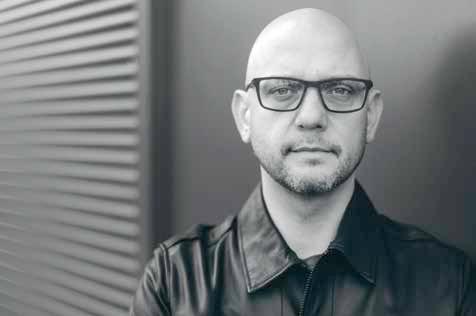
In today’s rapidly evolving digital world, staying ahead requires creativity, innovation and adapting to new technologies.
At our marketing agency, we constantly seek ways to help our clients enhance their brands, engage audiences, and boost marketing return on investment (ROI).
We’re excited to introduce AICO, our AI-generated image and video content service, designed to transform visual storytelling. AI is revolutionising industries, and the creative field is no exception. By using AI, we can produce high-quality, customised content faster, more efficiently, and often at a fraction of traditional costs. Here’s how our AI-generated content services can enhance your marketing strategy.
Cost-effective content creation
Producing professional images and videos has historically been costly, requiring expensive equipment and talent. AI-generated content streamlines the process, reducing costs by automating tasks like designing, editing, and animating. Whether you’re a small startup or a large corporation, AI enables access to high-quality content without needing a large budget. Our services make professional-grade content affordable for businesses of all sizes.
Faster turnaround times
In today’s fast-paced world, timing is critical. Traditional content creation can take days or weeks, but AI significantly speeds up production. With AI-powered tools, we can create and modify content in real time, delivering finished visuals or videos within hours. This rapid turnaround allows clients to quickly respond to trends, launch campaigns faster, and meet the ever-changing demands of the digital landscape.
Customisation at scale
AI offers unprecedented levels of personalisation, allowing us to create tailored content for specific audience segments at scale. Whether you need images or videos customised based on demographics, location, or behaviour, AI makes it possible without sacrificing quality. With our expertise in media and data analysis, we ensure your content resonates more effectively with your target market, driving engagement and boosting campaign performance.
Enhanced creativity and innovation
Contrary to misconceptions, AI doesn’t limit creativity – it expands it. AI frees up our creative team from routine tasks, allowing more time to focus on innovative strategies and bold campaigns. AI’s ability to explore new design styles and experiment with different video aesthetics adds a new dimension to our creative capabilities. From futuristic visuals to real-world simulations, AI empowers us to push the boundaries of visual marketing.
Data-driven optimisation
AI not only aids content creation but also enhances optimisation. By analysing vast amounts of data on user behaviour and preferences, AI informs design and content strategies.
This ensures that visuals and videos are not just aesthetically pleasing but also strategically crafted to drive actions like click-throughs and conversions. AI-generated content can be adjusted in real time, optimising campaigns for peak performance, and maximising ROI.
Consistency across channels
Maintaining brand consistency across multiple channels can be difficult, especially when working with different teams or agencies. AI-generated content ensures uniformity in style, tone, and messaging across platforms, including social media, email marketing, websites, and digital ads. This consistency strengthens brand identity and builds trust with your audience, resulting in more effective campaigns.
Sustainability and efficiency
As businesses seek ways to minimise their environmental impact, AI-generated content offers a sustainable solution. By reducing the need for on-site photo or video shoots, AI lowers resource consumption and travel-related emissions. Additionally, AI’s ability to automate repetitive tasks saves time and energy, creating a more eco-friendly and efficient production process.
Competitive edge with cutting-edge technology
Adopting AI-driven content gives your brand a competitive edge, positioning it as forward-thinking and tech-savvy. This appeals to younger, tech-conscious audiences. By partnering with us, you’ll gain access to the latest AI technology, allowing your brand to stand out in a crowded marketplace. AI-generated content is the future of marketing, and we’re committed to helping our clients stay ahead of the curve.
By incorporating AI into our services, we offer clients more creativity, engagement, and personalisation – all while reducing costs and increasing efficiency. Whether you want to scale content creation, reduce production expenses, or launch innovative campaigns, our AI-generated content services are the solution you need.
Reach out to us today to explore how AI can transform your brand’s visual storytelling and take your marketing efforts to new heights. We’re confident in our expertise and vision. Connect with us, share your content goals, and we’ll gladly provide you with a complimentary sample to showcase the possibilities of AI-powered content. To learn more, check out the Sputnik Floyd website at https://sputnikfloyd.com/blog/sputnik-floyd-unveilsaico-ai-content-creation/
By Patrick Honein, CEO, Sputnik Floyd



The MENA ecommerce landscape has matured rapidly, with Euromonitor reporting a staggering 25 per cent compound annual growth rate (CAGR) over the past five years. However, this growth is not without challenges.

One of the age-old issues in retail is the challenge of acquisition, and particularly the prevalence of discounting. Many brands on e-commerce now find that significant discounts – often exceeding 20 per cent and sometimes reaching 50 per cent – are necessary to achieve sales spikes.


Consumers approach digital platforms with a mindset of discovery, and understanding this mindset is paramount to e-commerce success.
The ‘Gruen Transfer’, named after an Austrian architect, describes how the glamour of the mall experience can alter mood, suppress rational decision-making and trigger impulse buying.


This in turn has led to troubling expectations among consumers that regular price reductions are the norm, with more than 65 per cent of millennial and Gen Z consumers willing to wait for the sales they know are coming.
This problem is compounded by the initial expectation of e-commerce to save on capex, while adding convenience to the consumer. Lower expenses historically translated to healthier profit margins; however, the race to grow market share has pushed brands to take these cost savings into their trade marketing spends and exhaust them via discounting and bundling.


In e-commerce, this same phenomenon is triggered through frictionless shopping experiences. In simpler terms, #tiktokmademebuyit. By pairing compelling creative with shorter purchase paths, we can significantly increase conversion rates.

The bad news is that a recent study of more than 650,000 businesses showed that ‘growth-first’ firms are more than twice as likely to perform poorly than ‘profit-first’ enterprises. To make matters worse, consistent focus on discounting erodes brand equity in two big ways.




It’s no surprise that a lot of new innovations in digital media lead us down this path – tools like Google’s Circle to Search help to facilitate discovery, while Amazon’s platform partnerships and Tiktok Shop facilitate faster purchases through social.
Continuing the retail analogy, it often seems like we have taken all the lessons from retail except how to deliver exceptional customer service.
E-commerce attracts a diverse range of shoppers with varying intentions, and reaching this diverse range of audiences in

Firstly, this takes away from brandbuilding budget, which is essential for both volume and reducing price elasticity, a phenomenon that Les Binet, Head of Effectiveness at Adam & Eve DDB has written about at length. Secondly, constant discounting has been shown to reduce ‘expected price’, or the price consumers believe a product to be worth. This perceived value can be incredibly challenging to rebuild. With that said, e-commerce has become a cornerstone of the global retail landscape. Its scale and reach are unparalleled. Innovations in e-commerce are a driving impact on multiple elements of our evolving culture and have directly driven the growth of some of the biggest brands in the world. E-commerce clearly cannot be ignored. But to live the dream of increased revenue, we must learn to step away from discounting and go back to basics.





media is crucial. From window shoppers to focused buyers, the virtual aisles are teeming with potential customers but the same cannot be said of our retail staff. How easy is it for customers to find detailed information about our product? Where do our customers go if they have unanswered questions? These are examples of the value that we gain by investing in improving product listings, website CX and chat or messaging functionality. In our bid to cut costs, it’s easy to forget the value that retail staff add to the customer experience. The digital consumer journey cannot stand in isolation and advertising cannot be a proxy for good, old-fashioned customer service. By addressing other pain points in the consumer journey, we can alleviate the need to discount to secure the sale and walk away with a more satisfied customer.

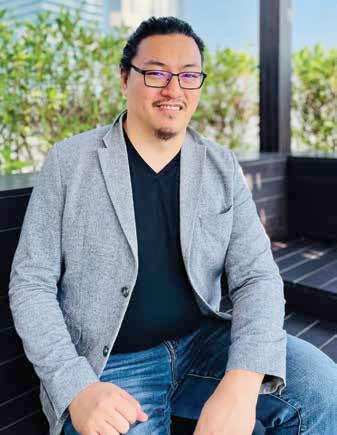


Last, but certainly not least, such consistent discounting erodes brand equity. If we look at Interbrand’s most valuable brands in the world, we see a clear trend – whether it be Apple (No. 1), Mercedes-Benz (No. 6) or Nike (No. 9), these are brands with intense emotional appeal.


From a practical advertising perspective, media plays a crucial role in building this equity. While search helps high-intent shoppers who have a good idea of what they want to buy, other channels like display help in brand discovery and building intent.
Correctly allocating budget between channels also means investment in campaigns that are completely disconnected from short term ROAS-led thinking and led by longer-term analytics and measurement solutions. By focusing at least some of our efforts on longer-term success, we can start to shift the needle slowly towards that dream of increased profitability and improved customer experience.



To sum up, the growth of e-commerce in the MENA region is a testament to its enduring potential. E-commerce has surged over the past five years, with an anticipated CAGR of 11.6 per cent through 2028. This sustained growth presents lucrative opportunities for businesses that stay attuned to evolving consumer trends and behaviours. By shifting our thinking to better customer experience and better branding, businesses can also start to realise the dream of scale and improved profitability.




By Terry Mo, Head of Digital, OMD UAE




Contour Media unveils its state-of-the art hoarding featuring a spectacular waterfall.
ontour Media has unveiled a new state-of-the-art billboard experience that integrates a cascading waterfall and a series of small fountains within its out-of-home billboard proposition, marking a pioneering addition to its portfolio of outdoor assets.


Breaking past the traditional visual-only barrier of a hoarding, this one-of-a-kind installation enhances the sensory experience by adding an auditory element to the creatively crafted visuals on the OOH billboard.
The natural sound of the flowing water permits for a more immersive and memorable experience, differentiating the ad proposition in an otherwise saturated advertising landscape. As a result, the innovative approach captures attention, boosts brand awareness and recall, and creates a lasting impact – aspects that most traditional media are struggling to achieve.
The hoardings are primarily placed along key roads, including Sheikh Zayed Road and Al Sa’ada Street, surrounding Dubai’s iconic financial district: the Dubai International Financial Centre (DIFC). They are placed near prominent landmarks such as the Gate Building, Emirates Towers, and within walking distance of the Dubai Mall. These high-traffic areas ensure maximum visibility to both pedestrians and drivers passing by.


In terms of viewership and daily effective circulation (DEC), which is a key measurement of the prime placement of a billboard, the DEC around DIFC is substantial, with thousands of vehicles and pedestrians passing through daily. Sheikh Zayed Road alone witnesses more than 300,000 vehicles daily. Pedestrian footfall in DIFC is equally significant, particularly due to its position as a business hub attracting professionals, tourists, and residents alike.
The addition of a harmonious blend of art, nature, and technology, with strategically placed waterfalls, make this hoarding stand out with a touch of serenity and elegance amidst the fast-paced environment of Dubai’s business hub.
The hoarding, therefore, caters perfectly to its target audience in the DIFC area, which includes high-net-worth individuals such as businessmen, entrepreneurs, financial professionals, and international visitors. The area is also home to various financial institutions, art galleries, and luxury retail outlets, drawing a diverse group of affluent consumers, investors, and high-end tourists.
In keeping with this high-end audience, this innovative hoarding has featured top global brands such as BMW, with high-end brands such as Cartier, Bentley, and global banks such as HSBC or Standard Chartered showing consistent interest in advertising to the premium audience frequenting DIFC. Brands that have advertised in the area typically come from industries like luxury retail, banking, finance, automotive, and real estate.
Contour Media has also ensured that the stand-out billboard aligns with the values and principles of high-end brands.
Sustainability has been incorporated into the advertising, as the water technology used for the hoarding incorporates water recycling and green energy integration, thus reducing water waste, which is crucial in arid regions like the UAE where water conservation is a priority. This further exemplifies Contour Media’s commitment to pushing the boundaries of urban design and innovation.



Contour Media has invited the DIFC community, visitors and art enthusiasts to take note, and comment on the new landmark and share their reactions to its unique ambience. Whether you’re a professional on your way to a meeting, a tourist discovering the city’s marvels, or a resident enjoying a stroll, the waterfall hoarding is designed to inspire and uplift.
Stay tuned for further developments as Contour Media looks to continue enhancing experiences with world-class projects and innovations that shape the future of Dubai’s most iconic financial district, DIFC.
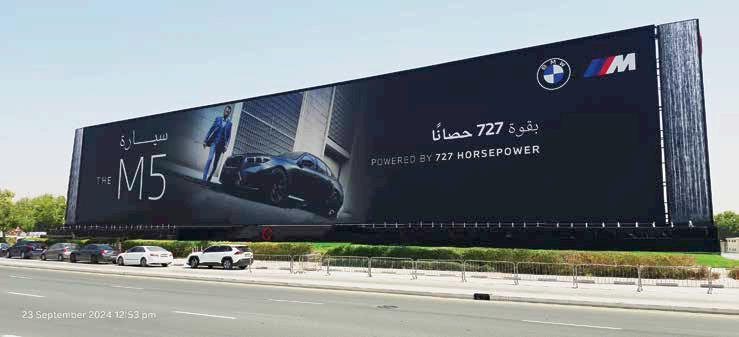


Are shorter deadlines and tighter budgets curtailing creativity in production?
Jack Wilkinson
Creative Producer at Create Production
NO
All productions face challenges, but tighter deadlines and budgets can boost efficiency. Limited time pushes teams to stay focused, while clients make quicker decisions. Creativity can thrive under pressure since the best ideas often emerge through iteration. Though time is needed for the creative process, constraints encourage decisive, impactful work once a certain point is reached.


Makram Fata Managing Director, World Edge
NO
While shorter deadlines and tighter budgets present challenges, they don’t necessarily hinder creativity. These constraints often fuel our creative process, and we view them as opportunities to elevate our work and deliver impactful results. Production houses should be prepared to blend original ideas, storytelling, and innovative techniques, even, and especially under pressure, transforming challenging briefs into impactful content across all platforms, and ensuring clients’ brands come to life memorably.
Grete Stadalnikaite Project Manager, MCH Global

Instead, they can drive teams to innovate by challenging them to think outside the box and find efficient solutions. Constraints often push creative teams to streamline ideas and prioritise impactful elements. These limitations also foster a disciplined approach for production, encouraging negotiation with vendors and a search for new materials and solutions. Tight timelines and budgets are often where unique concepts, delivered efficiently, are born. Ultimately, creativity and high-quality production thrive under pressure when teams view constraints as opportunities to innovate.

Paul Sabbagh Managing Director, Wonderful Productions
YES
Creativity in production often requires time to explore different ideas and refine concepts. When deadlines are tight, there’s less room for experimentation, leading to more conservative choices that are perceived as ‘safe’ or ‘quick.’ Tighter budgets limit resources, like talent and technology. This can lead to a reduction in the quality of the final product as the team is forced to make do with less. When production teams are focused on delivering something quickly and costeffectively, they may prioritise practicality over innovation.

Joyce Hadife Executive Producer, City Films Lebanon
Shorter deadlines and tighter budgets undoubtedly present challenges, but they don’t inherently stifle creativity; instead, they can reshape how it manifests. Limitations can sometimes push innovative thinking, as teams are forced to find new ways to deliver – still – impactful work. When we don’t have the luxury of time or endless resources, we often find ourselves coming up with creative solutions we might not have considered otherwise.
However, the real challenge lies in ensuring that these constraints don’t lead to a compromise in quality. It’s essential that we advocate for the space necessary for truly creative ideas to flourish. Ultimately, are shorter deadlines and tighter budgets curbing creativity?
Maybe a little, but with the right mindset, they can also be the catalyst for some of our most inventive work.

Ibrahim Hasan Head of McCann Content Studios – MENA
The truth is this is a double-edged sword. Saying no to tight timelines could reinforce the old way of doing things – endless production cycles that kill creativity. But here’s the thing: we, as agencies, need to stop clinging to outdated methods and embrace the reality of today’s content world.
We all claim to be 'social-first', but our storyboards are still locked in landscape mode. We say we’re 'content-native', yet we drop six-figure budgets on production for a piece that’s destined for TikTok. The reality? Shrinking timelines and budgets hurt creativity, but clinging to the old ways is just as damaging. Content today lives fast. It peaks within three days, and a trending audio can outperform a high-budget, glossy video. We need to adapt. Creativity in today’s game isn’t about perfection – it’s about being in the moment, where relevance beats production value every single time.
Gellecca Reina Montierro Head of Post-Production, digitalfarm
Creativity thrives today by leveraging flexibility in mediums. Social-first video concepts no longer require hefty budgets or long timelines. Short, snappy ideas align with our audience's attention spans, delivering impact comparable to long-form storytelling. Our agility and efficiency ensure we create powerful content that is resource-efficient yet effective. Good planning and collaboration are essential for delivering high-quality work on time and within budget. Even when under pressure, creativity continues to flourish, leading to fresh, innovative ideas that resonate with audiences. This adaptability allows us to consistently produce engaging and memorable content that connects with people.


Saqib Saeed
Fadi Al-Halabi
Communication and Marketing Officer / Social and Behaviour Change, UNICEF Syria
Yes, because tighter budgets can limit creativity, restricting the ability to explore out-of-the-box ideas. While creativity can thrive even with limited resources, it often shines brightest when not constrained by strict budget limits.
No, because working under pressure is normal in this field, and tight deadlines can push marketers to deliver their best work. The urgency forces focus, leading to streamlined, innovative solutions that might not emerge without such constraints. In essence, while challenging, these pressures can also be a catalyst for creativity.
Videographer and Video Editor at Hashtag Social Media Agency
Shorter deadlines and tighter budgets are curtailing creativity in production. They force teams to prioritise speed and cost over innovative ideas, often resulting in a focus on tried-and-true methods rather than exploring new concepts. This pressure stifles the creative process, limiting opportunities for experimentation and refinement, which are essential for producing truly original and impactful work. Ultimately, the constraints lead to more formulaic and less engaging outcomes.
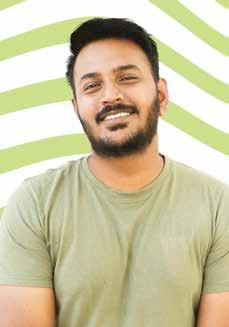

Group Head of Strategic Planning, AdPro Communications
There’s no black or white answer. Deadlines affect the depth and breadth of the work along with the craft. Budgets affect resources and craft. But not necessarily creativity, as it’s about the story we tell. Production is relative to channel and context. With the constant evolution of new media formats and shrinking attention spans, it’s not deadlines or budgets that have forced shorter film formats; it’s the people whose behaviours, perceptions, or actions we want to influence. So, while production budgets become tighter and deadlines become shorter, so is the asset’s usage. This should not, however, affect what’s in question – creativity.
Saudi Arabia is in the midst of a remarkable transformation, driven by Vision 2030, which has triggered rapid growth across industries.
As the Kingdom opens new doors to businesses, agencies from around the globe, especially those from neighbouring GCC markets, are eager to capitalise on the opportunities.
But the truth is: breaking into the Saudi market is more than just landing a few big contracts – it is about truly understanding the market and delivering campaigns that resonate deeply with the Saudi audience.
Now, more than ever, foreign agencies are finding it difficult to meet the expectations of Saudi clients. The reasons? A unique blend of cultural dynamics, evolving consumer behaviour, and intricate regulations.
To thrive, agencies must adapt their strategies, immerse themselves in the Kingdom’s landscape, and bring a localised understanding that goes beyond cookie-cutter global solutions.
Saudi Arabia is not just a market – it’s a culture steeped in ambition, positivity, and a deep sense of pride in its heritage. To succeed, agencies must be more than just marketing experts; they must become cultural interpreters.
Campaigns that fail to reflect the values of family, faith, pride, identity, responsible humour, community, and hope will inevitably fall short.
Moreover, Saudi Arabia is a youthful nation, with the majority of the population under 35. This creates a unique dynamic, blending traditional values with modern aspirations.
Agencies that don’t understand these cultural nuances – such as the evolving role of women in society and the Vision 2030 projects – will find themselves out of sync with their audience. Success in Saudi marketing requires more than just data; it demands empathy and deep cultural alignment.
UNIQUE CONSUMER BEHAVIOUR: A BLEND OF TRADITION AND TECHNOLOGY
Saudi Arabia is one of the most digitally connected societies in the world, with some of the highest rates of smartphone and social media usage. Platforms such as YouTube, X, Snapchat, TikTok, and Instagram aren’t just entertainment – they’re integral to shaping public opinion and driving purchasing decisions. Local influencers wield enormous power, and the digital landscape moves fast.
In such an ecosystem, relying on insights from other markets can be misleading. The Saudi digital ecosystem has its own rules, and personalisation is paramount.

fast-paced client relationships will face an uphill battle in Saudi Arabia. Here, patience and relationship-building are as important as the campaigns themselves.
NAVIGATING THE REGULATORY LANDSCAPE: PRECISION IS KEY
Saudi Arabia’s regulatory environment is highly structured, and adhering to local laws and guidelines is non-negotiable. From religious sensitivities to moral standards, agencies must be extremely cautious in how they present products and services. Saudi consumers are vigilant, and any perceived mistake – no matter how small – can lead to reputational damage or even legal issues.
Clarity in communication is essential, and terms and conditions are scrutinised more closely here than in many other markets. Customers won’t hesitate to report brands to the authorities if they sense a misstep. Local agencies, with their familiarity with the legal landscape, have a clear advantage here.
At the heart of every successful campaign is local insight. Global data points and market research may provide a broad understanding, but they rarely capture the fine-grained details that make a campaign impactful in Saudi Arabia.
On-the-ground presence is invaluable. Local agencies – those embedded in the fabric of the community – understand the shifting dynamics of Saudi society.
They’re quicker to spot emerging trends and more attuned to grassroots movements that shape public opinion. For foreign agencies, this level of market intelligence can be hard to come by, leading to campaigns that feel out of touch or irrelevant.
Saudi Arabia’s pace of change is nothing short of extraordinary. With new regulations, technologies, and opportunities emerging constantly, agencies must be proactive, adaptable, and ready to pivot at a moment’s notice.
Local agencies, deeply embedded in the market’s pulse, can adjust faster than global firms that often rely on more traditional methods of campaign development.
The Saudi market rewards agility and innovation. Agencies that are nimble and willing to take bold, calculated risks will find success. Those that cling to slow, rigid processes will be left behind.

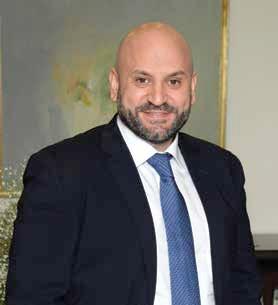

By Hussein M. Dajani, Group Chief Marketing and Customer Centricity
While foreign agencies bring a wealth of global expertise and creative talent, they must recognise that the Saudi market operates on a different wavelength. The Kingdom’s clients aren’t just looking for campaigns that look good on paper –they want insight-driven strategies that reflect the heart and soul of the local audience.
For agencies aiming to thrive in Saudi Arabia, the roadmap to success involves more than just learning the rules. It’s about investing in local knowledge, forming deep trust-based relationships, and embracing the cultural richness that makes Saudi Arabia such a dynamic and promising market. Only by immersing themselves fully in the local context can foreign agencies hope to meet and exceed the expectations of their Saudi clients.
In a country with such a bright future, those willing to adapt and evolve with the market will find not just success, but endless opportunities for growth and innovation.
The key is understanding that Saudi Arabia is more than just another market—it’s a world of its own, and it demands respect, insight, on-ground presence, local talent, and a commitment to excellence.
Saudis expect brands to be nimble, responsive, and in tune with their evolving preferences. Agencies that are slow to adapt or rely on generic approaches will struggle to keep up with the pace of change.
LANGUAGE AND COMMUNICATION: MORE THAN JUST TRANSLATION


Language in Saudi Arabia is more than just a tool for communication – it’s a reflection of identity. Arabic, in its classical form and regional dialects (such as Najdi and Hijazi), holds a deep cultural significance. Campaigns designed in English and translated after the fact often fail to resonate because they miss the subtleties that make messages meaningful. In the Kingdom, relationships are everything. Business interactions are built on trust and mutual respect. Agencies accustomed to transactional,







in translation








Petromin Corporation’s Hussein Dajani explains why foreign agencies tend to miss the mark with Saudi audiences.




If I can, let me begin with a story. My father was in Saudi for almost two decades, and he would say two things about the country. Firstly, on its influence he’d laugh as he would say, “if Saudi sneezes, the Gulf catches a cold.” And on the ability to get things done, “If it was easy, everyone would already be here.”
The region’s public relations scene has already caught the bug. For the past couple of years, I’d wager that the growth and revenues coming out of Saudi Arabia will exceed every other country.
The number of new launches, the number of pitches for international engagement, and a slow-burning understanding of the growing importance of internal comms means that Saudi Arabia is the place to be for any agency looking to turbocharge its expansion. Throw in a sprinkling of crisis issues, and there’s no country like Saudi Arabia for the possibilities.
This is being borne out on the ground, with agencies from all over the world looking to enter the market, from America, Asia and Europe. What is interesting that agencies in neighboring countries like Egypt are also eyeing the Kingdom.
Many Dubai-based outlets seem to be slower to move into the Kingdom – and I will admit, the process is not as easy as it could be – but can you handle communications remotely from Dubai for Saudi Arabia?
SAUDI FOCUS
Saudi-based communications expert Alex Malouf shares a personal take on PR and communications in the Kingdom, touching upon talent, risk, and dealing with global media.
are seen as unfriendly. When I asked a person working in a fairly large project about this, their response was, “We don’t need to deal with them.” This is why there’s such a strong preference for paid media. Long-term, we must have hard conversations with those who see the country (and the wider region) negatively to win them round.
The third hurdle is talent. This is an issue everywhere, I admit. At the same time, Saudi Arabia has some of the brightest young people I have worked with.
And, most importantly for the country, many of them understand different cultures given their time abroad (one of the best things Saudi Arabia did was to invest heavily in education and send many of these young people abroad to study).
We need to win them over and get them into communications, so they can tell their own stories to a global audience of a place that isn’t just opening up, but also has an unmatched ambition to be a place which everyone knows and where so much is happening.

Then there’s the issue of capacity and capability. I could fib and say communications is becoming easier to do here, but you only need to read the lines on my face or count the grey hairs to realise that’s probably not the case. Is now an exciting time in the Kingdom and working as a communicator? Most certainly, especially with all the new projects that are up and coming, the focus on mega events (Expo and the World Cup but to name a few), and the investment in new industries, from electric vehicles and technology to sports and the arts.





That blending of local knowledge, of Saudi Arabia’s cultures and the importance of the Arabic language and protocol, aligned with an international outlook and the energy of youth can mean all the difference for Saudi’s
‘‘Is now an exciting time in the Kingdom and working as a communicator? Most certainly!”
electric vehicles and technology to sports and the arts.




So, what are the challenges? I shared industry body for their upcoming event






industry body for their upcoming event in the Kingdom, and I’ll list a couple down here.




First, there’s a clear preference to avoid understand. As one person told me, “No











What we need to get better at is taking reputational work that needs to be done.















reputation in the hands of others, be it a stakeholder group, that’s taking a risk.
First, there’s a clear preference to avoid understand. As one person told me, “No reputation in the hands of others, be it a a the changes that are taking place for the country’s development.








wrong, the Kingdom’s reputation precedes it the Kingdom don’t understand or cannot see








understanding as to how to get that message across, even with journalists and outlets that





reputation. Ally that with experience and have a country that can rapidly change
reputation. Ally that with experience and have a country that can rapidly change its own narrative.






For all these reasons and more, I moved back to the Kingdom two years ago.
For all these reasons and more, I moved back to the Kingdom two years ago.



downs, but as a communicator I would
downs, but as a communicator I would




And it looks as if many other people are

And it looks as if many other people are going to keep joining me as the comms prepared to go through your own Saudi




prepared to go through your own Saudi






Ahead of his keynote speech at the upcoming Athar Festival, Manchester United’s Director of Marketing Matt McKie spoke to Campaign Middle East about unlocking growth opportunities, as well as positive brand and revenue impact through sports marketing in the Middle East.
By Anup Oommen
Sports marketing in the Middle East has grown into a blend of ambitious vision, substantial financial investment, economic diversification in action, and strategic partnerships.
Having become the home of global sporting events such as the Formula 1 Grand Prix, the FIFA World Cup, the Dakar Rally, several golf championships, and most recently the Esports World Cup, the region has witnessed the rise of state-of-the-art infrastructure, sports influencers, brand-building collaborations, sponsorship deals, naming rights, merchandising, intellectual property (IP), media and broadcast tie-ups, record viewership numbers, and die-hard sports fan community bases.
Campaign Middle East had the opportunity to discuss the effectiveness of sports marketing, evolving strategies, consumer behaviour and more with Matt McKie, the Director of Marketing at Manchester United, ahead of his highly anticipated keynote at the Athar – Saudi Festival of Creativity, which will be held on 5 and 6 November at the Crowne Plaza, RDC, Riyadh, Saudi Arabia.
to now understand the unique cultural and consumer landscape across continents and create new strategies to reach them.”
He added, “The emergence of new tools such as augmented and virtual reality will allow sports marketers to connect with these expanded audiences and will transform the industry in unimaginable ways. These technologies will give us the ability to immerse millions around the world in experiences that are typically only accessible to the very few – like attending a match day, meeting an athlete or experiencing historic sporting moments without ever leaving their home or city. The sports marketers that adopt these tools first, and spend time understanding how to best apply them, will not only be able to drive engagement that previously wasn’t possible, but they will also unlock significant new revenue streams.”

McKie has previously worked with EA Sports, Nike, the International Olympic Committee, and now leads the marketing division at Manchester United, which was recently named the most valuable football club in May 2024, with an estimated value of $6.2bn. In conversation with Campaign Middle East about how he has seen sports marketing evolve over the past few years, McKie said, “Following the globalisation of the media industry, mostly driven by the continued acceleration of digital media platforms, sports marketing has become increasingly more global in nature. This has created huge opportunity as sports properties that have typically been rooted in their local culture are now able to reach and attract audiences from around the world, and connected to that, it has created new revenue opportunities. With this comes new challenges as marketers need
In the current world, pampered with shorter, more consumable, snack-bite content, attention spans have become increasingly fleeting. It has become imperative to capture attention in a crowded and competitive market. Talking to McKie about attention and the challenge of converting a casual viewer into a die-hard fan, we paraphrased Eminem’s famous lyrics into a question: “How would you capture it, or would you let it slip?”
McKie responded, “Marketers can sometimes slip into a space where they stop focusing on their audience, and instead focus on optimising content to drive the highest reach based on the algorithms of each social channel, or by leveraging the latest trending topic. Yes, this can drive some short-term impact, but the path to capturing attention and creating advocacy is to truly understand your audience, which can be challenging in sports as fan sentiment changes very quickly.”
He added, “As such, I’m a big believer in creating fan advisory panels that represent a diverse mix of your audience base, as it’s the best path to understanding your fans on an ongoing basis, and it enables teams to remain agile in how to meet their needs. This will lead
to the creation of fan-centric content, that regardless of the functionality of the most recent trending social platform, will find and capture the attention of your fanbase.”
That said, it’s equally important that this fan-centric content is delivered to fans in a way that they like and on a channel that they prefer being on. Many marketers and sports superfans alike have previously opined that sports-led entertainment is the prime reason that linear television and direct-to-consumer broadcasts are still alive.
Yet, with viewers increasingly spending much of their time on social media channels such as TikTok and Instagram, we asked McKie whether the time has come for sports marketers to tweak their strategies in line with constantly evolving consumer habits and leverage channels and platforms that fans already love, or to choose integrated and omnichannel approaches instead.
“The answer here again is to be fan-centric as a marketing team, leading to the creation of complementary strategies that fully meet the needs of a diverse audience,” McKie said.
“For example, as we think about the popular media narrative that traditional broadcast is in decline at the expense of digital platforms, the data within sports tells us that audience needs are broadening, with fans seeking new ways to engage in the events that they love. This is proven out in the success of the Paris 2024 Olympic Games, where broadcast partners leveraged multiple channels across linear and digital platforms to create a tapestry of unique content – from long-form to short-form, from athlete-focused to event-orientated, from fun to factual – that ultimately enriched the overall audience experience,” he explained.
The data from the Olympic Games backed this response. In Europe, the average linear television audiences on Eurosport and free-toair channels were double the figures for the previous games and saw more than 7 billion minutes streamed on-demand – which is seven times what was achieved during Tokyo 2020.
Social platforms saw similar growth, with NBC Sports reporting 2.8 billion social impressions throughout the games, which amounted to a 178 per cent increase compared with Tokyo 2020.
“What we’re experiencing is a continued explosion in audience needs, and more opportunities for marketers to meet those needs, which if understood, resourced and executed correctly can unlock huge engagement growth for sports marketers,” McKie said.
However, in a region as vast and diverse as the Middle East, painting marketing strategies with a broad brush won’t do. Seasoned marketers have realised that strategies that work in the UAE don’t work in the Kingdom of Saudi Arabia. They have vastly different demographics with varying likes, values, and preferences between nations.
Commenting on the nuances of marketing the same ‘product’ across different markets, McKie advised, “There are some very basic fundamentals related to developing a product and an associated marketing plan across continents and countries, such as ensuring there is no content that could be perceived as inflammatory to local cultures, and that global creative works and can be further adapted for local audiences. Once this baseline is covered, the bigger question can be addressed, which is: what content can be included in a product or campaign that will unlock and grow regional audiences?”
“A good example from my career was our desire to grow EA Sports FIFA into more casual football markets such as the United States, where football is more niche and therefore the market has lower knowledge of the leagues, the teams, the tactics, the athletes, and the language of the sport. Rather than change the fundamentals of the product and marketing itself, which might be alienating to more established markets, we decided that a supplementary game mode was needed that could appeal to and educate more casual fans in that region,” he added.
“MARKETERS CAN SOMETIMES SLIP INTO A SPACE WHERE THEY STOP FOCUSING ON THE AUDIENCE, AND FOCUS ON OPTIMISING CONTENT.”
The answer was a story mode – which came to be known as ‘The Journey’ – a cinematic experience that guided gamers through a narrative where gamers took control of a player in the English Premier League.
“This was ultimately a more accessible entry point to the sport and to EA Sports FIFA, where players were able to learn as they progressed. The marketing for this product was also localised heavily, where we created regional versions of key campaign assets with local athletes and celebrities added to it. Only a handful of global stars, such as Lionel Messi, featured in every version,” McKie explained.
This doesn’t mean that a marketing campaign must be complex in order to be effective. Quite often, a seemingly simple idea – executed to perfection – can have a much better impact on brand building and sales.
We asked McKie to expand on this thought, using the example of an athlete marketing campaign for apparel collections, including customised football boots that he oversaw at Nike, which included the likes of Harry Kane, Jadon Sancho, Phil Foden and Raheem Sterling.
“When the product reached the customer, on the surface it appeared simple, but it was the result of years of understanding the essence of the athlete. This included ethnographic research, where we worked to understand and interpret the culture, behaviours, beliefs and social context of each player,” McKie said.
“The impact of this was twofold: we created product and campaigns that truly represented the athlete in a way other products did not, and therefore they would provide deep endorsement beyond any contractual commitment,” he added.
“This would result in fans of these players having higher levels of advocacy for the Nike brand, and there was also a direct revenue impact from the products sold when they landed in retail.”
Before we concluded the conversation, we discussed another key trend revolutionising participation, viewership, sponsorships, partnerships, and fan bases: the rampant rise of female sports marketing.
“Sports marketers are now understanding the enormous societal and commercial benefit of inspiring young girls to consume and participate in sport. Insight shows that 65 per cent of girls drop out of sport by age 16, which is twice the rate of young boys dropping out – and the sad reality is 80 per cent of girls believe they don’t belong in sports due to lack of role models, among other factors,” McKie said.
“Brands and marketers have a responsibility to address this as there are incredible female athletes, who have unbelievable stories, that can change the trajectory of women’s sport participation – if we can just get more eyeballs on them,” he added.
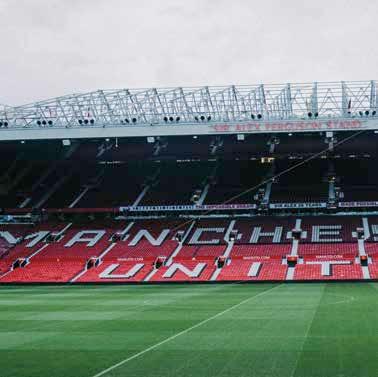

Equally, marketers are also starting to understand that if they support growing participation rates, there is a huge potential upside in all aspects of the commercial model – from women buying more sports equipment and increasing viewership of women’s sport in the short-term, which ultimately drives up broadcast and sponsorship revenues in the longer term.
“Challenges remain, such as lower immediate return on investment compared with those typically seen in men’s sport, but cost of entry is far lower and with experts predicting annual growth rates of 15 per cent to 30 per cent for elite women’s sport. Marketers that switch on to the long-term potential of women’s sport will be rewarded with positive brand and revenue impacts,” McKie concluded.
Matt McKie will present a keynote on ‘Best Practices in Sports Marketing’ at the upcoming Athar - Saudi Festival of Creativity in Riyadh on Tuesday, 5 November, 2024. To watch him speak, get your tickets at atharfestival.com.
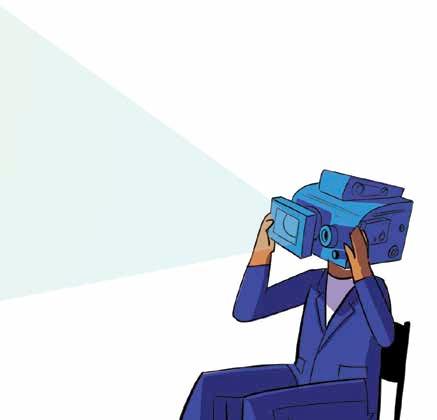


Founded: 2018
Headquartered: Beirut samer@1505.studio; jad@1505.studio +961 3 489 348
1505 Studio is a boutique multimedia production company. In 2018, producer Samer Fleihan and director Jad Rahmé teamed up to create marketing and storytelling content for global and regional brands. 1505 is dedicated to working with the best talent, carefully curated to fit the desired needs and challenges of our partners. Whether it’s a TV commercial, documentary, photography or digital content, our work reflects the stories and values of our corporate and creative clients.
Founded: 2011
Owner: Asser Obeid
Offices: Dubai and Abu Dhabi Number of staff: 8 info@akamedia.ae +961 3 489 348
SERVICES: Video production; post production; animation; marketing; strategy; brand marketing
Founded: 2015
Ownership: A2Z Media Group
Offices: Qatar, KSA, UAE, Lebanon
Number of staff: 111 info@a2z.media
SERVICES: Post-production, scriptwriting and storyboarding, location scouting and set design, cinematography
Founded: 2000
Ownership: Leapfrog
Offices: Egypt, Dubai and Saudi Arabia
Number of staff: 12 robsz@a2zleapfrog.com
SERVICES: Corporate, TV commercials, digital content, animation and documentary production
Owner: Crispin Dominic
Founded: 2004
Offices: Dubai, Abu Dhabi, Saudi Arabia, Mumbai hello@actionfilmz.com
SERVICES: Film and photo equipment rental, line production, studio rental, crew, AV equipment rental
KEY CLIENTS: MBC, Dejavu Productions, Emirates Airlines, Joy Films, Dubai Tourism
Founded: 2021
Holding group: Action Global Communications
Office: Dubai
Number of staff: 12 rayan.a@actionprgroup.com
SERVICES: Social media content production, TV commercials, micro/macro documentaries, high-end still photography, 2D animations
KEY CLIENTS: Dubai World Trade Centre, Professional Fights League MENA, Dubai Duty Free Tennis Championships, Pro Activ Entertainment, Al Ghurair Centre
Founded: 2023
Founder: Joe Almano
Headquarters: Dubai www.almano.io joe@almano.io
SERVICES: Video production, photography, talent casting and management, creative strategy
KEY CLIENTS: Wyndham Hotels & Resorts, UAE Team ADQ, The First Group Real Estate, Aquae Jewels
Founded: 2010
Ownership: AFP
Regional headquarters: Beirut
Number of staff: 52 mena@afp-services.com
SERVICES: Content production, pre-production, scripting, editing, postproduction, distribution
Founded: 2005
Offices: Dubai, Saudi Arabia, Iraq, Lebanon info@aws-studios.com
SERVICES: Production, post-production, TV commercials, TV shows, TV series, TV branding
KEY CLIENTS: MBC 1, MBC Iraq, Dubai TV, Abu Dhabi TV, Emaar, Emirates Airline
Headquartered: Dubai
Number of staff: 20
Founded: 2000 info@bkp.group
SERVICES: Sonic branding; original music composition; audio production, concept and development; full-service PH; post-production; music for events
Offices: Dubai, Beirut, Riyadh
Number of staff: 18
Founded: 2007 hello@bigkahuanfilms.com
SERVICES: Producers of high-end advertising films and digital content.
Headquartered: Dubai (Bigfoot Middle East) and Cairo (Bigfoot Films)
Number of staff: 11
Founded: 2011 info@bigfootfilms.net
Founded: 2019
Owners: Rami Yasin and Mofeed Abu Algebeen
Offices: Dubai and Abu Dhabi
Number of staff: 5 info@breakoutfilms.com
SERVICES: Feature films, TVCs, documentaries, TV programmes and series, post-production
Founded: 2012
Headquartered: Dubai www.815studios.com
+971 4 570 6102
film@weare815.com
815 Studios is an award-winning media production company; renowned for delivering comprehensive services across pre-production, production, and post-production.
At 815, creativity knows no bounds. We are a highly skilled, dynamic force in content creation, dedicated to producing captivating and effective content. Whether it’s producing a commercial for high-impact media campaigns or documenting a major sporting event on the global stage, our team of visionary storytellers and technical craftsmen pride themselves on transforming bold ideas into immersive content experiences.
815’s reputation is built on our commitment to high-quality delivery and exceptional end-to-end service, ensuring each project is executed with precision and integrity.
SERVICES: Pre-production (casting, logistics), creative development, film and video production (TVCs, documentaries, corporate), production management, drone capture, photography and post-production (editing, sound mix, animation)
KEY CLIENTS: Saudi Ministry of Sport, Saudi Pro League, Saudi E-Sports Federation, Manchester City FC, Universal Music Group, Saudia Airlines, MOTIONGATE Dubai, LEGOLAND Dubai, Julius Baer, Al Jazira FC, Live Nation Entertainment, Arabian Radio Network and Snap Inc.















Founded: 2018
HQ: Dubai executive@camouflageproduction.com
SERVICES: Film production, post-production, animation, photography and events management
Founded: 2005
Owners: Ian Ross and Karen Coetzee
Offices: Dubai and Abu Dhabi
Number of staff: 6 karen@centralfilms.com
SERVICES: TVC, content, corporate, TV series, feature films
KEY CLIENTS: Hyundai, LUCID, Toyota, Bvlgari, Hermés
Founded: 2005
Owners: Ian Ross and Karen Coetzee
Offices: Dubai and Abu Dhabi
Number of staff: 6 karen@centralfilms.com
SERVICES: TVC, content, corporate, TV series, feature films
KEY CLIENTS: Hyundai, LUCID, Toyota, Bvlgari, Hermés
Founded: 2002
Headquartered: Dubai, UAE No of staff: 15 +971 04 390 3970; +971 04 390 3972 www.boomtown-productions.com letschat@boomtown-productions.com
Holding group: MCN/IPG Regional HQ: Dubai (MENA) jon.marchant@craftww.com
SERVICES: Content creation, design and retouching; AV production; postproduction, motion graphics and editing; videography and photography
Founded: 2023
Office: Dubai
Number of staff: 2 hello@creative-baboon.com
SERVICES: Creative development, production, content marketing
Founded: 2015
Offices: Dubai, Sydney and Singapore
Number of staff: 15 jumana@electriclimefilms.com
SERVICES: Director representation, film production, post-production (offline, online, colour, finishing, audio mixing)

With over two decades of experience, Boomtown Productions has become a cornerstone of the UAE’s creative industry, producing award-winning campaigns for some of the region’s most prestigious brands. Known for seamlessly blending visionary storytelling with cu ing-edge technology, the company has earned a reputation for pushing boundaries under the guidance of CEO Shane Martin, a prominent figure in the industry.
Boomtown’s strength lies in its bespoke approach, selecting top-tier directors and a highly skilled team of producers, coordinators, and editors to bring each project to life. Executive Producers Bruce Macdonald and Daniel Kilalea lead the charge, ensuring that every production—whether a high-profile commercial or a feature film—not only meets but exceeds expectations.
Diversity and gender equality are embedded in the company’s ethos, creating a dynamic and inclusive environment where creativity thrives.
Boomtown’s portfolio includes standout projects like the Manchester City commercial for Etihad, BMW’s award winning campaign “made from aluminium sustainably sourced in the Middle East”, Saadiyat Grove “where Pharrel Williams finds inspiration” and the Emirates Campaign with Penelope Cruz which have struck a deep emotional chord with audiences, exemplifying the company’s ability to tell stories that resonate. From concept to execution, Boomtown Productions remains a trusted partner for brands looking to make a lasting impact through the power of film and storytelling.
SERVICES: Production/post-production (film/TV/radio)
KEY CLIENTS: Serviceplan, ROSHN KSA, National Geographic, Emirates, E ihad, EGA, Pitch Marketing, QNB, Toyota/ALJ
















Founded: 2014




Headquartered: Dubai, UAE No of staff: 10 artologycreative.com +971 4 453 1778 info@artologycreative.com





Artology Creative is a full-service content production agency with a multinational team specialising in film production, animation and VFX. We collaborate with clients and agencies to bring creative ideas to life, handling every step from concept to delivery. Our diverse talent and expertise ensure high-quality content that meets the fast-paced demands of today’s marketing and events landscape.
SERVICES: Concept development, film production, 2D animation, CGI, AI content production, photography
KEY CLIENTS: BEEAH Group, Abu Dhabi Islamic Bank (ADIB), Department of Economy & Tourism (DET), Brands for Less, Image Nation Abu Dhabi


Founder & Executive Director
WITH GOVERNMENTS AND BRANDS LEANING HEAVILY INTO VIDEO-BASED CONTENT, HAVE MORE OPPORTUNITIES FOR WORK BEEN CREATED?
Absolutely. The surge in video-based content has created significant opportunities in our industry. With more than 75 per cent of our clients being government or semigovernmental and a growing number of international brands seeking more creatively challenging work, we’ve been able to leverage our expertise in film production, animation and VFX to meet diverse needs. The shift towards video as a powerful storytelling tool has energised our team, especially in events where the creative use of digital screens and canvases inspires us to push boundaries and deliver impactful, engaging content that truly resonates with audiences.
WHAT ARE PRODUCTION HOUSES FOCUSING ON TO STAND ABOVE THE REST IN A COMPETITIVE MARKET?
I can’t speak for the whole industry, but here’s our recipe to stand out in an increasingly competitive market: we’re laser-focused on delivering exceptional creativity, specialisation, and versatility. As early adopters of AI, we’ve executed multiple projects for clients like DET and ADIB. We’re actively experimenting with AI tools and
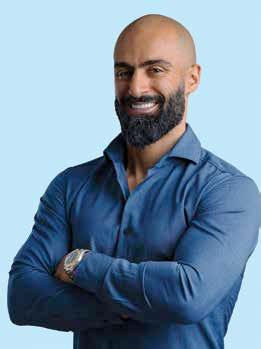
building a library of culturally relevant models—since most platforms lack the ability to generate culturally sensitive characters. Our goal is to ensure every team member becomes an AI prompt engineer, pushing the boundaries of what’s possible.
WHAT ARE THE MAIN CHALLENGES THAT NEED TO BE ADDRESSED IN THE INDUSTRY?
One of the main challenges in our industry is the influx of new content creators, enabled by the widespread availability of advanced technologies. This democratises content
production, bringing fresh perspectives and vitality to the field. However, it also compels established production houses to continuously innovate and elevate their offerings to stand out. Embracing change and integrating new technologies are essential for maintaining relevance and leadership in the industry. For seasoned filmmakers, adapting to this dynamic environment is crucial to harnessing the creativity of a new generation while upholding the high standards that define professional content.
HAS IT BECOME HARDER FOR PRODUCTION HOUSES IN THE REGION TO ENSURE LONG-TERM SUSTAINABILITY AMIDST AN INCREASING FOCUS ON PROJECT-BASED WORK?
Long-term sustainability can indeed be challenging in a project-based industry, especially if we stick to the traditional “production house” operational model. That’s why at Artology we had to innovate and operate differently, making Artology a one-stop shop for high-end content creation. Continual innovation and adding value to clients are key to avoiding obsolescence. By introducing new services that extend beyond basic production—such as expanding our animation capabilities, VFX, and advanced event content—we not only ensure our relevance but also invigorate the industry. Our operational and organisational structure, which blends traditional agency approaches with flexible project management, allows us to effectively balance retainer-based and project-based clients, maintaining stability in a dynamic market environment.

Founded: 2016
Headquartered: Dubai
Number of staff: 16
https://createproductiondxb.com/ +971 4 442 5674
hello@createproductiondxb.com
Create is a production house that understands today’s audiences, and how they choose to consume content on different channels. It has built a team of content creators who live and breathe video production, and have the skills to combine digital know-how with world-class visual storytelling.
SPECIALISMS: Aerial Production, TVCs, docu-series, social / short -form events.
KEY CLIENTS: Visit Dubai, Volkswagen, Public Investment Fund, Dubai Holding, Royal Commission for AlUla
Offices: Dubai (HQ) and Abu Dhabi, UAE.
Number of staff: 8
Founded: 2012 info@epicfilms.me
SERVICES: Film production servicing; feature film facilitation
Founded: 2011
Ownership/holding group: Flag M Group
Regional headquarters/office location: Lebanon
Number of staff: 150 info@feer-mcqueen.com
SERVICES: Photography, videography, custom set design and construction + lighting and sound setup, post-production
KEY CLIENTS: Swatch, Total Energies, Toyota, Patchi, Hilton
Headquartered: Doha, Qatar
Number of staff: 25
Founded: 2012 info@thefilmhouse.tv
SERVICES: Full-service production

Founded: 1995
Offices: Lebanon, UAE and KSA info@cityfilms-lb.com Cityfilms-lb.com
At CITY FILMS, we work with a curated team of the most passionate producers, and a pool of talented local and international directors, building a consistent track record of creating quality productions across the Middle East. To us, filmmaking is not just an industry. It is an art, a craft and a journey in itself.
More than 25 years of unparalleled experience in filmmaking and production have allowed us to be selective and choose projects that stimulate creativity and inspire us to push boundaries. Boundaries that are ever evolving with time, and that we progressively challenge as we look excitedly towards the future of bringing great ideas to life.
You don’t have to be in front of the camera to smile.
SERVICES: Film production; production services; online content; music videos; corporate films
KEY CLIENTS: Saudi Tourism Authorities, Infinity Energy, OOREDOO, Etisalat, DEPE, Almarai Company, Damas Jewelelry, Arab Bank, KFH, Royal Opera House Muscat, Aqaba Tourism board, Asian Games, Zain Group, MBC Group, Al Moujil group KSA, Mobily Telecom, STC Telecom, Nestle, Mars, Pepsi, Coca-Cola, Toyota, Nissan, Sadia, UAE Air Forces, Korek telecom, Puck, Kraft, Unilever, STC, Daikin, Mansam, WF
AWARDS: Lynx, Mena Cristal, Epica, Cresta, London Film Festival. London International Awards LIA, Cannes nominations





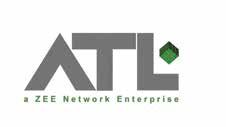
Founded: 2014
Parent Company: Zee Entertainment Middle East FZ LLC
Regional headquarters: Dubai www.zee.com
+971 4 365 3700 production@zee.com
ATL Media, a division of Zee Entertainment, is the leading Arabic production company in the MENA region, dedicated to delivering exceptional content to both Arab and global audiences. Our diverse portfolio, featuring more than 20 Arabic productions— including series, movies, and programmes—focuses on Levant, Egyptian, and Khaleeji productions that have been acquired by more than 30 broadcasters across the MENA region. Building on the success of our original IP in the MENA region, we are broadening our co-production initiatives across Latin America and Africa and are eager to collaborate with new partners in other regions.
SERVICES: Production, co-production, format licensing, drama and films licensing, IP creation
KEY CLIENTS: MBC Group, Netflix, Amazon Prime Video, Yango, Abu Dhabi TV, Dubai TV, Saudi TV, BeIN, Tod
AWARDS: 2nd place award of Arabic Production 2024 for Aghmed Aaynayk by Arab States Broadcasting Union (ASBU), Best Adaptation of a Foreign-Language Drama Series to Arabic for Ser by BroadcastPro ME 2021

AGHMED AAYNEK
The award-winning series has emerged as the highest-selling Arabic show, distributed across more than 15 broadcasters and platforms throughout the MENA region. In 2024, its format was successfully syndicated to Latin America.
Directed by Moamen Al Malla
Written by Loay Al Nouri and Fadi
Muhammad Al Manfi
Cast:
Mona Wassef
Amal Arafa
Abdel Moneim Amairy
Ahmad Al Ahmad

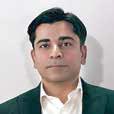




The series was launched on Amazon Prime Video as the first Indian format to be adapted into an Arabic production and was entirely filmed in the UAE.
Directed by Basem Salka, Mohamed
Abdel Karim Ali and Nashaat Al Melhem
Written by Lujain Khalaf & Basem Salka
Cast:
Nadine Tahseen Baik
Haval Hamdy
Badi Abu Shaqra
Jihad Saad

This series marks the first Indian format adapted into an Arabic production, entirely filmed in Egypt. In 2024, the series was successfully syndicated to Africa and Russia.
Directed by Hussein Shawkat and Souad Al Haggan
Written by Sameh Magdy and Tamer Hussien
Cast:
Riham Hagag
Mohamed Kelany
Walaa Elshrif
Omar El Shenawy

The Award-winning series received the accolade for “Best Adaptation of a Foreign-Language Drama Arabic Series” in 2021. It has been sold to over 11 broadcasters and platforms across the MENA region.
Directed by Marwan Barakat and Ghayath Alajajah
Written by Moayad El Nabulsi
Cast:
Bassam Kousa
Bassem Moughnieh
Dalida Khalil
Wesam Hanna
Holding group: Italian Entertainment Network
Offices: Dubai, Riyadh, Milan, Madrid, Rio and London
Number of staff: 80
Founded: 1974 (Milan); 2005 (Dubai) heather.mcdonald@filmmastermea.com
SERVICES: Creativity; production; post-production; international servicing
Founded: 2012
Offices: Dubai and Abu Dhabi
Number of staff: 15 info@filmsbynomad.com
SERVICES: Full production services, ground and drone filming, in-house edit and graphics, local UAE facilitation services
Founded: 2021
Ownership: Fractal Group
Office: Dubai
Number of staff: 10 studio@fractal.ae
SERVICES: XR video production, virtual production, TV commercials, end-toend video production services

Founded: 2011
Ownership: Marwan Nicolas
Offices: Riyadh, Beirut, Dubai Number of staff: 12 +966 11 231 1322 info@dreamboxfilms.com
Founded in 2011, Dreambox Films is a leading production house serving the MENA region. With offices in Riyadh, Beirut and Dubai, we specialise in efficient and creative film production services. From concept to completion, our team excels in delivering high-quality productions tailored to meet diverse needs of top-notch clients and agencies. We’re dedicated to bringing imaginative ideas to life through storytelling that resonates with audiences worldwide.
SERVICES: Film production, commercials production, video production, production services, photo production, documentary production
KEY CLIENTS: VML, Publicis Group, Webedia
AWARDS: Grand Prix at Dubai Lynx for Hunger Station Birthmark Stories, Gold Effie for Hunger Station Birthmark Stories, Grand Prix and Gold at Loeries for STC Rayeh Rayeh Campaign; Gold Medallions and Silver x2 at AME Awards for Schweppes
Founded: 2013
Headquartered: Dubai, with offices in Beirut www.gigaworks.ae +971 50 350 2735
Giga Works is a VR film studio offering 360-degree content capture and storytelling and virtual reality experiences. We have undertaken many virtual reality experiences across the UAE and worldwide since 2013.
SERVICES: 3D and 360-degree video content capture; VR content creation; VR post production; VR apps and games production; VR Cardboards production
Heads of company: Eve Hester-Wyne, Hisham Wyne
Founded: 2014 eve@hwm.ae
SERVICES: Content (wri en and audio-visual); specialised content (complex and technical sectors); TV production and direction; media training
Founded: 2021 Holding group: Sole Establishment
Office: Riyadh Number of staff: 8 hi@insightstudios.sa
SERVICES: Media production, TV commercials, short films, documentaries, creative concepts
Headquartered: Dubai Number of staff: 10
Founded: 2006 joe@jbmstudio.com
SERVICES: Audiopreneurs; music composition; sound design; voice-over casting and recording; mixing and mastering
Headquartered: Dubai Number of staff: 15-20
Founded: 2010 info@kkompany.com
SERVICES: Video; television; audio; store music
Founded: 2019
Holding group: Keko Group
Office: Dubai
Number of staff: 30 patrick.pesch@keko.ae
SERVICES: Social content, short films, motion graphics

Founded: 2023
Headquartered: Dubai, United Arab Emirates
Number of staff: 10 www.dynamik.digital +971509880436 mary@dynamik.digital
Dynamik is the first post-production management agency in the Middle East, established in 2023. Born from a need for diverse talent, Dynamik bridges the gap between clients and international professionals. Exclusively representing a hand-picked roster of elite post-production experts – editors, colourists, sound designers, composers, and VFX artists – Dynamik offers exceptional talent and postproduction strategic consultation. Focused on aligning the right talent with the right projects, Dynamik serves leading brands, filmmakers, and production houses.
SERVICES: Editing, colour grading, music and sound design, animation, photo retouching
BOU AKL
Founder and Talent Agent
IS THERE A SKILLS GAP THAT NEEDS TO BE ADDRESSED GIVEN THE RISE OF AND DEMAND FOR AI-POWERED TOOLS?
While AI-powered editing tools and advanced technologies have certainly transformed the industry, there’s an essential element that remains irreplaceable: raw human talent. AI can assist in speeding up workflows, automating repetitive tasks, and providing technical efficiency. Still, it lacks something fundamental – creativity, emotional intelligence, and the instinctive craftsmanship that only a skilled human artist can bring to the table.
AI has no sense of nuance, storytelling, or emotion. It can analyse data and execute algorithms, but it doesn’t understand the power of a well-timed cut, the subtlety of visual storytelling or how to evoke an emotional response from an audience. That’s where human talent comes in, and it’s more crucial now than ever. Craft and emotion are at the heart of every great piece of postproduction work. The human touch is what transforms ‘good’ into ‘great’. An AI tool will never capture the feeling, context or story that an artist with years of experience can bring. It is in our core at Dynamik to prioritise human craftsmanship.
HAVE YOU SEEN A RISE IN THE LOCAL POST-PRODUCTION TALENT WITHIN THE MIDDLE EAST REGION, AND WHAT OPPORTUNITIES LIE AHEAD FOR THEM?
There has been indeed a remarkable rise in local post-production talent across the Middle

East. This is an exciting time for the region, as we see more home-grown professionals bringing their creativity and cultural insights into the industry. I see a growing appetite for original content from the region, and as the Middle East continues to position itself as a global hub for media and entertainment, there’s enormous potential for our local artists to be at the forefront.
However, I find it essential to foster collaboration between local talent and international expertise. True innovation happens when diverse talents come together. We create an opportunity for a dynamic exchange of skills, ideas, and inspiration. It’s never about replacing local talent but enriching the creative process, allowing

everyone to learn from each other and grow. When cultures meet, the result is often groundbreaking. Stories are told in ways that feel both familiar and new, capturing a global audience while staying true to regional roots.
IS THERE A NEED FOR MORE POSTPRODUCTION ACADEMIES?
Certainly, there is a significant and growing need for specialised training programs and post-production academies that cover advanced techniques. At Dynamik, we are in current discussions to invest in the development of training programs to nurture and grow new talent in these areas. This initiative is central to our vision and next steps. We are initially in discussions and collaborations with universities to create a comprehensive program for the rising talent. Dynamik’s vision is to attract international clients into the Middle East, and we are committed to leading this transformation and elevating post-production excellence through focused training and strategic partnerships.
DO CHALLENGES SUCH AS TIGHT DEADLINES, COMPATIBILITY ISSUES, AND GAPS IN TECHNICAL KNOWLEDGE CONTINUE TO PLAGUE THE INDUSTRY?
Our clients are generally skilled, however tight deadlines, missed timelines, and varying levels of knowledge in post-production can impact quality and efficiency. A key factor is for clients to trust the expertise of their post partners. This trust fosters a collaborative environment, allowing artists to deliver their best work. Additionally, a common bottleneck is booking post-production artists last minute, which often undermines this important phase. Allocating adequate time and attention to post-production from the outset is essential for achieving optimal results.
Joy Films’ Ali Azarmi calls for a courageous future where the creative industry embraces bold and innovative thinking.
The Middle East and North Africa region is made up of such diverse peoples and cultures that can’t be painted with one brush. To think of it as a singular region would be to dilute its rich complexity to its lowest common denominator.
This diversity is a strength, but it also results in social attitudes, cultural tendencies and traits that differ significantly from East to West, thus shaping how countries approach and view creativity and innovation. For example, many societies in the MENA region, as well as in Eastern societies, generally tend to be more conservative and conformist, while Western societies tend to be more individualistic and nonconformist. Innovation and creative thinking require a nonconformist, curious and irreverent mindset that questions everything all the time, continually challenging the status quo. That’s how we as humans have evolved and progressed. All the luxuries we take for granted today were once revolutionary ideas from unconventional minds for whom ‘good enough’ was not good enough.

The biggest challenge to tackle across our region is shifting from a conformist to a free-thinking mindset across all sectors of society. This shift is crucial because, with the global economy becoming less reliant on fossil fuel resources, countries are increasingly aware of the need to diversify their economies to embrace this new reality.
The visionary leadership in countries such as Saudi Arabia and the UAE has embraced the change to become active players in the global economy. Knowledge and innovation are the real fuels for the economy of the brave new world. And innovation only emerges from creativity. So, for this vision to be realised, a fundamental shift in society’s mindset is required so people are able to embrace their role.
In our field of media production, as in all other industries, the obstacles to creativity and innovation are rooted in a fear of parting from the safety of the familiar conventions and of making mistakes. In MENA, and indeed in many parts of Asia, mistakes and failures are regarded as taboos rather than essential parts of learning and progress.
Creative industries thrive on bold ideas, and when failure is feared, boldness is stifled. Decision-makers in these fields must understand that ideas cannot be made great by democratic decision-making and ticking
“OPINIONS SHOULD NOT BE TREATED AS FACTS OR RULES TO STEER CREATIVE IDEAS. GREAT IDEAS BREAK THE RULES. ”
boxes. Opinions should not be treated as facts or rules to steer creative ideas. Great ideas break the rules. They’re unexpected, different and daring, so they should make decision-makers a little nervous and uncomfortable. It takes a brave client to see the potential and take the plunge.
Unfortunately, for most, the safety of the comfort zone is more alluring than taking a chance on something different.
Nothing great was ever achieved by pleasing everybody, which may explain why we don’t see statues raised to celebrate committees.
This unwillingness to break from the norm extends beyond marketing and media to other creative industries, such as filmmaking, but the same principle applies. Filmmaking has the potential to be a powerful platform for cultural expression.
Now, more than ever, a creative mindset is a valuable commodity, particularly as the region seeks to diversify its economy.
Egyptian, Iranian, Turkish, Indian, Korean, Chinese and Japanese films have already developed their own distinct identities and international appeal. Other countries in the region, particularly in the GCC, face the challenge of developing their own uniqueness if they wish to follow suit. This is not to say that filmmakers should conform to a certain style that defines their local industry. However, unfiltered freedom of expression does not necessarily result in greater creativity. All artistic movements are shaped by a set of rules and parameters that define them. Islamic art is a great example of this. Creativity emerges from working with restrictions, not from viewing them as obstacles.
The future of the film industry relies on those who enter the field, drawing from their unique insights and cultural heritage to create their own cinematic language. But, like creatives worldwide, these individuals will naturally be nonconformists. Their unconventional mindset is what helps bring untold stories to life in innovative ways.
Stories that are inspired by the region’s rich poetic tradition and flavoured by its incredible pace of social and economic change. The result will be a legacy that not only leaves a huge mark on the global arena but also inspires future generations of filmmakers. For true representation, it’s essential that more local voices drive the creative process and take on active roles in the industry as creatives and agency leaders, whether in filmmaking, commercial media production, or advertising. This is particularly important in the GCC, where local citizens are still underrepresented, and much of the communication is orchestrated and executed by foreigners with relatively limited understanding of the local culture. Ultimately, the region’s ability to build a thriving creative industry depends on bold, innovative thinking, led by local voices who shape their own narratives and cultural expressions. By embracing this courageous mindset, the region can foster a stronger identity on the global stage while ensuring that the stories told are both authentic and truly reflective of its rich diversity.
By Ali Azarmi, Managing Partner, Joy Films
Founded: 2017
Headquarters: Dubai
Co-Founders: Simrrun Rupani, Juhi Rupani
Number of staff: 44 +971 50 6905849 www.eyestudio.ae contact@eyestudio.ae; juhi@eyestudio.ae
Eye Studio is a boutique agency that sees storytelling from a different lens. Our young, dynamic team has a sharp eye for content creation, capturing the essence of your brand with clarity and precision. We’re focused on finding the most innovative ways to frame your narrative, ensuring it’s always in the spotlight. With an eye for detail and a vision for impact, we transform ideas into engaging visuals that truly reflect your brand’s soul.
SERVICES: 360, content creation services, performance marketing, AI content creations and CGI animations
KEY CLIENTS: Orfali Bros Bistronomy, Four Seasons Dubai, Pizza Hut Middle East, Loreal Global, Paramount Pictures







– BURJ KHALIFA VIDEO:
We captured the world’s gaze with the iconic Barbie Burj Khalifa video, which became a true spectacle online. Garnering 300-500 million views across platforms, this majestic piece stood tall, catching the eye of audiences globally.

From the inception to its Michelin star, we’ve been the digital lens capturing Orfali Bros Bistro’s rise. As their digital guide, we shaped their journey from day one, helping them shine as MENA’s No. 1 – every menu, moment, and milestone in clear view.
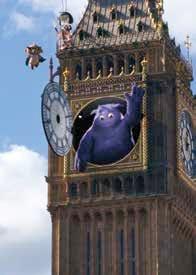
For the John Krasinski-directed movie starring Ryan Reynolds, we brought the magic from screen to the streets. Our videos ensured the film wasn’t just seen but experienced, catching every curious eye on its way.

KIEHL’S CGI PROJECT:
We set a new vision for Kiehl’s by redefining CGI, making it transparent instead of deceptive. Embracing authenticity, this bold approach took the internet by storm, gaining massive resharing and making waves across hundreds of accounts worldwide.
Founded: 2016
Ownership/holding group: Independent
Offices: Cairo, Dubai, Riyadh Number of staff: 11 craft@kijamii.com
Founded: 2022
Regional headquarters: Dubai Media City, UAE lora@mata-films.com www.mata-films.com
SERVICES: Film production, post-production, 2D and 3D animation, content adaptation and localisation, photography and event coverage
KEY CLIENTS: Netflix, Abdulatif Jameel, P&G, La Liga, Tiktok
Founded: 2007
Offices: Dubai and Los Angeles +971 4 341 1128 www.lightblueww.com info@lightblueww.com
SERVICES: Strategic consulting; live brand experience; film (creative, production, post-production, photography, XR, animation); creative services; digital experiences; original IPs
Founded: 2013
Headquartered: Cairo Head of company: Karim Mira, founder lizardvfx.com cairo@lizardvfx.com athens@lizardvfx.com
SERVICES: Editing; colour-grading; VFX Film
Founded: 2013
Regional offices: Cairo, UAE www.mbeans.tv Hello@mbeans.tv +20 111 600 0006
Having been created with creativity, passion and team work, Magic Beans has succeeded in establishing its own territory in Egypt over the past six years. Its scope of work is not restricted to TV commercials; Magic Beans has coproduced more than six TV series and more than three TV shows. In addition, Magic Beans co-produced one of the most trending TV Shows in the Middle East, SNL Arabia. Furthermore, Magic Beans produced the Gouna Film Festival, 1st edition.
Holding group: N2 Media
Headquartered: Dubai Number of staff: 12
Founded: 2001 hello@magnetconnect.com
SERVICES: Creative; film; photography; talent; production facilitation; locations; post-production
SERVICES: TVC and commercials production, video production, photography services, post-production, distribution
KEY CLIENTS: Mall of the Emirates (Majid Al Fu aim), Citroën Middle East (Stellantis), Fouquet’s Dubai, Dubai Ladies Club, Zurich Insurance Middle East
Offices: Dubai (HQ), Doha, London Number of staff: 10
Founded: 2019 hello@themedialinks.com
SERVICES: Content creation & production for social media; user acquisition for mobile and websites; e-commerce; websites
Owner: Hikmat Ghandour
Headquartered: Dubai, with office in London Number of staff: 5
Founded: 2015 hikmat@merakiproduction.com
SERVICES: Full-service photo and film production house
Owner: Leo Joseph
Headquartered: Dubai Number of staff: 18 Founded: 2011 info@milestudios.tv; leo@milestudios.tv
SERVICES: Videography; photography; location sound; digital imaging technicians; event coverage; live streaming; specialised in post-production services such as editing, colour grading, sound design and 2D & 3D animation
Headquartered: Dubai Number of staff: 8
Founded: 2008
SERVICES: Production of commercials; visual content; stills photography; animation
Headquartered: Dubai
Founded: 2015 nader@misfits.ae
SERVICES: Marketing strategy; creative campaign platform ideas; film scripts; directing; editing and grading; VFX; audio
Founded: 1998
Headquartered: Dubai
Number of staff: 20 info@filmworksgroup.com +971 4 457 3132 www.filmworksgroup.com
Driven by passion, Filmworks has carved a niche by specialising in a myriad of creative pursuits, fulfilling the unique needs and vision of our clients. Over the past 25 years, Filmworks has solidified its reputation through reliability and professionalism. In collaboration with our international partnerships, we remain adaptable and prepared to provide comprehensive solutions globally.
SERVICES: Filmworks is a multimedia content production company, servicing clients both regionally and internationally. Our expertise lies in TV commercials, digital content, brand narratives, documentaries, TV series, feature films, theme park entertainment and immersive interactive media.
KEY CLIENTS: Korean Netflix series (2025 release), Emirates, Qiddiya, SeaWorld Abu Dhabi, Maybach, Audi, Genesis, KIA, Saudia Airlines


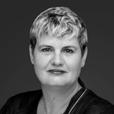

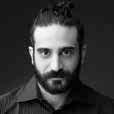

Holding Group: Horizon Holdings (IPG/NYSE)
Founded: 2017
Regional headquarters: Dubai
Number of staff: 7 www.fuel-content.com +971 3 544 4458 +971 050 112 0576 info@fuelcontent-mena.com
We are a specialist global production network for advertising, marketing, communications and brand experiences, executing work through an omni-channel approach. Our world-class production and creattive services capabilities, coupled with highly agile workflow and asset management technology, delivers exceptional quality at scale, brand control and savings for global businesses. We’re in Dubai, Toronto, Paris, Cape Town, Johannesburg and London.
SERVICES: Film and video production, 2D and 3D animation, stop-motion, VFX, colour grading, sound recording, sound design, sonic and music production, AR/ VR emerging technologies, events and on-ground activations, mobile app and game development, web and HTML development, advanced print management
KEY CLIENTS: Visa, Haleon, Total Energies, Lipton, Dubai Tourism, Boeing, and DHL
AWARDS WON: Multiple awards at the Cannes Lions Festival, LIA, LYNX, CLIO, The Andy’s, The One Show, MAD Stars, and D&AD.





Over the past year, there has been a growing demand for stories that emphasise local and regional experiences. And this trend is not just reserved for blockbusters or Netflix series – it extends to content that hits closer to home.
Brands are increasingly eager to tell human-centred stories: tales that focus on the people behind the scenes, the backstage moments, and the genuine impact their brands have on individuals.
The data supports it: when humancentred, content garners as much as eight times more engagement than content tailored for human needs. Storytelling, individual experiences and relatable content generate 30 per cent to 40 per cent more engagement in likes, comments and shares than generic, brand-centric posts. This trend is especially strong with younger audiences, where Gen Z and millennials are much more likely to interact with content that is personal and empathetic.
In 2023 and 2024, we saw a notable rise in successful regional storytelling. Dubai Tourism, for example, promoted the city through the voices of those who live, work, and visit there, highlighting local success stories and how Dubai’s innovative approach played a role in these journeys. Similarly, Dubai Holding produced a backstage docu-series that highlighted the work and dedication behind their companies’ successes.
Increasingly, brands are also adopting storytelling narratives that shine a light on the people within their organisations, highlighting their growth and how the region and the company have shaped their professional journeys.
While major media platforms and some Netflix productions still cling to stereotypical portrayals of the region –focusing on wealth, bling and luxury –many brands are choosing to highlight the true essence of the Middle East: they highlight the region’s diversity, beauty and cultural richness.
That said, there are some key questions that need to be answered.
HOW CAN CREATIVES AND BRANDS IN THE MIDDLE EAST KEEP THEIR STORYTELLING AUTHENTIC AND RELATABLE FOR LOCAL AUDIENCES WHILE APPEALING TO A GLOBAL MARKET?
To keep storytelling authentic, production houses and brands must truly understand the cultural nuances, values, and aspirations of their local audiences. This means engaging with local talent, involving community voices and integrating real-life experiences into the narrative. Authenticity is not about overgeneralising the region; it is about celebrating its diversity by highlighting a wide range of stories and perspectives.
When aiming for a global audience, the key is to highlight universal themes –such as family, ambition and resilience –while maintaining cultural specificity. By focusing on what is universally relatable but still rooted in local culture, brands can create content that resonates both locally and globally.
Collaborating with international platforms and creators can also help ensure the content is accessible and relevant to a broader audience, without losing its authentic character.
WHAT IMPACT HAS THE SHIFT TOWARD HUMAN-CENTERED STORYTELLING HAD ON THE PERCEPTION OF MIDDLE EASTERN BRANDS, BOTH WITHIN THE REGION AND GLOBALLY?
The shift toward human-centred storytelling has significantly enhanced the perception of Middle Eastern brands.
Within the region, it has fostered a stronger emotional connection between

Create Production’s Shona Royston calls on production houses to create content that is not just visually stunning, but also resonates the lived experiences in the region.
brands and their audiences, as consumers see their own experiences and values reflected in the content. This approach has helped brands build trust and loyalty, as they are perceived as more genuine, transparent, and in touch with the community.
Globally, this shift has contributed to a more nuanced and multifaceted image of the Middle East. By focusing on authentic stories that highlight the region’s diversity, creativity and humanity, brands have been able to counteract stereotypical portrayals and showcase the Middle East as a dynamic and culturally rich area. This has not only improved the global perception of the region but also positioned Middle Eastern brands as leaders in narrative-driven content that is both compelling and authentic.
HOW DO WE BALANCE THE ALLURE OF FLASHY, DRAMATIC PORTRAYALS OF THE REGION WITH THE NEED FOR AUTHENTIC, DIVERSE REPRESENTATIONS?
Balancing this tension requires acknowledging the appeal of dramatic
portrayals while prioritising authenticity and diversity. Creatives and brands can achieve this by consciously integrating both elements into their storytelling.
For example, while the allure of luxury and modernity can be part of the narrative, it should be framed within the broader context of the region’s diverse cultures, values, and everyday realities.
Educational initiatives that promote a deeper understanding of the region’s complexities among international creators and audiences can also play a crucial role. Encouraging collaborations between local and international talent can lead to more nuanced portrayals that combine visual appeal with stories that are grounded in real experiences.
The goal is to create content that is not only visually stunning but also resonates with the lived experiences of people in the region, offering a true reflection of its multifaceted identity.
Let’s not forget that the region’s biggest advocates are those who have lived or currently live here, both locals and expats. Every time there’s a post about the region on international platforms, you’ll find them in the comments, debunking myths and sharing their truths.
It just goes to show how important it is to stay true to what we’re so proud of as a region and to keep shining a light on our stories.
By Shona Royston, Group Head of Production at Create Production
Founded: 2004
Offices: Dubai, UAE
Number of staff: 11 info@montage.ae
SERVICES: film production, post-production, audio production, animation, photography, design
KEY CLIENTS: Roche, Hsad, Paramount, Cheil, Innocean, UX
Founded: 1979
Headquartered: Dubai www.motivatemedia.com connect@motivate.ae
From conception to distribution, Motivate Connect delivers! We help brands tell their stories through bespoke content creation across any media platform and device. From ideation to multi-lingual scripting and storyboarding, videography, photography, drone filming, animation and design and editing, our services cover every stage of the production process. Our specialised 360-degree approach integrates within your content strategy, and our distribution network extends the reach of your content across the Motivate Media Group portfolio including online, social media, influencer marketing, cinema and our partnerships with Emirates ICE and Discovery MENA feed. Through our partnership with Intermedia, your brand message can reach new television audiences with key distribution in households across the MENA region via the local Discovery feed.
Founded: 2022
Owner: Rouba Asmar
Office: Dubai, UAE rouba@moreish.productions
SERVICES: Beautifully crafted films
KEY CLIENTS: Peugeot, RAM, Red Sea Film Festival, Imkan, Apple, KAUST
Founded: 2015
Number of staff: 4 sadanand@movingstills.me
SERVICES: Production services for commercials and stills photography, postproduction, line production
KEY CLIENTS: Etihad, Landmark Group, Damac Properties
Founded: 2010
Office: Abu Dhabi, UAE info@filmsbynomad.com
SERVICES: Full end to end production services, documentary production specialists, content strategy, branded factual distribution
KEY CLIENTS: ADNOC, Warner Bros Discovery, Disney National Geographic, WAM, Emirates
Founded: 2016
Headquartered: Dubai Number of staff: 20 goodpeople.film +20 11 12077000 info@goodpeople.film
Good People has been named Production House of the Year at Dubai Lynx for the fifth time this year. But we’re not just the region’s most awarded production house, we’ve also won Independent Agency of the Year a couple of times. With an undisputed commitment to craft, and a quirky knack for creative, we’ve been turning briefs from good to great for over eight years now. Founded by two of the region’s most awarded creatives, Ali Ali and Maged Nassar, we are a global production house with hits for global brands such as Heineken, Diesel and Lavazza with offices in Cairo, Riyadh, Dubai and Athens.
SERVICES: Film production - in every which way - across the globe.
KEY CLIENTS: Everybody, and their mothers.
AWARDS WON: Sixteen Cannes Lions in seven years and just recently a silver lion for film in 2024. Twelve coveted D&AD pencils. Eight Dubai Lynx Grands Prix. Production house of the year (European Production house of the year) at the Golden Drum Awards, 2022.











Founded: 2004
Headquartered: Dubai. Number of staff: 8 www.kkddfilms.com +971 4 396 6999 kinjal@kkddfilms.com; kkddfilms@gmail.com
The KKDD Films team has been in the industry since 2004 with the expertise in film and post-production. We have two audio suites, two post suites and a colour-grading suite. We produce TV commercials, digital/online content, still photography and audio content for our agencies and clients in UAE, GCC, and West and East Africa. KKDD FILMS works with several local and international directors. Whacky Films Mumbai is our Indian company, catering to the Indian advertising market.
KEY CLIENTS: Emirates, Dubai Parks and Resorts, Dubai Duty free, Dabur, RTA.
SERVICES: TV commercials, digital/online content, corporate videos and presentations, still photography, radio commercials, music composition, podcasts, service production, television content
AWARDS WON: Cannes Corporate Media and TV Awards 2022: finalist; MENA Digital Awards 2019 – Best Use of Video: bronze, Best Use of Digital by Sector – FMCG: silver; Digital Studio Awards 2020 – Best Live Action Capture: shortlist; Effie MENA Awards 2019 – David & Goliath Category: silver




Founded: 2012
Headquartered: Dubai Number of staff: 10 www.kurve.me lea@kurve.me; marwan@kurve.me
A creative and CGI production studio, commi ed to delivering state-of-the-art creative campaigns and animated videos. Our expertise spans across CGI, photographic illustration, digital illustration, and post-production, making us a trusted partner for advertising agencies, production houses, and renowned local and international brands throughout the region. With cu ing-edge technology and a keen eye for photographic realism, we’re equipped to bring your ideas to life.
SERVICES: CGI, motion graphics, photographic illustration, digital illustration, post-production
KEY CLIENTS: VML, FP7 McCann, Havas Arabia, M&C Saatchi, Saudi Telecom Company, Imagic Production, Saudi Broadcasting Authority


Deja Vu’s Manaswi Gosalia shares his take on balancing timelines, budgets and creativity in the Middle East.

As an executive producer with over two decades of experience in the content production industry, I’ve had the privilege of working across borders, collaborating with teams from different countries, and witnessing first-hand the dynamic evolution of the industry on a global scale.
This international exposure has given me a unique vantage point when it comes to regional productions here in the Middle East, allowing me to apply global trends and learnings to our projects at Deja Vu.
But with that comes an awareness of the challenges our industry faces, and one of the most pressing challenges we need to address is the balancing act between timelines, budgets and output expectations.
In my years as a producer, I’ve seen the demands placed on content creators shift dramatically. Audiences today expect higher-quality content at a faster pace than ever before, driven largely by the explosion of digital platforms and streaming services. This has created an environment where the pressure to deliver cutting-edge, engaging content is constant.
However, these increasing expectations are not always matched by the necessary timelines or budgets.
This gap between what clients want, the time they’re willing to give, and the resources available is a challenge that we in the content production world grapple with every day.
Shift from looking outwards to inwards
One of the most exciting developments in the Middle East’s content industry over the past decade is the growing reliance on local talent. In the early years of the region’s production industry, we often looked outward for expertise, bringing in directors, cinematographers and editors from Europe, North America, or other established film industries.
This was a necessary step at the time, as the local infrastructure and talent pool were still developing, and we needed to learn from those with more experience. However, the last 10 years have seen a remarkable shift. The Middle East now boasts an ever-growing pool of homegrown talent – skilled filmmakers, writers, editors, and production crews who are not only meeting global standards but are also infusing their work with a distinct local flavour.
This is a massive leap forward, and it’s incredibly exciting to see the creativity and passion coming from young professionals in the region.
Global spotlight on the Middle East
An exciting development in recent years is that the world’s eyes are now firmly on the Middle East.
This region, which was once considered a secondary player in the global media landscape, has transformed into a creative hub, attracting the attention of international brands, celebrities and platforms. Some of the biggest names in the entertainment world are now endorsing products and events here, and the stakes have never been higher. This presents both a great opportunity and a significant challenge. With global attention comes the pressure to continually raise the bar. The content we produce must be worthy of the celebrities and brands endorsing it, while also resonating with a global audience. The challenge here is not just to meet expectations, but to exceed them – to create content that stands out on the world stage, while still maintaining our regional identity and voice.
With the growing global attention, the demand for quicker turnarounds has accelerated. In the past, it wasn’t unusual to have several months to execute a campaign or produce a film. Now, with the rapid
“REGIONAL PRODUCTIONS ARE NOW STANDING SHOULDER TO SHOULDER WITH GLOBAL CONTENT.”
pace of digital consumption and the endless content feed, deadlines have shrunk to weeks or even days. And while technology has made many aspects of production more efficient, it has also raised the bar for production value.
High-definition visuals, seamless editing and complex CGI are no longer optional – they’re expected. But the crux of the issue lies in the fact that while timelines have shortened, budgets often remain stagnant or, in some cases, are even shrinking. The tricky part is balancing this new reality with the expectations for top-tier quality. It’s a tightrope that requires careful navigation.
The more compressed the timeline, the more resources are needed to achieve the desired result – whether that’s in terms of crew size, overtime or post-production facilities.
At Deja Vu, we’ve always approached this challenge with a mindset of finding the optimum balance. We work diligently to understand our clients’ needs, offering solutions that respect their budgetary constraints while pushing the creative boundaries. But it’s not always easy.
Sometimes, the expectations from a project don’t align with the available resources. When that happens, it’s our responsibility to have an honest conversation with the client, guiding them toward decisions that ensure the final output doesn’t suffer in terms of quality.
A growing trend I’ve noticed over recent years – and this is something that concerns me – is the decreasing sense of ownership some production companies take in the projects they work on. Too often, production houses are treated, or even treat themselves, as mere suppliers rather than true collaborators. In my view, this is a short-sighted approach.
Content production is a deeply collaborative process. For a project to succeed, everyone involved – from the client to the production team – needs to take equal ownership of the final product. This approach, however, is becoming increasingly rare. Many companies now adopt a more transactional mindset, which can lead to a lack of creative ownership and, ultimately, weaker output. When you’re just fulfilling a contract, you lose sight of the bigger picture – the art of storytelling, the emotional resonance with the audience, and the pride in creating something truly memorable.
Despite these challenges, I am incredibly optimistic about the future of content production in the Middle East. Our industry has come a long way in the last decade. Regional productions are now standing shoulder-to-shoulder with global content, and the technical and creative expertise in the region is world-class.
There’s no doubt that the Middle East is on the cusp of becoming a major player in the global content landscape. The challenge of balancing timelines, budgets, and output is a tough one, but it’s not insurmountable. As long as we, as an industry, continue to nurture our young talent, push for creative ownership, and maintain a balanced approach to production, we will not only meet global standards but exceed them.
The future of Middle Eastern content production is bright, and the only way is up. The world’s eyes are on us, and the expectations are high. It’s up to us to not only meet but surpass those expectations, all while ensuring that the next generation of Middle Eastern creatives is ready to step up and take the region’s content production industry to even greater heights.
By Manaswi Gosalia, Executive Producer, Deja Vu
Founded: 2019
Holding company: Augustus Media Holding weareaugustus.com hello@weareaugustus.com
Odeum, the in-house content studio of Augustus Media is designed to produce new media formats, in real time for clients that live across our brand channels.
SERVICES: Video; social; wri en; content; events; audio; online advertising
Founded: 2018 hello@phenomena-productions.com
SERVICES: Production for TV commercials; digital content; music videos; short films
Co-owners: Khalid Alqahtani, Mohammed Al-Saleh
Offices: Riyadh, Al Khobar
Number of staff: 32
Year founded: 2019 info@proeffect.sa
SERVICES: Promotional videos; documentaries; coverage; motion graphics; event on-screen graphics
Founded: 1977
Offices: Dubai, Beirut and Riyadh Number of staff: 25 marwan@rahbaniproductions.com
SERVICES: TV commercials, Corporate/Documentary films, Music Videos, Music Composition and Design, Graphics and Animation
Founded: 2023
Principal partner: Mohammad Irfan Dar Number of staff: 7 you@redstonefilms.in; irfan@redstonefilms.in
SERVICES: Creative strategy, brand films, human interest films, animation (2d, 3d, motion graphics), video production
KEY CLIENTS: UNICEF, Microsoft, National Geographics Channel, International Centre For Research On Women Asia (ICRW), Government Of India
Founded: 2019
Ownership/holding group: Alain Abi Khalil
Offices: Dubai & Riyadh
Number of staff: 6 Info@rush.ae
SERVICES: TV commercials, films, post-production, photoshoots, servicing
KEY CLIENTS: Nissan Middle East, Pladis, Toyota, Saudia, Americana
Founded: 2009 Headquartered: Doha Number of staff: 50 info@resolutionfilms.tv
SERVICES: Film production; film & crew equipment hire; market research (qualitative & quantitative); branding, strategy & full advertising
Founded: 2012 HQ: Dubai Number of staff: 15+ action@salukimedia.com
SERVICES: Production, documentary films photography, content production –audio visual, animation, television and film
KEY CLIENTS: ADNOC, DMG Events, Disney Middle East, Al Faisal University, Borouge
Founded: 2011 7production.net pierre.tabet@7production.net
SERVICES: Video production; film and broadcast services; studio facilities
KEY CLIENTS: MBC; Al Jazeera; Imagic; OSN; Dubai Media; Abu Dhabi Media; TwoFour54; BeIn Sports; IEC In Sports; Studio Vision; Talpa
Founded: 2016 Headquartered: Dubai Zaib@shadaniconsulting.com www.shadaniconsulting.com
SERVICES: Professional video production including corporate videos, commercials, documentaries, interviews and training videos
Founded: 2003
Headquartered: Dubai shadow@shadowpp.com +971 4 340 7713 shadowpp.com
SERVICES: Photography; production; aerial photography/videography; postproduction; timelapse and 360-degree VR; studio rental
Founded: 2012
Office: Dubai
Number of staff: 40 wassup@ssupworld.com
SERVICES: Production (scripted, non-scripted, digital content, TVC, social content – Reels/Tiktok)
KEY CLIENTS: Tim Hortons, Kitopi, Right Bite, Dar wa Emaar (KSA), Empire Cinema SA, Saudi Tourism Authority

Founded: 1987
Offices: Dubai, New York, Riyadh, Colorado, Mumbai, Abu Dhabi
Number of staff: 32 www.liwa.tv
+971 4 457 2332 business@liwa.tv; hello@liwa.tv
Liwa Content.Driven is in the business of communication for almost four decades –having transitioned over the past decade into a formidable video, film, and content marketing agency. We are uniquely positioned as the region’s only hybrid agency that merges the strategic and creative expertise of a traditional agency with the technical capabilities of a high-end production house. We offer a comprehensive suite of video production services, from live-action shoots, crafting stories through stock-based videos to dynamic animations, catering to leading local, regional, global brands and network agencies. By combining these services under one roof, we deliver unmatched cost efficiencies and economies of scale, creating compelling visual content that drives results and engagement with audiences.
SERVICES: Creative concept development, films (commercials and long form), branded content, production and post-production services, photography, creating tech solutions for innovation, animation and VFX
KEY CLIENTS: Publicis Groupe, Leo Burne , Saatchi & Saatchi, Emirates NBD, Emirates Islamic Bank, Shell , Emirates Airlines, Bayut, AKQA, G42 and M42, Dubai Chamber
AWARDS WON: Cannes, Dubai Lynx, Effies, New York Festivals, D&AD & Midas & Effies – Most Effective Independent Agencies 2023
Founder and Executive Producer

HOW HAS THE ADOPTION OF MORE SOPHISTICATED PRODUCTION TECHNIQUES IMPACTED CLIENT EXPECTATIONS AND YOUR WORK IN 2024?
As the demand for content intensifies, production needs to be approached with efficiency and agility with a lens of what’s doable in defined timelines. Early collaboration with agencies and clients allows us to accurately define budgets, benchmark creative output, and realign concepts to fit both financial constraints and communication goals while being strategic at the core—whether animated, mixed media,
tech-driven solutions or live action. We leverage AI tools for process-driven productivity, and sharp thinking to ideate and produce at scale while ensuring engagement is the key driver. By continuously refining workflows and harnessing creative potential, we push the bar to stay ahead of industry trends and consistently deliver fresh, impactful content within tight timelines.
HAS THE GROWING FOCUS ON THE LOCALISATION OF CONTENT PRODUCTION INFLUENCED PRODUCTION STRATEGIES CONSIDERABLY?
The demand for content that truly connects with local audiences is soaring. We prioritise hyper-localisation, using deep audience insights to craft relevant and impactful stories. By tapping into local talent, authentic settings and culturally rich narratives, we ensure our content feels genuine and deeply rooted in local culture. Our agile approach is driven by strategic partnerships with local production houses, treating them as collaborators, not competitors. Through a blend of innovation, insights, and seamless collaboration, we consistently meet and exceed our clients’ evolving needs.
WHAT ARE THE MAIN CHALLENGES THAT NEED TO BE ADDRESSED IN THE INDUSTRY?
The industry faces significant challenges in maintaining competitiveness, from balancing high-quality output with shrinking budgets and timelines to navigating complex local regulations. The battle for top local talent is intensifying, and fostering diversity within
LEADERSHIP PANEL






teams is crucial. To stay ahead, production houses must be agile, adapting to shifting market demands while delivering content that resonates across platforms and diverse audiences. We’ve addressed these pressures by integrating creative capabilities directly into our production house, offering a streamlined, end-to-end solution. This holistic approach— from concept to execution—ensures consistency, innovation, and strategic value, positioning us as a trusted partner able to meet the industry’s evolving demands while exceeding client expectations.
HAS IT BECOME HARDER FOR PRODUCTION HOUSES IN THE REGION TO ENSURE LONG-TERM SUSTAINABILITY AMIDST AN INCREASING FOCUS ON PROJECT -BASED WORK?
Project-based work has always been at the core of our business, what sets us apart is the ability to understand & solve the communication objectives of clients and agencies. In today’s competitive landscape, it’s not enough to simply deliver but work as production partners who are flexible & adaptable. Our differentiator lies in the ability to go beyond the basics of production and deliver creative production through agility. By blending creative insight with production expertise, we offer much more than just execution—we provide solutions that enhance content across various media and formats. This keeps us at the forefront, building strong, lasting partnerships with clients & agencies who leverage our capacity to think creatively and deliver with precision while understanding the task at hand.






Founded: 2013
Headquartered: Dubai
Number of staff: 57
www.lps-me.com
+971 4 546 4465
+971 55 926 2301 partner@lps-me.com
LPS is a decade-young, fiercely independent communications ecosystem headquartered in Dubai with a presence in KSA, USA, Egypt, and Jordan. It specialises in content production for digital and social media platforms, including video storytelling, gaming, podcasts, and live formats. Its in-house studio pioneers new-age media strategies, offering innovative solutions for brands across sectors like government, banking, beauty, food, and technology – all driven by courageous technologists, strategists, and content creators.
SERVICES: Integrated campaigns, video production, social media management, TikTok and Reels strategy and management, influencer campaigns, digital media planning and buying, gaming, and game streaming campaigns.
KEY CLIENTS: Dubai Tourism, Abu Dhabi Islamic Bank, Dolby, Mashreq, Apparel Group, Liva Insurance, Carrefour KSA, Malabar Gold & Diamonds, Wasl Group, Jollibee.
AWARDS WON: Campaign Middle East Agency of the Year 2022 (Social Media Agency of the Year); Campaign Middle East Agency of the Year 2023 (Social Media Agency of the Year); Campaign Middle East Agency of the Year 2023 (Production Team of the Year); Ne y Award 2024 (Best Use of Video in Social Media).

Founded: 2016
Holding group: Publicis Groupe
Regional headquarters: Dubai Number of staff: 28 www.prodigious.com +971 4 3676100 info.mea@prodigious.com
Prodigious is the agency-agnostic, global production platform of Publicis Groupe Middle East. Prodigious offers full-fledged production solutions to support all our clients in visualising their creative ideas. We strongly believe in the power of ideas and care, most importantly about the craft and creative integrity of our clients’ projects. With offices across UAE, Lebanon and KSA, our team remains at the forefront of industry innovations and the latest technology to provide solution-driven approaches. We prioritise collaborative client relationships alongside complete transparency across the board. We have established successful partnerships with a variety brands, enabling us to produce a multitude of work across different production scale.
SERVICES: Film production, full post-production services, animation and CGI, photography and retouching, live streaming, 360 virtual experience
KEY CLIENTS: Saudia Airlines, General Motors, e&, Nivea, Visa, McDonalds, P&G, Nestle, Home Centre, Ferrero, ADNOC, CBUAE, NEOM
AWARDS WON: #1 Production Agency of the Year at Dubai Lynx













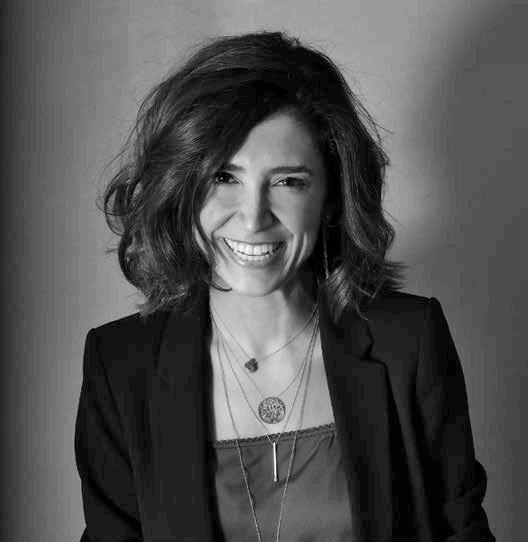
The world has changed. We’ve changed how we consume media. Our old captive audiences have long gone. This, in turn, has changed what we produce and how we produce it.
In this world of fast-scrolling, ad-skipping and smallscreen-watching, it’s too easy to learn the wrong lessons. To believe that the best production strategy is to lean in and focus on short-form, short-lasting, costeffective content.
But no, no-one ever built a brand with ‘cheaper, faster, shorter’. And yet that is what we all – from clients to agencies to production companies – are faced with today: smaller budgets, faster turnarounds, shorter forms of content.
I believe the winning strategy is found in the opposite direction. The winning strategy is to commit to quality. Because in a world where we consume so much, so fast, the only thing that stands apart is quality. Easy to say, hard to do? Not really. Production-wise it’s easier than ever.
Moreish Productions’ Rouba Asmar says that in a world of shrinking budgets, there’s a need to go beyond ‘advertising’ to make quality productions that sell.
“FIND IDEAS THAT HAVE ROOM TO BREATHE. TOO OFTEN THE IDEA IS TOO BIG FOR THE BUDGET AND WE ARE TASKED WITH FINDING SHORTCUTS TO MAKE IT WORK.”
every day, the results are clear and obvious. This is the work that gets watched, shared. Content people seek out, don’t skip, content that blurs the lines between advertising and entertainment. As the best advertising always has.
Maya Angelou said it best: “I’ve learned that people will forget what you said, people will forget what you did, but people will never forget how you made them feel.”
Emotional connection is created through the craft. It’s skill and attention to detail. It’s how idea, visuals, and sound come together to tell a powerful story. Craft is the hundred little things: finding the right director with the right taste, editing, soundtrack, lighting, casting, art direction, the smallest details in the script.
It’s not hard to put a film crew together. it is hard to put the perfect film crew together. The combination of all of these elements, when they are the right ones, is what takes an idea from being just ‘good enough’ to something truly memorable.
If you’re able to bring that together, then today is your lucky day. AI is here to amplify it all. As a tool within the production workflow, it is game changing.
But again, there is the risk that we might learn the wrong lessons here. That we focus on how good it is at making things smaller, faster and cheaper. When we should be focusing on how it allows us to explore new things in bigger ways than ever. So, let’s fight and make the case for quality at every turn. Let’s frame AI as a creativityexploder not budget-shrinker.
The truth is that quality doesn’t have to cost the earth. It never has. It takes a big creative idea with emotional heft. Then it is down to care and attention to detail, craft and taste. The simple trick here is to match creative to budget. Find ideas that have room to breathe. Too often the idea is too big for the budget and we are tasked with finding shortcuts to make it work. That never goes in favour of quality.
When we talk about quality, we mean creating a genuine emotional connection with the audience. Great ads do more than just tell you about a product –they make you feel something, whether it’s excitement, joy, or even empathy. That’s what makes them stick in your mind long after you’ve seen them.
For those that commit to this, and we all see the ones that do
It’s often not a budget problem but an idea problem. No idea can dance if it is squeezed into a too-tight pair of jeans. So, engage with production earlier, if only to create ideas that truly fit.
In summary, we should not just make advertising, but aspire to make quality entertainment that sells. Not things that grab a split-second of attention, but things that capture and hold imaginations. Things people want to watch. Things they will not skip after five seconds. Things they’ll seek out. Things they’ll share. Things that don’t hit them over the head with blunt messages. But short stories that play with complex emotions. Things built with craft and taste and style and quality.
And it’s not that hard. Have an idea. Give it love and care. Use AI to amplify. And let’s see what’s possible.
By Rouba Asmar, Executive Producer, Moreish Productions

Founded: 2009
Offices: UAE, KSA, Lebanon, Egypt
Number of staff: 328 www.social-eyez.com +971 04 356 4100 info@social-eyez.com; bd@social-eyez.com
At SOCIALEYEZ, we are creative strategists, blending insights, creativity, and strategy to deliver impactful results. For 11 years, we’ve transformed complex challenges into actionable solutions across the UAE, Lebanon, Egypt, and KSA. By leveraging strategic thinking and data-driven creativity, we craft purposeful initiatives that resonate and drive success for our clients. From concept to execution, we ensure every idea sparks meaningful results.
Specialisims: Social media insights, strategy development, influencer campaigns, content creation, animation, CGI and AI integration, live event storytelling, pre-post production (3D, colour granding, VO studio recording), film & video production, documentary, creative production, scripting and storyboard creative direction, TV commercials, editing and mastering
KEY CLIENTS: RTA, ENOC, Du, Ministry of Health & Prevention, Dubai Culture, Gov Games, Canon, Emirates NBD
AWARDS WON: Shorty Awards, MEPRA, Dubai Lynx
Founded: 2001 in Dubai, 2024 in Riyadh
Offices: Riyadh, KSA; Dubai, UAE; and Beirut, Lebanon
Number of staff: 12 h ps://vipfilms.com/ +971 4 391 4789 hello@vipfilms.com vipdubai@vipfilms.com
Founded: 2013 www.stokedfilms.com +971 58 566 3247; info@stokedfilms.com
SERVICES: Creative production; film production; post-production; audio production; TV and digital content; documentaries; photoshoots; feature films
Founded: 2007 HQ: Dubai
Ownership/holding group: Shelley Frost Number of staff: 25 info@thefridge.me
SERVICES: Live entertainment, cultural events, event design & production, talent booking & concert promotion
Founded: 2014
Headquartered: Dubai Patrick@thestudio96.com
SERVICES: Production of commercials and corporate films; CSR campaigns and content creation





We are VIP Films. Welcome to our world where collaboration fuels our creative spirit. Our production company is where seasoned brilliance meets raw talent, resulting in extraordinary ideas that burst to life on screen. With a rich heritage spanning three generations and over four decades of unmatched expertise, we’ve assembled an exceptional team of individuals who bring their unique skills and visions together. Like a symphony of imagination, our talented minds blend their diverse backgrounds, perspectives, and talents to craft captivating works that resonate with audiences worldwide. With each project, we push the boundaries of what’s achievable, creating unforge able experiences that leave lasting impressions on hearts and minds. Now also in Riyadh, we are closer to our Saudi clients and shoot all over KSA with the same care and a ention to details that make be er films.
SERVICES: Film production and servicing
KEY CLIENTS: Toyota, Hilton, SAIB, Lego, Masar, Zain, Ministry of Health, Jaguar, Range Rover, Kinder, UTV, SRMG, Oppo, Qatar International Bank, ADCB, Nakheel
AWARDS WON: Sound Of the Flag: 2023 Lynx Gold – Radio & Audio Award; Al Riyadiya Cannes Festival Shortlist 2023; Lego Ramadan 2022 Effie Silver Award; Riyad Bank Campaign Fraud: Shield of Honor from Riyad Bank May 2022; LEGO: ADSports TV Idents: PROMAX BDA Europe 2016 Gold; Sharjah Tourism Film: International Tour Film Fest Bulgaria’s Special Award of the Team 2016; Dubai Lynx 2015 Shortlist – Film Craft Achievement in Production; Toyota TRD: Dubai Lynx 2015 Shortlist - Film Craft Cinematography; QNB Achievers: Dubai Sports Bumpers.




Founded: December 2021
Headquartered: SHAMS, Sharjah Media City, UAE www.vertigofilms.ae
Vertigo Films is a UAE boutique film house that has quickly established itself with its bold approach to short-form and entertainment films. As the rebels of the video-making world, our passionate team blends creativity with technical expertise to push storytelling boundaries and deliver content and films that resonate long after the credits roll.
Key Clients:

Services Offered:


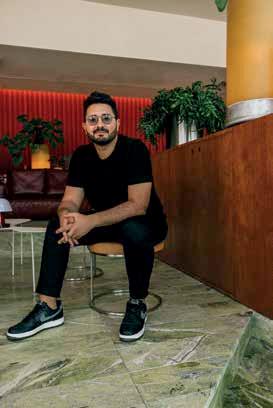

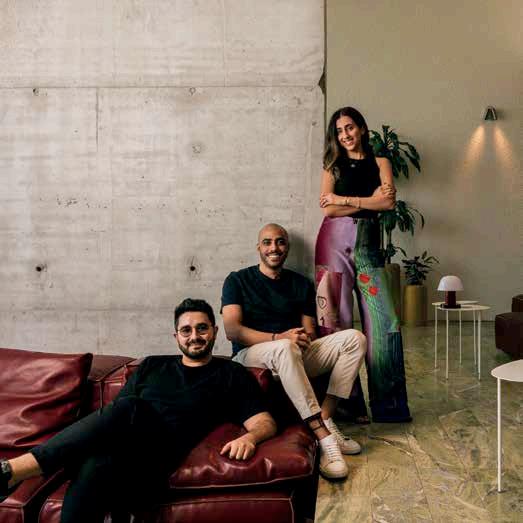

At Vertigo Films, we’re rewriting the script on traditional production. Picture a boutique film house where seasoned filmmakers with diverse backgrounds come together, sparking creativity in every corner. That’s Vertigo Films – mavericks of the video production world. We don’t just make films; we create lasting, impactful experiences for brands and audiences alike.
Founded in December 2021 by filmmakers Adnan Sharawi and Rawad El Hachem, Vertigo Films blends passion with experience. Adnan, with a Master of Fine Arts and a decade of experience in cinematography, directing, and editing, draws inspiration from the everyday. Rawad, who began as an indie filmmaker and rose to head production at a digital agency, leads with award-winning work recognised across the region. In 2024, Maha Moussa joined as a partner, bringing her expertise from TikTok and Shahid, where she shaped production and led creative pitches.
Together, they’ve crafted a powerhouse of talent, dating back to 2019 when they first teamed up at a local agency — an experience that set the stage for their creative reunion and now drives Vertigo Films' success. That’s why we’re here — to bring your vision to life and leave a lasting impression. Ready to connect? Let’s make magic on screen.
Ownership: Talent Holding
Offices: Dubai, Riyadh, Beirut, Cairo, Casablanca info@thetalkies.com
SERVICES: Production, post-production, TVCs, branded content, film and TV development
Headquartered: Dubai Number of staff: 20 Founded: 2011 info@ti22films.com
SERVICES: Film and video production; animation; social media management
Founded: 2018
Headquartered: Dubai Number of staff: 4 www.tomorrow.film antonio@tomorrow.film; rula@tomorrow.film
SERVICES: Production and post-production of TV commercials and high-end digital content
Founded: 2009
Head offices: Beirut, Dubai, Riyadh Number of staff: 8 www.wprod.tv info@wprod.tv
Headquartered: Dubai www.tomorrow.film antonio@tomorrow.film; rula@tomorrow.film
SERVICES: Production and post-production of TV commercials and high-end digital content
Headquartered: Sharjah Number of staff: 4 comms@urbanedgefilms.me
SERVICES: Scripting and storyboard; creative direction; editing and mastering; animation; VFX
Founded: 2018
Headquartered: Dubai www.verge.vision hello@verge.vision +971 4 361 8821
SERVICES: TV and feature films, commercials, documentaries, digital content and new media including VR and AR.
Wonderful Productions is a professional production house uniting local and international talents across various disciplines. It is dedicated to delivering unforge able experiences, from production to the final result. The team is commi ed to impressing clients through hard work, dedication, and valuable contributions from each department. Its vision is to elevate the production industry by blending top-tier talent with the best resources for flawless results.
SERVICES: TV commercials production, photography and film production services.
KEY CLIENTS: FP7 McCann Group, TBWA/RAAD, Impact BBDO, Publicis Groupe, VML.
AWARDS WON: Dubai Lynx Awards 2022 | media Silver - Liamo “ Pasta Assassins”; Dubai Lynx Awards 2019 | Film Craft Silver - Reheat “ Explained Take 2”; MENA Cristal Awards 2014 | Production, Best picture - Bank Audi “ Make it big out of li le”; MENA Cristal Awards 2013 | 3 Gold 2 Silver 2 Bronze - Tammana “ Christmas in September”; Dubai Lynx Awards 2012 Gold Lynx - Chief 7alak TV Category; MENA Cristal Awards 2012/2011 Grand Crystal - Corporate Bank Audi; Dubai Lynx Awards 2011 Bronze Award - Corporate Image | United We Stand; The Gemas Effie Awards MENA 2011 Gold Award | Bank Audi Loubnani.
















Founded: 2018
Headquartered: Riyadh, Saudi Arabia
Number of staff: 14 www.westudio.film +966 55 633 6209 info@westudio.film
World Edge is a Saudi-based production company that empowers brands, companies and individuals, to create and produce their greatest content and amplify their stories, in order to entertain and inspire viewers, audiences, and communities across the Middle East, with the use of the latest production technologies.
SERVICES: Video and movie production, social media content creation and production, media and event coverage, production services, photography
KEY CLIENTS: Misk Foundation, Szayal Commission for Riyadh City, King Fahd Causeway Authority, Bank Alinma, Arab National Bank (ANB), Ensan, Hawi, MAWANI – Saudi Ports Authority, Tariq Abdulhakim Center (TAHC)
AWARDS WON: Viddy Awards 2022 [Client: IMCTC/Anti-terrorism Campaign: Stop It!]





MAKRAM FATA
Managing Director

INDUSTRY SNAPSHOT
WHAT ARE PRODUCTION HOUSES FOCUSING ON TO STAND ABOVE THE REST IN A COMPETITIVE MARKET?
Future-proofing the production process. Let me explain: In our digital age, where social media is king, we’ve identified the need to expand beyond traditional production and offer comprehensive services, adapting to new market and industry demands. Our priority is crafting engaging narratives that resonate with audiences, especially on online platforms where engagement metrics are crucial.
WHAT ARE THE MAIN CHALLENGES THAT NEED TO BE ADDRESSED IN THE INDUSTRY?
The primary challenge is reimagining the production process in the age of AI, new technologies and social media. While these tools are powerful, human creativity and insights remain irreplaceable, providing a unique edge for original content. We recognise that, without transformation, companies like ours risk becoming industry dinosaurs.
WHAT MEASURES ARE BEING TAKEN TO ENSURE THAT THE CONTENT PRODUCED RESONATES WITH RESPECTIVE
AUDIENCES IN SUCH A FAST-PACED WORLD OF EVOLVING DEMANDS?
Today’s content needs to be produced for new formats and screens. Film durations have changed, attention spans have shortened, and people want something original. We focus on creating content for these new formats, recognising these shifts in viewer behaviour. Additionally, we educate our clients, taking their ideas, values, and concepts, and adapting and optimising them for this fast-paced, evolving digital landscape.
HAS THE GROWING FOCUS ON THE LOCALISATION OF CONTENT
PRODUCTION INFLUENCED PRODUCTION STRATEGIES CONSIDERABLY?
Absolutely. As a Saudi hybrid production powerhouse, we understand the importance of localisation. It’s crucial to produce content that reflects our culture’s richness and resonates with our audience. This understanding significantly influences our production strategies. By doing so, we not only meet the expectations of our local audience but also showcase the unique aspects of our culture to a broader, global audience.
Holding group: Multiply Group
Headquartered: Abu Dhabi
Founded: 2001 marketing@viola.ae
SERVICES: Film production and post-production, audio production, 2D & 3D animation, digital content
Founded: 2016
Headquartered: Dubai Number of staff: 10 info@whatif.ae
SERVICES: Production; post-production; creative concept development
KEY CLIENTS: Prime Minister’s Office, UAE Government Media Office, Dubai Department of Economy and Tourism, VML, Expo City Dubai,
Head of company: Malek Al Hamami Headquartered: Riyadh, Saudi Arabia info@whizzfilm.com
SERVICES: Production, creative production, production servicing
KEY CLIENTS: Konoz SA, Al Wallan Group, NCNP, NDF, MEWA
Headquartered: Dubai Number of staff: 4 hello@wildmedia.com www.wildmedia.com
SERVICES: Digital content, documentaries, commercials, campaigns, exhibitions, corporate films, events
Founded: 2009 Offices: Abu Dhabi, Dubai, Canada Number of staff: 40 info@zianetwork.com
SERVICES: Film production, advertising, marketing, digital services, social media content and branding
KEY CLIENTS: Dubai Police, Ministry of Interior, Abu Dhabi Pension, Tadweer, TDRA
Founded: 2013
Holding group: Aidem Media
Headquartered: Dubai info@zooxel.com
SERVICES: Commercial and feature film production; 3D Animation; cinematics; virtual production

The production industry in the Middle East and North Africa (MENA) region is undergoing a remarkable transformation, propelled by a rich tapestry of cultures, rapid technological advancements and evolving consumer preferences.
As the region’s markets continue to expand and diversify in this dynamic environment, we find ourselves navigating a complex landscape rife with both significant challenges and unprecedented opportunities.
The MENA region is a mosaic of languages, cultures, and dialects, which presents a formidable challenge for content creators. A marketing strategy that resonates in Saudi Arabia may fall flat in Egypt or the UAE. This cultural diversity necessitates tailored communication approaches, underscoring the inadequacy of a ‘one-size-fits-all’ model. The solution requires highly tailored communication strategies that consider cultural nuances, which vary significantly from one country to another.
Furthermore, the digital revolution has fragmented the platforms and formats through which audiences consume media. Today, an ad production is not just a ‘film’; it is rather a collective mix of assets that cater for multi-channel and hyper-targeting techniques. This diversity demands a robust and flexible production strategy to manage the sheer volume of production deliverables needed to suit different formats, platforms, countries, dialects, and audience segments.
While there is a need for more deliverables of the finest quality, resources and timelines are often moving in the opposite direction. And with the fierce global competition producing cutting-edge creative productions that raise clients, and end consumer, expectations, there is an inevitable need for smart, fast and cost-efficient solutions.
Adding to the complexity, closing the loop on campaign impact measurement with precision – whether in terms of the overall brand health, campaign impact on sales, or even on the use of celebrities or influencers – remains a work in progress.
Accuracy is notably higher for fully digital campaigns, but less consistent in broader marketing strategies.
Moreover, the marketing mindset, as well as production crews, in the region has not fully embraced data and technology. Efforts to foster this mindset are ongoing, and while there are positive shifts, the full transition is yet to be realised.
Kijamii CEO Bahy Aboelezz explores uncharted territories in the MENA production industry.

Despite existing challenges, emerging trends, particularly advanced technologies and AI, present significant opportunities for innovation in production. Augmented reality (AR) is creating immersive ad experiences. Deepfake technology is allowing personalised and dynamic ads. And AI is just magic! Streamlining workflows, boosting efficiency, and expanding creative possibilities; from AI-generated scripts, storyboards, voice-overs, subtitles, dubbing to virtual productions and video-from-text, fully AI-generated ads. These advancements are reshaping the industry, offering new ways to innovate and meet the demands of today’s market. While AI offers exciting possibilities for efficiency and creativity, it also raises significant legal, moral, and ethical questions that are being addressed
globally. The industry must navigate these challenges carefully to leverage AI responsibly and effectively.
Another opportunity is represented in MENA’s high media consumption and unique cultural attributes which present a fertile ground for industry players willing to deeply engage with and understand these markets.
Furthermore, the region is home to exceptional talent in the creative and production sectors, with the potential to not only serve local markets but also expand beyond, positioning MENA as a hub for exporting creative expertise globally.
Kijamii has embraced this evolving landscape through a fully integrated, data-driven, and culturally resonant approach. Since establishing our in-house production capabilities in 2016, we have remained agile, constantly testing, learning, and adapting to meet the diverse needs of our clients.
Our expansion into post-production in 2019 allowed us to handle the rising demand for platform-specific content, and our consumer insights studio,
launched in 2021, enables us to integrate data into our campaigns, refining our ability to measure impact and deliver meaningful results. Our all-under-oneroof model provides speed, precision, cost efficiency, and creative control, ensuring we maintain oversight and deliver with exceptional quality.
Our campaigns, whether for global or local brands, are built on deep insights into audience behaviour and cultural trends. This ensures that the creative content we produce not only delivers measurable impact but also forges genuine connections with consumers.
As the production industry in MENA continues to evolve, and with the brilliant talents within our region, the potential for growth and creative innovation is immense. Industry professionals have an opportunity to push the boundaries, explore uncharted territories, and set new standards for excellence.
By embracing technology, fostering cultural sensitivity, and adopting data and technology on strategies, they can meet the diverse demands of the region while setting a new benchmark for creative excellence.
More than 150 industry leaders gathered for a morning of insightful keynotes, informative panel discussions, and productive networking, as well as high-profile meet-andgreets at the Campaign Breakfast Briefing: The Future is Now event held at the Grand Plaza Mövenpick in Dubai Media City on Friday, 13 September.
The event, which turned the spotlight to “futuristic” themes claiming their space in the present within the realm of brand, marketing, creative and advertising, began with a welcome speech by Nadeem Quraishi, Publisher at Campaign Middle East. The publication’s editor Anup Oommen then stepped up to offer the chair’s opening remarks, setting the scene for an eventful morning of keynotes and panel discussions.
In his speech, Oommen dissected Google’s thirdparty cookie pendulum, first-party data and clean rooms, the very real concerns around brand safety and ad fraud, the shift from creativity to creative effectiveness, and the move towards better pricing, measurement and outcome-based models.
Wassim Mneimneh, the Managing Director at MiQ MENAT, kicked the official event off with a keynote speech, offering a deep dive into the future of digital advertising, talking about data signals, the growing opportunity within Connected TV and YouTube, and the ‘destroyer’ and creator that is AI.
“We’re getting better TV data every single day, which is helping us understand audience behaviour more clearly every day. In parallel, there’s a rapidly growing supply of streaming TV inventory in the region. This is where it gets exciting. When you buy inventory programmatically, we unlock powerful capabilities. For
starters, we can apply frequency capping; we don’t have to bombard our users. We also steer budgets towards targeting specific apps, regions, and even particular audience segments that may have been missed by traditional TV,” Mneimneh said during his keynote.
The first panel sessions, conducted in partnership with Publicis Groupe, highlighted the evolution of search and user behaviour in our modern era, and how it has evolved from simple, isolated channels to a more diversified and sophisticated ecosystem.
Moderated by Publicis Media’s Vanessa Abi Faris, the panel welcomed on stage Google Ads’ Marie de Ducla, Amazon Ads’ Wassim El Jammal, Nestlé MENA’s Utku Hasdemir, and Publicis Media’s Richard Hartley, who shared interesting details on how search and user behaviour have evolved in an ecosystem that has welcomed voice, image, and ChatGPT-driven searches.
Taking an example from the beauty industry, Wassim El Jammal, Amazon Ads’ Head of Agency Development – MENAT, said, “Customers currently come to Amazon to look for ingredients, not just products or brands. They search for glycolic acid, vitamin C serums, etc. These kind of insights are extremely important to us, because zero per cent of the customers who come on Amazon start their journey from the search bar. So, as a customer-obsessed company, this helps us evolve our search proposition to move beyond just promoting a certain product to promoting multiple brands and products, as well as their ingredients.”
Nestlé MENA’s Head of Digital Utku Hasdemir said, “I think an integrated or holistic approach to search and user behaviour optimises all aspects of a brand’s online presence, maximising visibility, engagement
and convergence across search engines and media platforms. With AI gathering and analysing vast amounts of consumer data, it allows us to gain deeper understanding of consumer preferences, informing our search strategies, and ultimately helping us deliver more targeted, personalised and relevant campaigns.”
Richard Hartley, Head of Paid Search at Publicis Media, said, “I think there are so many different ways that people can search, beyond just text-based searches, nowadays, but also with images, voice, and even ChatGPT prompts, which people are becoming comfortable with using. So, as a starting point, on an operational front, just getting these into an interface that can help us look at this data, analyse it, and potentially automate from would be a good step.”
Marie de Ducla, Sales Lead – Retail, Travel, Government, Consumer Goods & Services at Google Ads, said, “It’s not just important to optimise search and user behaviour; it’s critical. As consumers become multimodal in their searches – across text, voice, images, and generative AI tools like Gemini – it’s important for brands also to become multimodal. This is so important because, while e-commerce is booming, and it’s going to continue booming for consumer goods, we still have a staggering 92 per cent of sales that are made offline. So, people need to keep your brand top of mind offline when they’re making that purchase, so optimising your channels and capitalising on them online is so important to be retail-ready.”
Next on stage, Neel Pandya, Pixis CEO – EMEA & APAC shared down-to-earth ways in which AI can make a marketer’s life easier. After highlighting examples of ads created 100 per cent by AI in barely any time,
A wrap-up of the Campaign Breakfast Briefing: The Future Is Now event that was held at the Grand Plaza Mövenpick in Media City on Friday, 13 September.

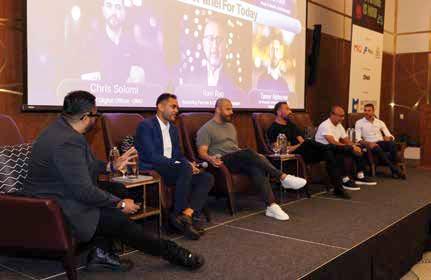
Pandya said, “The biggest myth is AI will replace humans. No. Humans with AI experience will replace humans who do not have AI experience. Second myth: AI takes time to integrate. No. We are able to do it in less than 30 minutes. Third myth: AI is a black box. No. We are 100 per cent transparent about how we use AI.”
Pandya then moderated a high-energy panel with Turbostart’s Ravi Rao, Omnicom Media Group (MENA)’s Christos Solomi, Platformance.io’s Waseem Afzal, Digital Rocket’s Tamer Alphone, and Stellantis Middle East & Africa’s Viral Patel on how AI and the algorithms of today are not just shaping our routines but are sculpting the very essence of tomorrow’s reality.
The panel answered the day-to-day marketers’ questions, including how AI can help you get more qualified leads, and how it can help marketers reach the right audience – thus going beyond time-saving and efficiency measures, to also become extremely effective.
Ravi Rao, Founding Partner & CEO, Turbostart MEA, said, “I would recommend every single agency to look at tech startups working with AI, as they can deliver amazing results. Even if it’s as simple as budget automation across platforms, there are so many companies that don’t capitalise on it. But here’s a more interesting point I want to make: If we as individuals, don’t use any of the generative AIs on our own, we are only going to be talking about definitions and theory, without actually benefitting from it.”
Chris Solomi, Chief Digital Officer, Omnicom Media Group, said, “In media, we want insights, we want to help with planning and buying, and most of the AI that we’re using is what we’ve been using for three to four years; the underlying technology is the same. However, the insights bit has really changed.”
“When we put GenAI assistants in the hands of our planners in the insights part of the planning phase, they can ask it questions and it will output really interesting insight that help with the next stage of the planning process,” Solomi added.
After the keynotes and panels at the event, delegates stayed back for networking, collaborating, engaging with ideas, learning, and brainstorming.
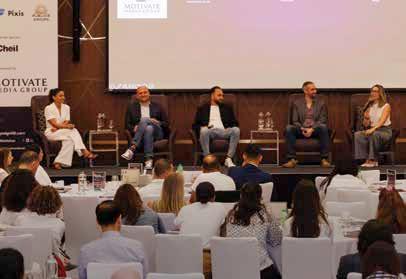
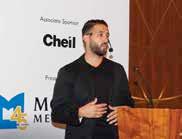

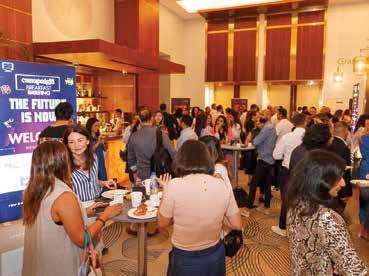




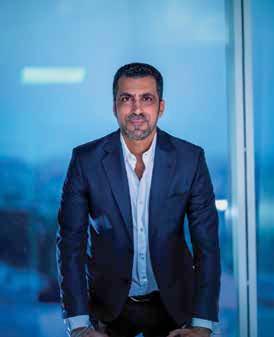
Managing Director of Cicero & Bernay Communication Consultancy
News, views and trends from across the spectrum
Celebrities like Cristiano Ronaldo are setting the stage for a new era of influencer marketing by embracing organic, unpolished content on platforms like YouTube when audiences increasingly crave authenticity and relatability over slick, polished adverts. The result? A blurring line between genuine endorsements and paid promotions.
UAE social media users prefer campaigns featuring local celebrities and influencers. 52%

$24 billion
Projected size of the global influencer marketing industry in 2024.


Brands that prioritise authenticity over obvious cash grabs stand to generate deeper engagement and loyalty. In essence, to truly connect, brands must craft content that feels natural and seamlessly fits into the influencer’s world, thereby building trust and amplifying word-of-mouth impact, making every recommendation feel like a genuine endorsement rather than a scripted pitch.
Gen Z have made purchase decisions influenced by celebrity endorsements. 44%
4 out of 5
Millennials in the UAE follow at least one social media influencer.
Source: AdWeek.com

Source: Wired.com

smaller creators directly. By clicking the ‘Hype’ button, viewers can promote creators with under 500K subscribers, helping them gain exposure. With 18 to 24-year-olds leading the testing, this community-driven tool fosters organic growth and strengthens creator-audience connections. #NOT
Hilton Hotels broke the mould with a 10 -minute TikTok ad featuring Paris Hilton, which blended humour and relatability while being a highlight reel of the latest trends on the platform. Its success lies in embracing TikTok’s style and cultural relevance; the Hilton Group set a new standard for brands looking to engage today’s digital-savvy consumers.
Canva’s price hike, driven by new AI features, has sparked backlash, with plans rising over %300. Frustrated by the lack of transparency and paying for unwanted features, users learned of the changes only via email, highlighting the need for clearer brand communication regarding price changes.




From Instagram expanding carousels to 20 frames to LinkedIn’s in-feed video carousels, this month’s updates are all about amping up engagement. Here are the key highlights:
Increases carousels to 20 frames
The platform has doubled down on its carousel feature, now allowing users to include up to 20 photos or videos in a single post.
Makes "Views" the primary metric
Views will now replace Plays as the key metric for Reels, Stories, photos, and carousels, offering clearer insight into content's performance across all formats.
Launches "App Center"
TikTok's new App Center helps small businesses by offering a centralised hub of third-party tools designed to simplify everything from content creation to analytics.
Announces "Create your AI voice"
Users can now create their own AI voice within their video voice-over options to use in their TikTok videos. This raises a lot of security concerns.
Adds new features for creators
These tools offer analytics for audience insights, advanced scheduling for planning, and posts drafts for improved content management.
Introduces trending topics feature Threads will start highlighting related topics above trending posts. Users can tap these labels to access a curated feed of top and recent posts on the same subject.

Releases Grok-2
The platform has introduced Grok-2 and Grok-2 mini, offering enhanced performance in code generation, writing, news, as well as innovative image generation capabilities.
Develops a new dashboard for verified organisations
The new dashboard will offer a suite of advanced features, including in-depth analytics, streamlined ad management, and tools for handling job listings and affiliate accounts.

Extends ad breaks for CTV
YouTube is set to extend ad breaks within its Connected TV experience. This means viewers can now enjoy 50 per cent longer sessions before their next ad break.
Trials new content discovery experience
YouTube is testing merging Shorts and feed videos into a single feed, aiming to capitalize on Shorts’ popularity and give more exposure to longer-form content.
Rolls out verification for Company Pages
LinkedIn emphasised that Company Page verification depends on several factors, such as accurate data points on the Page and an active presence, among others.
Introduces in-feed video carousels
The new feature will offer a TikTok-like experience by displaying algorithmically chosen video clips tailored to user profiles and activities.


Strikes a deal with Universal Music Group
Meta and UMG have announced a new licensing agreement that expands music access across Facebook, Instagram, Messenger, Horizon, Threads, and WhatsApp.
Automates offer discovery for ads
Meta has streamlined ad offers with a new URL ingestion feature that automatically detects and displays discounts from the brand’s website within the ad campaigns.





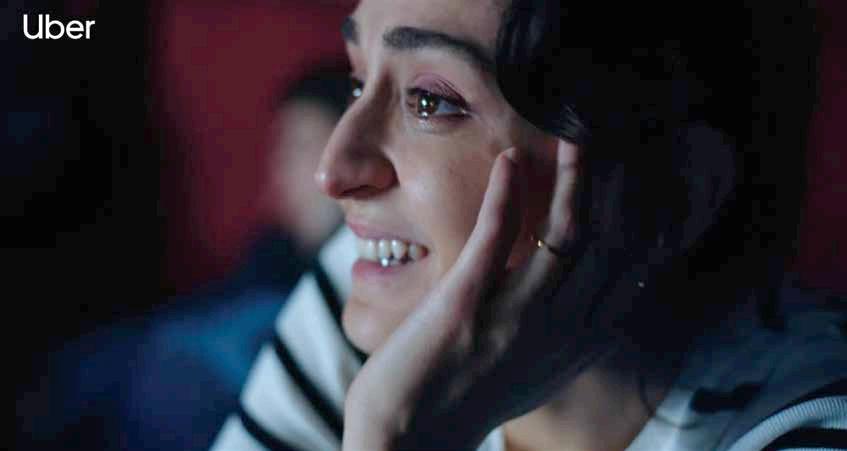





Associate Creative Director, BrandMakersStudio, Snap MENA

LARA ACTIVE (1):
This is a brilliant ‘I wish I’d done that,’ idea. Everything aligns perfectly – from the brand involved to the iconic sports moment, to the clever use of augmented reality technology that transforms Marianne’s Phrygian cap into a hijab. It is absolutely spot-on. Vive la révolution!
IKEA ALSULAIMAN (2):
Your enjoyment of this campaign may hinge on your appreciation for puns. While I’m no pun afficionado, I admit that they’ve crafted a clever play on words with some promise. Some folks might get a kick out of spotting these on their social feeds, but I wonder if the campaign’s overuse might lead to the concept wearing thin.
UBER (3):
The concept of a sitcom where a couple finds common ground on their choice of transport is quite fitting, especially given the popularity of Turkish shows. However, the tone seems to lack the charmingly quirky and wholesome character that has become a hallmark of the best Uber ads.
AL NASSR FC (4):
The passion in this project is undeniable! From the editing and motion design to the music, script, and filming techniques, it’s clear that Adidas, Al Nassr FC, and Them Again have crafted something truly exceptional. This isn’t just a commercial for a new football club’s shirt; it’s a masterfully rousing film that honors the rich football heritage of Saudi Arabia.
SAMSUNG (5):
The rap song written by Wegz can certainly become an earworm after a few listens. However, from watching the music video ad, I find that the standout elements are the catchy ‘aihh’ and Wegz’s charisma, rather than the phone’s features highlighted in the video.
JUHI RUPANI
Creative Director, Eye Studio

LARA ACTIVE (1):
What makes this campaign stand out is how it quietly redefines visibility. It’s not just an ad; it’s a statement about owning space where representation has often been overlooked. Using AR to amplify hijab rights in the Olympics, takes something typically virtual, and gives it a very human, emotional weight. It’s about being seen, quite literally, in a world stage where visibility has always been selective.
IKEA ALSULAIMAN (2):
At first glance, it’s easy to see this as just a playful pun campaign, but what IKEA does so cleverly here is speak the language of cultural intimacy. A quiet nod to the way brands can seamlessly become part of everyday conversations. IKEA takes something as simple as its name and weaves it into the local dialect, making it feel like it belongs in the local narrative.
UBER (3):
Uber’s sitcom-inspired ad is doing something subtle but groundbreaking – it’s reintroducing itself as more than a service, a character in the story of your life. This isn’t just a nostalgic throwback to comfort TV; it’s a way of positioning Uber as part of your everyday routines. The real brilliance here is how it softens Uber’s image, making it feel less transactional and more like a reliable friend.
AL NASSR FC (4):
This Al Nassr FC ad, at its core, is about transformation. It’s not just showing the new kit; it’s showcasing a shift in identity. The choice to intertwine fashion and football speaks to how deeply sports culture is evolving — fans are no longer just spectators, they’re participants in the lifestyle that surrounds the game.
SAMSUNG (5):
What’s different about this Samsung campaign is how it merges technology with rhythm in a way that feels effortless. It’s selling a feeling – a shared beat between tech and culture. The inclusion of Wegz taps into a generational pulse, but it’s the way the campaign moves that feels revolutionary. The phone is not the hero; it’s a co-star in a lifestyle that’s vibrant, and spontaneous.
Lara Active Title: Phyrjab Agency: Tactical
Uber Title: The Right Choice for a Taxi Agency: BPG Group, VML Turkey Production house: Public Film
Al Nassr FC Title: Legends of Najd Agency: Them Again Production house: NaF+
Samsung Title: I’ve Brought My A-Game Agency: DDB Egypt Production house: Good People















Global marketing and communications group Stagwell has appointed SUNIL JOHN as its Senior Advisor to head the group’s forthcoming MENA office, spearhead growth, and enhance collaboration among local agencies and partners. John’s mandate at Stagwell will also encompass developing new client solutions and utilising his extensive regional network to support brands aiming for both regional expansion and global reach.


AW Rostamani Group has appointed SARA O’HARA as Chief Marketing and Communications Officer. O’Hara brings more than 18 years of corporate communications experience to the role with expertise spanning transformational corporate communications programmes, brand building, and reputation management. In this role, she plans to draw on her experience to develop initiatives that will ensure the brand continues to thrive well into the future.

Volkswagen Middle East has announced the appointment of VIRGINIE LUDMER as its new Marketing Director. She brings with her nearly a decade of experience with Volkswagen Group Canada. The automotive brand claims that Ludmer’s background in digital marketing, CRM
communications, and brand strategy, combined with her international experience, positions her to lead the marketing department towards a new era of innovation and customer engagement in her new role.
Jumeirah Group has appointed ANTOINE MALIN as its new global director for social media. Malin previously served as the Global Marketing Manager at INFINITI for six years across Hong Kong and Tokyo. The newly created role, reporting to the Vice President, Global Communications is part of Jumeirah Group’s strategic investment focus on creating brand consistency on social media and long-term brand equity.


Chief Commercial Officer. Shoker will oversee commercial operations in key markets, including the UAE, KSA, and Egypt.

Platformance.io has also appointed HAMZA MADI as the group’s general manager for emerging markets and solutions. Madi will lead the commercial growth of the group across the emerging markets. His duties will include overseeing market acceleration in emerging markets including the Lower Gulf, Levant, and North African regions and P&L responsibilities.
Raffles Doha and Fairmont Doha have introduced MIRAH MARHAENDRA as the new Cluster Director of Marketing Communications & Digital Strategy.
Marhaendra’s expertise includes an in-depth knowledge of the food & beverages (F&B) industry. She’s reputably known for her creative approach to campaigns and extensive network across Southeast Asia. The two hotel brands claim that Marhaendra brings extensive experience and unwavering dedication to excellence in this vital role.
Platformance.io has appointed TikTok’s former Head of Trading Partnerships HASSAN SHOKER as its Group




FP7 McCann Dubai has appointed NICK SALTER as its Head of Strategy, Dubai, aiming to bolster its strategic leadership and strengthen the agency’s commitment to driving business growth through creative excellence. Salter will spearhead the agency’s strategic direction, ensuring that creativity continues to drive significant business growth for its clients. The creative agency has also promoted NAYAAB RAIS to the role of Executive Creative Director, bolstering the creative leadership at the agency. Rais will also join MCN’s Creative Leadership Council, responsible for elevating the creative product across MCN agencies and ensuring seamless collaboration across creativity, data, tech and media.

This month, The Spin’s monthly round-up brings you the best of communications gone awry in the UAE and in the US.
The Spin took a spin on the Dubai Metro and came across a poster for a voice and video calling app in the UAE that now permits payment transfers, as well. The ad creative, which is culturally relevant and reads perfectly well in its original Arabic text, has been unfortunately translated verbatim to English as “Like your best friend, you can always lean on it.” Even looking past the obvious
recall, and brand consideration for the brand. So, in a manner of speaking, the ad was a success.
The Spin took the family to the City Centre Deira mall over the weekend, where the children passed a restaurant and decided to choose between ‘burgers, frozen custard, fries, shakes, hot dogs, and concretes’ on offer. Yes, concretes.
That word had the children in fits and giggles and try as we might, The Spin couldn’t get the kids to stop cracking jokes about turning into statues after eating a mixture of cement and water.
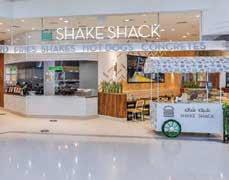



after a rather interesting debate between US Republican presidential candidate Donald Trump and Vice President Kamala Harris, during which former president Trump said, “In Springfield, they’re eating the dogs – the people that came in” referring to a conspiracy theory about immigrants eating pets in the US state of Ohio. Chicago’s The Wiener’s Circle, famous for its surly staff and char-grilled hot

OCT 2024
CAMPAIGN
SAUDI BRIEFING (RIYADH, KSA)
Media & Marketing 2024
NOV 2024
CAMPAIGN BREAKFAST BRIEFING (DUBAI, UAE) Out of Home 2025
FEB 2025
CAMPAIGN
BREAKFAST
BRIEFING (DUBAI, UAE)
Ramadan & The Year Ahead
DEC 2024
CAMPAIGN AGENCY OF THE YEAR MIDDLE EAST AWARDS (DUBAI, UAE)
APR 2025
CAMPAIGN BREAKFAST
BRIEFING (DUBAI, UAE)
Marketing Strategies
MAY 2025
CAMPAIGN
SAUDI BRIEFING (RIYADH, KSA) Talent & Technology

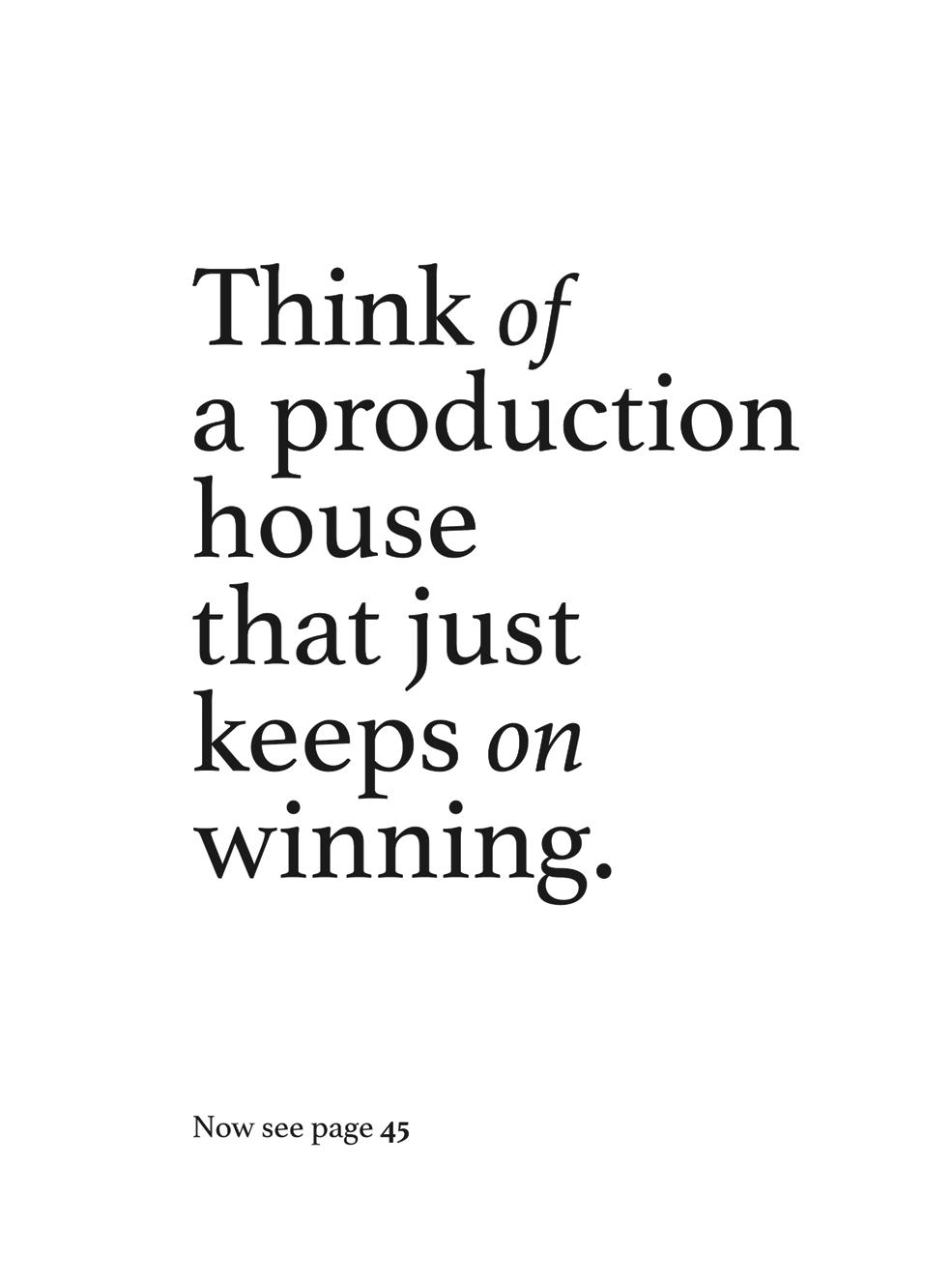








KHALED ALSHEHHI Executive Director Marketing and Communication, UAE Government Media Office

NEEL PANDYA CEO, EMEA, APAC and Global Partnerships Head, Pixis

JON BARBER Vice President - Marketing & Communications, TECOM Group
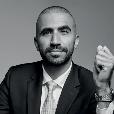
AHMED EL GAMAL Senior Director of Marketing, Jumeirah


MARWA KAABOUR CHAIR OF JUDGES CMO, Al Masaood Group

AHMAD CHATILA Director of Brand and Communication, HungerStation

SHERRY MANSOUR Managing Director - MENAT, Seedtag

SHOLTO DOUGLAS-HOME Chief Sales & MarComms Officer, Expo City Dubai

MANOJ KHIMJI Managing Director, The MediaVantage

ANNE TULLOCH Marketing Director, Alshaya
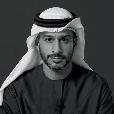
MOADH BUKHASH Chief Marketing Officer, Emirates NBD

ZIAD KHAMMAR COO, DMS

JAD SAAB Digital Growth Lead, MBC Media Solutions

Campaign Middle East’s annual MENA Power List is back in its 2024 iteration, and it is only ge ing bigger and be er by the year.
Experts with decades of experience, who have been instrumental in the evolution of marketing, advertising, creative, media, public relations, and communications across the Middle East have had their say.
From keying in their insights on their top focus for the year ahead, to sharing ‘rapid fire’ responses on what marketing needs to prioritise, change, and buzzwords we need to bury, these leaders have left our readers with a lot to dissect and learn.
The tasty details, however, lie in the ‘power essays’ – open, honest, and unfiltered opinions from the brightest and the best on threats and challenges within the industry that are often spoken about only in hushed tones, as well as trends and opportunities that will continue disrupting an industry in a constant state of flux.
Leaders have also shared their opinions on dealing with ‘change’ itself: how to embrace it fearlessly, how to mould the seeming ‘chaos’ of change into value and growth, how to keep a steady hand on the helm amid the maelstrom, and how to bring a touch of beauty into the business through empathy – for clients and creatives alike.
Critical themes of conversation continue to circle around first-party data, the strategic implementation of AI, making machines look beyond mere metrics, the need for industry-wide collaboration, and balancing data-driven decisions with the human elements of consumers and communities.
On a lighter note, this MENA Power List also offers a very down-to-earth look at the men and women photographed behind their powerful desks. It offers details on their pet peeves, their next travel destination, their favourite restaurants, their hobbies, and the books they are reading.
I was – in equal parts – surprised and fascinated to read that many leaders are currently poring through the same books that I’ve just marked as ‘finished’ on Audible: The Anxious Generation and Atomic Habits. I’ve also made a mental note of the leaders that have marked Japan as their next travel destination, ready to share a score travel hacks from my recent trip over the next meal that I have with them.
All in all, the unifying feature that ties the wealth of knowledge shared in the upcoming pages together is this: the future of marketing in MENA region will be determined by a human-first approach in a data and insights-led world.
As one of our esteemed leaders writes, “When wielded wisely, data has the power to elevate human connection, to help brands navigate cultural nuances with precision, and to nurture relationships that last. It’s not about outpacing competitors; it’s about using data to create bonds that transcend the transactional and endure in the hearts of consumers.”
Can we look beyond our KPIs to collaborate? Can we unite to tackle common challenges? Can we truly raise trust and transparency to ensure that it’s not just individual agencies that succeed, but the industry as a whole that takes a step forward in the right direction?
The ball is in our court. The future of this industry is in our hands.

Motivate Media Group





ANUP OOMMEN
Editor
Anup.Oommen@motivate.ae


Head Office: 34th Floor, Media One Tower, Dubai Media City, Dubai, UAE. Tel: +971 4 427 3000, Fax: +971 4 428 2266. Email: motivate@motivate.ae Dubai Media City: SD 2-94, 2nd Floor, Building 2, Dubai, UAE. Tel: +971 4 390 3550, Fax: +971 4 390 4845 Abu Dhabi: Motivate Advertising, Marketing & Publishing, PO Box 43072, Abu Dhabi, UAE. Tel: +971 2 677 2005, Fax: +97126573401, Email: motivate-adh@motivate.ae Saudi Arabia: Regus Offices No. 455 - 456, 4th Floor, Hamad Tower, King Fahad Road, Al Olaya, Riyadh, KSA. Tel: +966 11 834 3595 / +966 11 834 3596. Email: motivate@motivate.ae
London: Motivate Publishing Ltd, Acre House, 11/15 William Road, London NW1 3ER. Email: motivateuk@motivate.ae www.motivatemedia.com
EDITORIAL: Motivate Media Group Editor-in-Chief Obaid Humaid Al Tayer | Managing Partner and Group Editor Ian Fairservice | Campaign Middle East Editor Anup Oommen | Reporter Ishwari Khatu | Junior Reporter Shantelle Nagarajan
DESIGN: Senior Designer Thokchom Remy
ADVERTISING ENQUIRIES: Chief Commercial Officer Anthony Milne | Publisher Nadeem Ahmed Quraishi (nadeem@motivate.ae) Sales Manager Tarun Gangwani (tarun.gangwani@motivate.ae)
PRODUCTION: General Manager S. Sunil Kumar | Production Manager Binu Purandaran | Production Supervisor Venita Pinto
HAYMARKET MEDIA GROUP: Chairman Kevin Costello | Managing Director Jane Macken



maybe even toss a coin or record your performance.
Suddenly, those few attentive people matter far more than the many who barely noticed. This is what attentive reach in media is all about – not how many see your ad, but how many engage and remember it. Their attention holds far more value.
The advertising industry is undergoing a seismic shift, evolving beyond traditional metrics like impressions and reach. For too long, the focus has been on how many eyes see an ad, but this approach only scratches the surface. What’s truly driving value today is engagement – how much real attention an ad captures. The MENA region, an emerging market ripe for innovation, is perfectly positioned to embrace this shift. In a world brimming with content, attention has become the new king. Success is no longer about being seen; it’s about being remembered.
Gone are the days when simply reaching a large number of people was enough. Now, brands must dive deeper into how consumers engage with their messages. In this evolving landscape, attention becomes the metric that truly matters. Advertisers can no longer afford to chase visibility alone; they need to focus on the depth of engagement, transforming impressions into meaningful interactions.
The principle is simple: Not all views are created equal. Traditional viewability metrics can tell you whether an ad was displayed on a screen, but they can’t tell you if it was actually watched. Attention metrics dig deeper, revealing how engaged the audience truly was. It’s not just about seeing; it’s about experiencing.
As automation and data-driven solutions dominate media buying, creativity, empathy, and emotional resonance remain essential in capturing attention. The human element – the ability to tell compelling stories that stir emotions – is critical to making a lasting impact. In a fragmented media environment, where attention is scattered across numerous platforms and devices, understanding these nuances can elevate your marketing strategy from ordinary to unforgettable.
success stories. They were validated by third-party evaluations, proving that focusing on attention delivers tangible value.
Of course, shifting to an attention-based model is no easy feat. Attention is fragmented, measured differently across platforms and brands, and we are still in the early stages of refining these tools. While they haven’t been perfected, they are opening the door to vital new conversations. The key question is whether these innovations are bringing us closer to an industry standard for attention-based metrics – a metric that holds far greater value than mere impressions. Though the answers aren’t fully in place, this shift is crucial in evolving how we measure and understand attention.
Here’s the exciting part: Dentsu has recently unveiled the groundbreaking results from an Arabic attention research study, marking a monumental step forward for the region. This study is focused on defining attention metrics specifically for the Arabic-speaking audience, taking into account their unique media habits and cultural contexts. It’s a tailored approach that promises more effective planning and results in a region primed for transformation.
This is a pivotal moment. The time has come to move beyond the traditional obsession with impressions and start focusing on what truly matters: capturing and maintaining attention. The industry must unite around a common framework for attention metrics to standardise this approach. Every advancement in measuring attention is pushing the boundaries of what’s possible. By prioritising quality over quantity, we can revolutionise the way brands connect with their audiences and unlock new avenues for growth.
Ultimately, the future of advertising isn’t about reaching the most people; it’s about making every impression count. Just like a remarkable meal leaves a lasting memory, our ads should leave a meaningful mark on the minds of consumers. By embracing attention as the new currency, we can ensure that every campaign resonates deeply, driving both engagement and impact.
Focus for the next 12 months?
Scale the integration of attention metrics into all planning tools.
Further expand Merkury’s identity capabilities for personalised marketing.
Buzzword we need to kill?
Seamless integration – more of an oxymoron.
Marketing needs to prioritise?
Audience and attention.
Marketing needs to change?
Doing things out of legacy.
Top lesson learnt in 2024?
Transformation is relative
What worries you the most?
Short-termism.
Biggest blessing in your life?
Two healthy boys.
Value/principle that matters the most?
Do what’s right.
Next travel destination?
A long list.
What is your pet peeve?
Bureaucracy.
Who do you look up to?
Too many people to count.
Favourite restaurant in the Middle East?
The Maine.
What are you reading?
The news – I should stop.
Favourite hobby?
Currently: off-roading.
Top tip?
Stay curious.
Over the past year, we’ve made significant strides in positioning ourselves as leaders in data-driven, people-based marketing by launching an industry-first attention economy survey and embedding it into Merkury, our planning tool to optimise media strategies with precision. Additionally, we successfully launched our advanced identity solution within Merkury, which has empowered us to leverage first-party data, enabling more personalised and privacy-safe marketing. Our focus on automation has streamlined processes, boosting operational efficiency and delivering enhanced outcomes for our clients.



region, including MBC Group, Saudi Sports Company, Al Arabiya, Samsung Ads and TikTok in Egypt. Our partnerships have expanded, both locally and internationally, allowing us to offer even more tailored and effective solutions to achieve our clients’ strategic goals.
Focus for the next 12 months?
Driving exponential growth for MMS. Buzzword we need to kill?
The overuse of ‘disruptive’.
Marketing needs to prioritise?
Crafting creative, localised storytelling and purpose-driven marketing.
Marketing needs to change?
Moving away from generic, one-size-fitsall messaging.
Top lesson learnt in 2024?
Embracing curiosity keeps you ahead of the curve and drives innovation.
Biggest blessing in your life?
My children.
Value/principle that matters the most? Authenticity.
Next travel destination? Japan.
Favourite hobby?
Tennis and Baloot (a popular trick card game in Saudi Arabia).
platform, is not only catering to viewers in the region but also reaching global Arab audiences. This presents brands in the region with unlimited opportunities and at MMS, we are constantly innovating the solutions that we offer on Shahid to enable brands to connect with audiences throughout their journey on the platform.
“We are entering an era characterised by a renewed sense of national identity, a commitment to telling authentic stories, and a desire to share Saudi culture with the world.”
As a testament to MMS’s expertise and deep understanding of the region’s digital landscape, we have been appointed as the official advertising partner for Samsung TV Plus and Samsung Ads.
This partnership enables advertisers and agencies in Saudi Arabia, UAE, and Egypt to access Samsung TV Plus inventory and advanced CTV advertising formats, unlocking new opportunities for reaching audiences across these markets. Artificial intelligence (AI) and data analytics also play a pivotal role in shaping the future of media in Saudi Arabia lead to even more innovative content delivery methods, from interactive storytelling to immersive
drive measurable results.
The Kingdom’s ambitious blueprint for economic and social reform emphasises the importance of a vibrant and diverse culture, this is reflected in the media landscape, where we see a focus on content creation, especially in Saudi Arabia, that shapes cultural narratives that influence perceptions at a local and global stage.
TV and digital measurement tools indicate a clear preference amongst regional audiences towards local and regionally produced content like MBC Group’s localised big formats; Top Chef, Arabs Got Talent & Saudi Idol as well as Arabised adaptation of global dramas and Arabic original content.
Moreover, the football league in Saudi Arabia, which features some of the sport’s most legendary players has positioned the kingdom as a global epicenter for football in a short period of time.
To capitalise on these opportunities for our clients, we continuously innovate our solutions to ensure they connect with their audiences across every platform and touchpoint. In response to the rapidly expanding sports landscape, we launched MMS Sports, unifying the most prestigious events, matches, and shows airing on SSC, MBC Group, and Al Arabiya under one powerful platform for our clients and brands to harness
The future of Saudi Arabia’s media industry is about more than just technological advancements and economic growth; it is about entering a new cultural era. This era is characterised by a renewed sense of national identity, a commitment to telling authentic stories, and a desire to share Saudi culture with the world. As the Kingdom continues to evolve, its media industry will play a central role in shaping its future, both within the region and on the global stage.




My journey has taken me across a spectrum of industries, from leading global brands to working with government entities, always focused on the power of marketing to create lasting impact. This experience has given me a unique perspective on this transformative shift. I’ve seen the power of branding firsthand, witnessed the impact of a well-crafted message, and experienced the thrill of shaping a nation’s identity on the global stage.
Saudi Arabia, with its rich history and deep cultural roots, is now boldly embracing the future. It’s a future where innovation isn’t just a buzzword, but a guiding principle. From the futuristic cityscape of NEOM to the breathtaking Red Sea Development, the kingdom is embarking on a journey to redefine itself, not just within its borders, but on the global stage. And at the heart of this journey is the power of storytelling, the ability to capture the essence of a nation in motion and convey it to the world.
It’s not just about mega-projects, though they are certainly breathtaking. It’s about understanding the aspirations of a nation that is brimming with youthful energy, a nation that is confidently embracing its cultural heritage while looking towards a brighter tomorrow.
“Craft campaigns that resonate with the soul of a nation; campaigns that tell the story of transformation, resilience, dreams taking flight.”
For marketers, this translates into boundless opportunities. Here, you’re not just selling a product, you’re selling a vision, a dream, a story. You’re helping to shape the image of a nation in the world’s eyes.
Imagine crafting campaigns that resonate with the soul of a nation, campaigns that tell the story of transformation, of resilience, of dreams taking flight. Imagine working alongside a vibrant community of creatives, each bringing their unique talents and perspectives to the table. Imagine being at the forefront of a revolution, where technology and traditional values intertwine to create something truly remarkable.
This isn’t just a job; it’s a chance to be part of a historic moment, to contribute to shaping the narrative of a nation that is rewriting its own destiny. I believe the best creative work will be coming from Saudi Arabia in the years to come, and I am incredibly excited to be a part of this journey. It’s a chance to not just market products, but to market a future. And that, to me, is the most rewarding challenge of all.
Focus for the next 12 months?
Growing Publicis Groupe’s presence in KSA while contributing to the success of Vision 2030.
Buzzword we need to kill?
‘Disruption’
Marketing needs to prioritise?
Authenticity and customer-centricity.
Marketing needs to change?
Needs to embrace technology and innovation.
Top lesson learned in 2024?
Importance of collaboration and building strong teams.
What worries you the most?
Lack of innovation and creativity.
Value/principle that matters the most?
Integrity and ethical leadership.
Next travel destination?
Spain.
What is your pet peeve?
Lack of preparation.
Who do you look up to?
My son; he teaches me new things every day. What are you reading?
The Medici Effect.
Favorite hobby?
Cars, video games and sports.
Top tip?
Always learn and adapt.
Leading the launch of the ‘Made in Saudi’ programme, a national initiative under the patronage of HRH Prince Mohammed bin Salman bin Abdulaziz, has been a defining moment of my career. This programme, a cornerstone of Vision 2030, aims to build a trusted national brand for Saudi products and services, promoting them both domestically and globally. My role involved building a strong team and growing the portfolio of participating companies, successfully establishing a robust communication strategy, and implementing comprehensive marketing campaigns, with the goal of establishing ‘Made in Saudi’ as a symbol of quality, innovation, and excellence. This programme has been instrumental in promoting Saudi exports and showcasing the talent and expertise of Saudi businesses on a global stage.




Focus for the next 12 months?
Growth and innovation.
Buzzword we need to kill? Bandwidth.
Marketing needs to prioritise? Customer experience.
Marketing needs to change?
Quantity over quality content.
Top lesson learnt in 2024?
Adaptability wins and embrace change early.
What worries you the most?
Regulatory changes.
Biggest blessing in your life? My family.
By James Bicknell, CEO of BackLite Media
As leaders in outdoor advertising, we face a pivotal moment where change is inevitable and essential. The rapid integration of artificial intelligence (AI) and other cutting-edge technologies is transforming the industry, challenging us to rethink how we approach our craft.
At BackLite Media, we believe in fearlessly embracing this change – not just as a necessity but as an opportunity to lead the market through this exciting evolution. We see ourselves as drivers of innovation but, more importantly, as leaders guiding our teams and partners through this transformative journey.
AI is reshaping the advertising landscape in profound ways. The days of traditional billboards are behind us, replaced by dynamic, data-driven campaigns that can adapt in real-time. With AI, we can analyse vast amounts of data to deliver personalised, contextaware content that speaks directly to the viewer. This shift requires not just technological advancement but a mindset that embraces possibility and is unafraid of the unknown.
At BackLite, we’ve adopted AI as a cornerstone of our strategy, harnessing its potential to create smarter, more impactful campaigns. For luxury brands, this means elevating the consumer experience, offering bespoke messages that align perfectly with the brand’s ethos and the audience’s desires.
“ The ability to adapt, pivot and innovate without hesitation is critical. We are not just reacting – we are shaping the future.”
Value/principle that matters the most? Integrity.
Next travel destination?
The Seychelles.
What is your pet peeve? Micromanagement.
Who do you look up to? My wife.
Favorite restaurant in the Middle East? LPM. Just wonderful food and wonderful service.
What are you reading?
‘The Wealth Money Can’t Buy’ by Robin Sharma.
Favourite hobby? Golf.
Top tip? Do what you promise.
Leading through this change means guiding our teams, clients, and partners to understand that AI is not something to fear but a powerful tool that can enhance creativity and drive results.
Our recent acquisition by Multiply Group is a testament to our commitment to this vision. As part of a larger ecosystem, BackLite Media is now positioned to take bolder steps in transforming outdoor advertising in the region. This gives us the strength and resources to not only innovate but to do so on a scale that influences the entire industry.
Being part of a bigger vision means aligning ourselves with a strategy that goes beyond short-term gains. We are building for the future, and that requires leading our people through change with confidence and purpose. The ability to adapt, pivot and innovate without hesitation is critical. We are not just reacting – we are shaping the future. We are bringing our clients and partners along on this journey, helping them navigate the evolving landscape of AI, data-driven marketing, and immersive experiences.
Our role as leaders is to balance technological innovation with human-centred creativity, ensuring that every step forward enhances our ability to connect with audiences on a deeper level.
The outdoor advertising industry is at a crossroads, and the only way forward is through fearless change. For regional players, the challenge is not just about adopting new technologies – it’s about embracing the mindset that comes with it. It’s about being willing to disrupt traditional models, question the status quo, and take risks that push the industry into new territory.
At BackLite Media, we have chosen to lead with courage. We are not afraid of the changes happening around us; instead, we are driving those changes. From AI-powered Programmatic campaigns to the integration of sustainable practices, we are setting a new standard for what outdoor advertising can achieve.

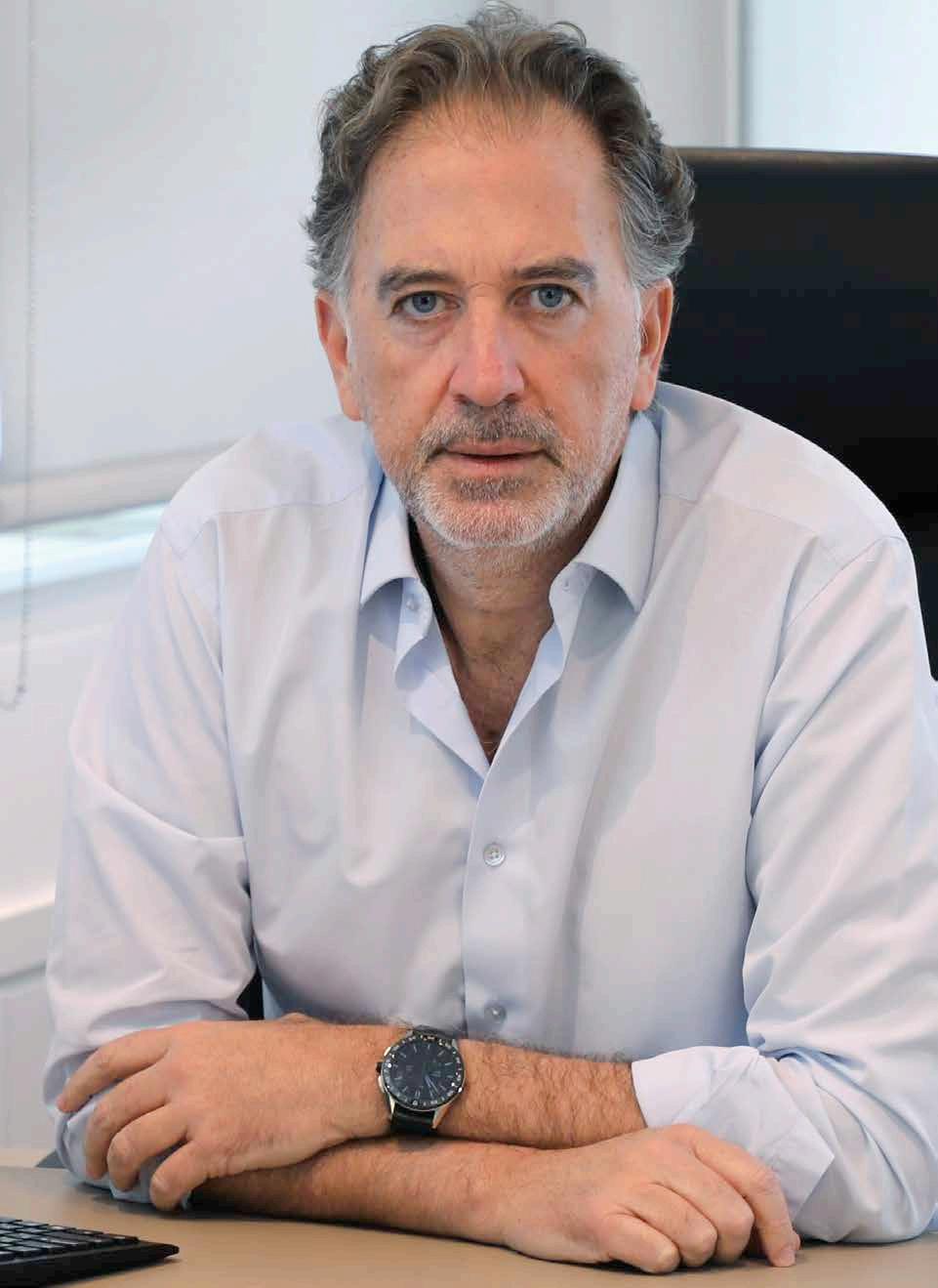


Focus for the next 12 months? People and clients.
Buzzword we need to kill? Growth.
Marketing needs to prioritise? Clear objectives.
Top lesson learnt in 2024? Nothing is constant.
Biggest blessing in your life? Wife and children.
Value/principle that matters the most? Fairness and Integrity.
Next travel destination? Can’t disclose.
What is your pet peeve? Big ego.
Who do you look up to? My father.
Favourite restaurant in the Middle East? Home food.
What are you reading? Atlas Shrugged.
Favourite hobby? Hiking/walking.
Top tip? Stay healthy.
“Our industry is about the people, the interactions, the (human) storytelling, and the personal engagement that is still the main added value of our everyday encounters.”
customer experience by better understanding their clients and build loyalty and long lasting relationships.
As agencies, we are all being evaluated today by our data capabilities and how it can amplify our creative ideas. Data is the new gold, and what used to take ages to collect, collate and analyse, also requiring major investments in hardware and software has become at everyone’s reach today.
We are all racing to invest in tools that can help us be at the forefront of this data first era we live in, but at the center of all this is the investment in our talent, as they are the ones who will analyse, understand patterns and behaviours, and provide the best advice and recommendation to our partners and clients.
Data is also what AI needs to operate: the more you feed in the more it can generate tasks and improve on them. While many worry that AI might replace humans, and maybe in certain tasks it will, but let’s not forget that while AI can excel at specific tasks and can adapt and solve problems across many sectors, the human being still has the human intelligence that encompasses emotional understanding, creativity, empathy, complex social interactions that AI cannot replicate for now, at least in our industry.
Our industry is about the people, the interactions, the (human) storytelling, and the personal engagement that is still the main added value of our everyday encounters.
Many trends and innovative technologies emerged in the last few years, and many of those disappeared. AI is here to stay and evolve and that’s for sure, but it will take a long time to replace humans in many parts of our business.
As much as we are all investing in systems and tools to improve our data and AI offerings, we should not forget that the biggest asset we have is our talent and this will remain so for the near future. Lets keep our focus on them.

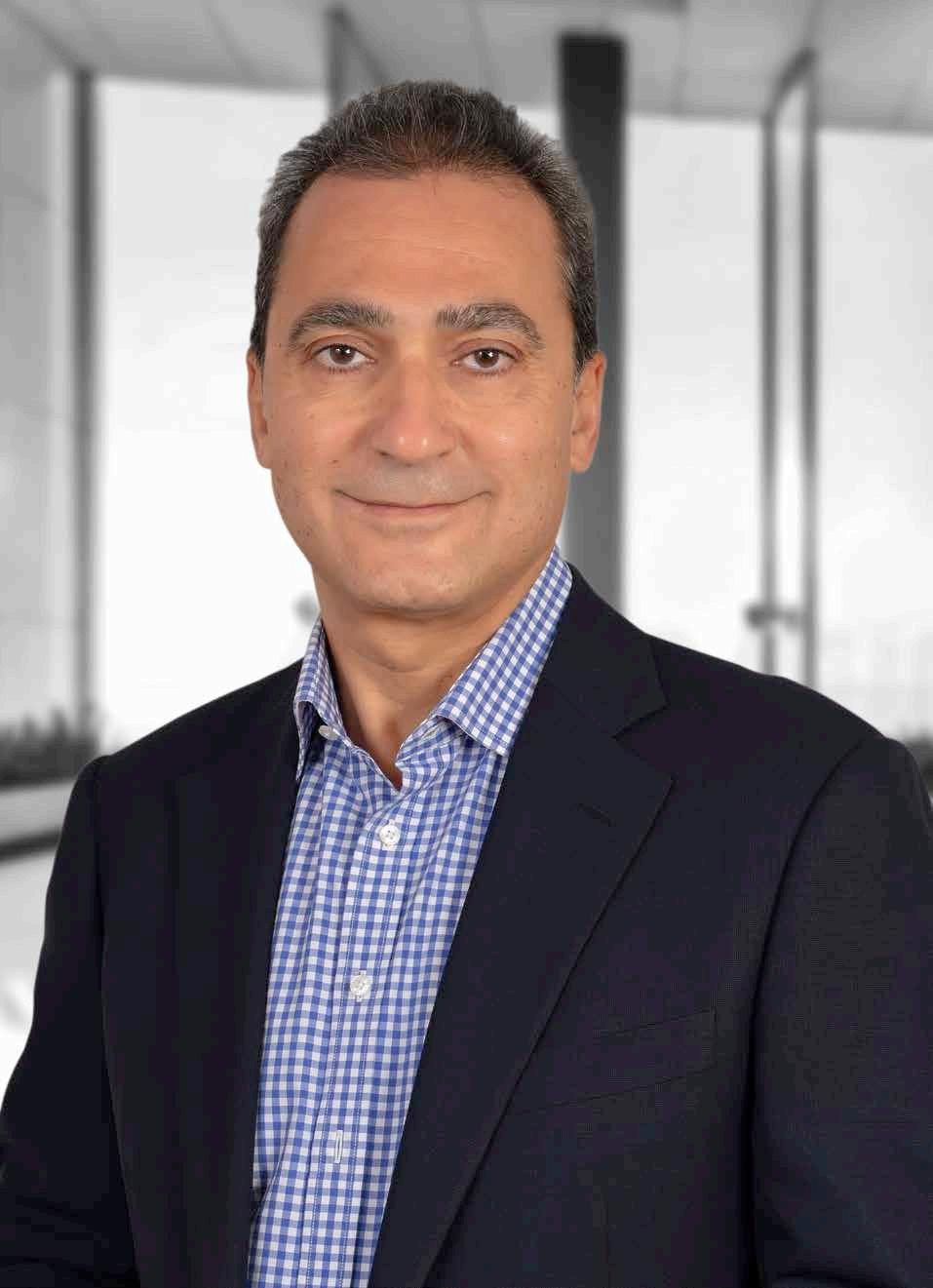

Focus for the next 12 months?
Same as for the last 12 months: ensure we have on board a motivated team, which will ensure we have satisfied clients.
Buzzword we need to kill?
There is no need to kill any, provided they are acted upon and kept in context.
Marketing needs to prioritise?
Curiosity. Challenge the status quo.
Marketing needs to change?
Lack of curiosity.
Top lesson learnt in 2024?
Keep a close eye on the macroeconomic and political environment, but don’t let it steer you away from the plan.
What worries you the most?
Everything and nothing.
Biggest blessing in your life?
My family and my close friends.
Value that matters the most?
Humility.
Next travel destination?
Le Vaquier retreat and Lyon, France.
What is your pet peeve?
Lengthy content on OOH signs.
Who do you look up to?
My dad.
Favourite restaurant in the Middle East?
The recently opened Toto in Downtown Dubai
What are you reading?
‘Homo Deus’, until my daughter took it away from me. Spare copy, anyone?
Favourite hobby?
Cycling, reading, and cooking.
Top tip?
Listen, listen, and listen.
being one of them. On a related note, I want to dial back 102 years and bring back the following anecdote:
John Wanamaker (1838-1922) coined the phrase “Half the money I spend on advertising is wasted; the trouble is I don’t know which half”. Sadly, John isn’t with us, otherwise he would have his answer, as many of us do. Today, we are able to accurately measure the ROI of practically every single dollar spent thanks to AI driven measurement tools. Machine learning is making this process sharper every day.
I don’t want my above comment about the metaverse to be misconstrued, hence this clarification: it is true that the metaverse hype faded away fairly quickly, but the metaverse technology is here to stay and thrive, albeit within specific industries. What sets AI and the metaverse apart is monetisation. On one hand the application of AI technology is spreading across many industries fueling related investments. On the other hand, the metaverse’s usability is constrained – for now – to a limited number of commercially viable applications, thus, limiting investments behind this technology.
As for the next hypes that will undoubtfully be coming our way, the same eternal adage of supply and demand will rule dictating their lifecycle and viability.
Equilibrium in media spend: Advertising spend on digital media reached its peak – on a percentile level – during the big shift to digital. In 2018-2019, CMOs of big global brands started questioning the over-reliance on digital channels versus legacy channels. The marketing and ad industry took some time to reach the optimal ad spend equilibrium we are witnessing today as they needed to have on board the right amount of historic data and learning to support their decisions.
It is true that legacy media channels witnessed a substantial decline in their ad revenue during the big shift to digital. However, many of them managed to evolve their content, and digitise their distribution channels to meet changing media consumption habits.
many ways. Marketing prowess may not be one of them. It annoys me to see this popular platform change its name ignoring a fundamental marketing principal by ditching an ownable benefit that most marketers vie to have.
“Many media channels evolved their content, and digitised their distribution channels to meet changing media consumption habits and are reaping rewards.”
Wouldn’t every company on this planet want their brand name to become synonymous to the business category where they compete. I don’t think Elon will ever hear anyone say, “X it” instead of “Tweet it”. Mr. Musk, can you please reconsider your decision.
OOH advertising: Demand on OOH media is growing at a healthy pace and for the right reason. There is however one factor that plague this medium: lengthy content. Advertisers must realise that OOH media is not the place to tell their brand story. The dwell time and motorists’ attention span are too short to absorb longwinded messages.

The luxury category is one industry that is mastering the art of effective OOH advertising as their ads typically show a prominent visual of the product, and the brand name, bang. The less we say on OOH media the higher the assimilation rate. Any additional word in there will trigger a diminishing return on media investment. Please keep it simple.
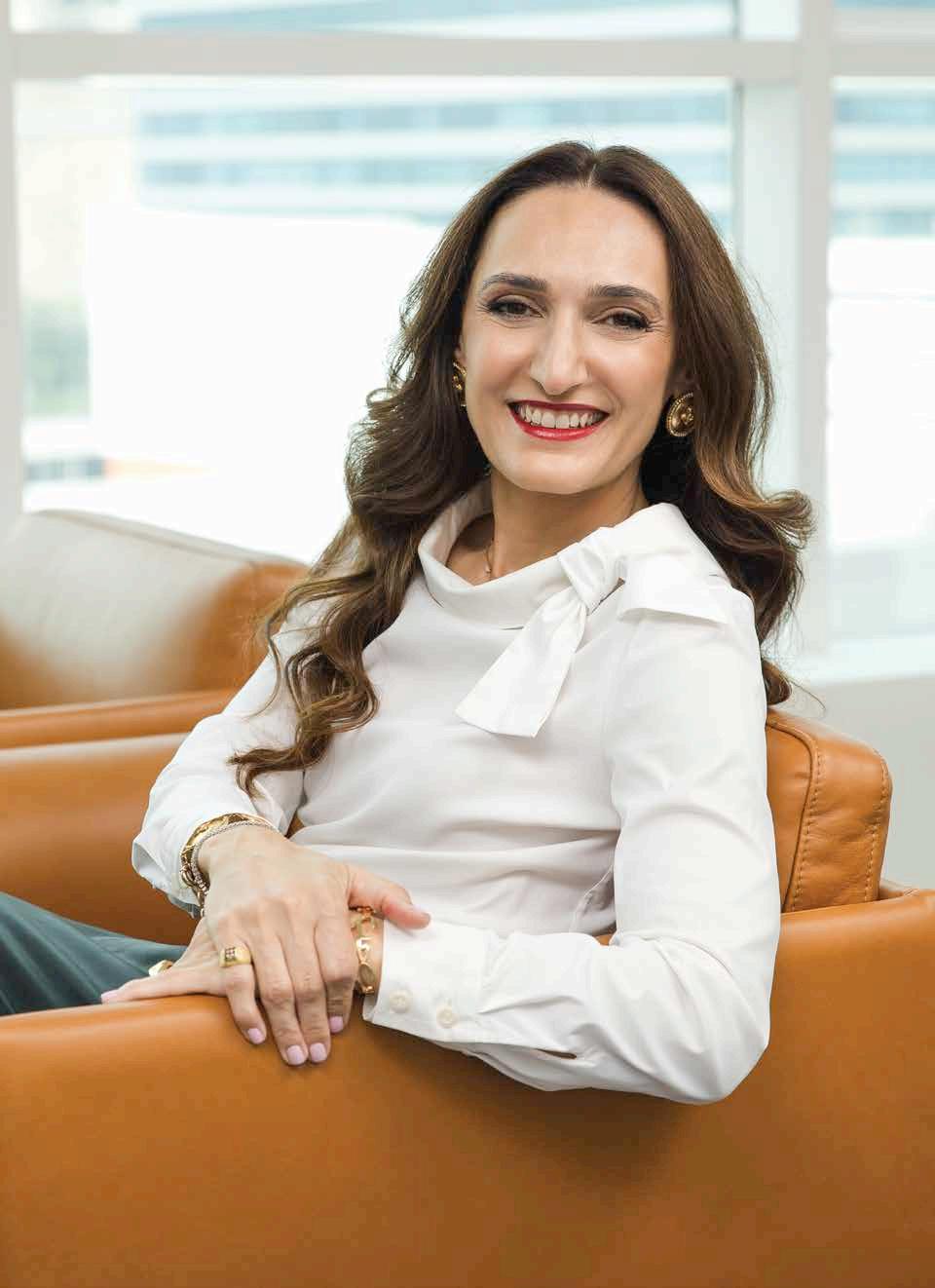


is always more to strive for.
Focus for the next 12 months?
Talent.
Buzzword we need to kill?
“AI” as a means to an end rather than the end itself.
Marketing needs to prioritise? Creativity.
Marketing needs to change?
Focus on short-term sales performance and diminishing brand power.
Top lesson learnt in 2024?
The need to go back to basics in media and marketing.
What worries you the most?
I’ve learnt there is no point in worrying. We deal with it whatever comes our way.
Value/principle that matters the most? Integrity.
Next travel destination?
London and Barcelona.
What is your pet peeve? Short-sightedness.
Top tip?
Cultivate wisdom in your life.
world of marketing … and sales. The role of technology is to support these fundamentals and not to replace them.
While buzzwords like ‘data-driven’ and ‘AI’ are prevalent in the industry, it’s essential to remember that the true value of media lies in its ability to connect brands with consumers in meaningful ways. By focusing on the fundamentals, media agencies can cut through the noise and deliver results.
The fundamentals are many and include many aspects including strong relationships and trust whether with clients or media owners; a data driven approach and technological proficiency; strategic thinking, problem solving and more, but there are three specific areas that I feel are essential to the creation of good work. I call on every professional in this industry to nurture these fundamentals:
1. Rigour:
The amount of data that media professionals must work with has exponentially grown over the last decade. No matter the technologies and tools used to simplify and aggregate, there is still a huge amount of manual work to bring it all together and make meaningful conclusions that will impact future decisions. We need to supercharge thoroughness and attention to detail to a superhuman level.
2. Creativity:
In a world saturated with marketing messages, creativity is more important than ever. The 10 Gold Cannes Lions were awarded to work that found solutions using the same existing media channels, the point was how they enhanced the lives of
“A call to tomorrow’s leaders: be curious, go back to the fundamentals, never compromise quality, be purposeful, and own your work.”
rigorous, creative or caring to what matters for a brand. These are attitudinal behaviors that will make good media professionals great and maybe create the next generation of media leaders.
I love our industry because we never stop evolving, never stop learning, because there is always something new that we can test and experiment with.
The dynamism keeps the young blood flowing and the excitement pumping. As media agencies, we should continue to be promoters of the avant-garde, but should never forget what makes a great partner.
This is a call to all the passionate, ambitious executives who want to become tomorrow’s leaders: be curious, always go back to the fundamentals, never compromise quality, be purposeful and own your work.




our people.
Focus for the next 12 months? Our people.
Buzzword we need to kill? Demure.
Marketing needs to prioritise? Perspective.
Marketing needs to change? Short-term thinking.
Top lesson learnt in 2024? Do what you’re good at. What worries you the most?
The impact of the political instability on the region.
Biggest blessing in your life? Family.
Value/principle that matters the most? Honesty & humility.
Next travel destination? Ecuador.
What is your pet peeve?
A voice note as an answer to a text.
“In a world where everyone can create, it’s the curators and connoisseurs who determine value. Human judgement, intent, empathy, ethics, and contextual understanding are what ultimately assign value.”
complexity, AI generated content becomes more sophisticated as we designed algorithms to learn at brisk speed. How will we assess the value of this content? Will human-created work be compared to AI-generated pieces? And most importantly, will it even matter?
GenAI has achieved remarkable progress in creating content that can match, or even surpass, human abilities. But the real question isn’t the source of a piece of content but whether it resonates with its audience on a human level. The worth of a piece of writing or work of art isn’t tied to its origin but to its ability to connect with audiences, evoke emotions, or spark thought. In a world where everyone can create, it’s the curators and connoisseurs who determine value. Human judgement, intent, empathy, ethics, and contextual understanding are what ultimately assign value.
We are still the decision makers. Our choices determine the success of brands and businesses. While we embrace AI’s benefits, we know it lacks emotional depth. Face App can be used to create the most beautiful face imaginable, but it will never have the impact of Sharbat Gula, the “Afghan Girl” whose National Geographic portrait captured a story of war to millions in one headshot because it was ‘real’. AI can generate a new Elvis song, but it can never be the next Elvis. This is the irreplaceable value of the human role.
Though this is my personal take on GenAI, it is aligned with PHD’s, and with good reasons. We’ve been early adopters, exploring AI’s implications for marketing in our thought leadership books and events, from Sentience in 2015 to Ascension this year.
In our latest event BrainScape, we examined the impact of AI on different functions, the tasks most likely to be given to AI and the implications of this. Most importantly, we addressed how the role of the individual will need to change in our view for the better. The key takeaway? We must approach AI with a mindset of collaboration, not competition or fear. We are evolving with AI aware that its short-term impact is overhyped, and its long-term impact is underestimated. When everything becomes possible and accessible, nothing feels special. AI can take us from nothing to average, but it is in our response to the average where our greatest human creativity breeds.

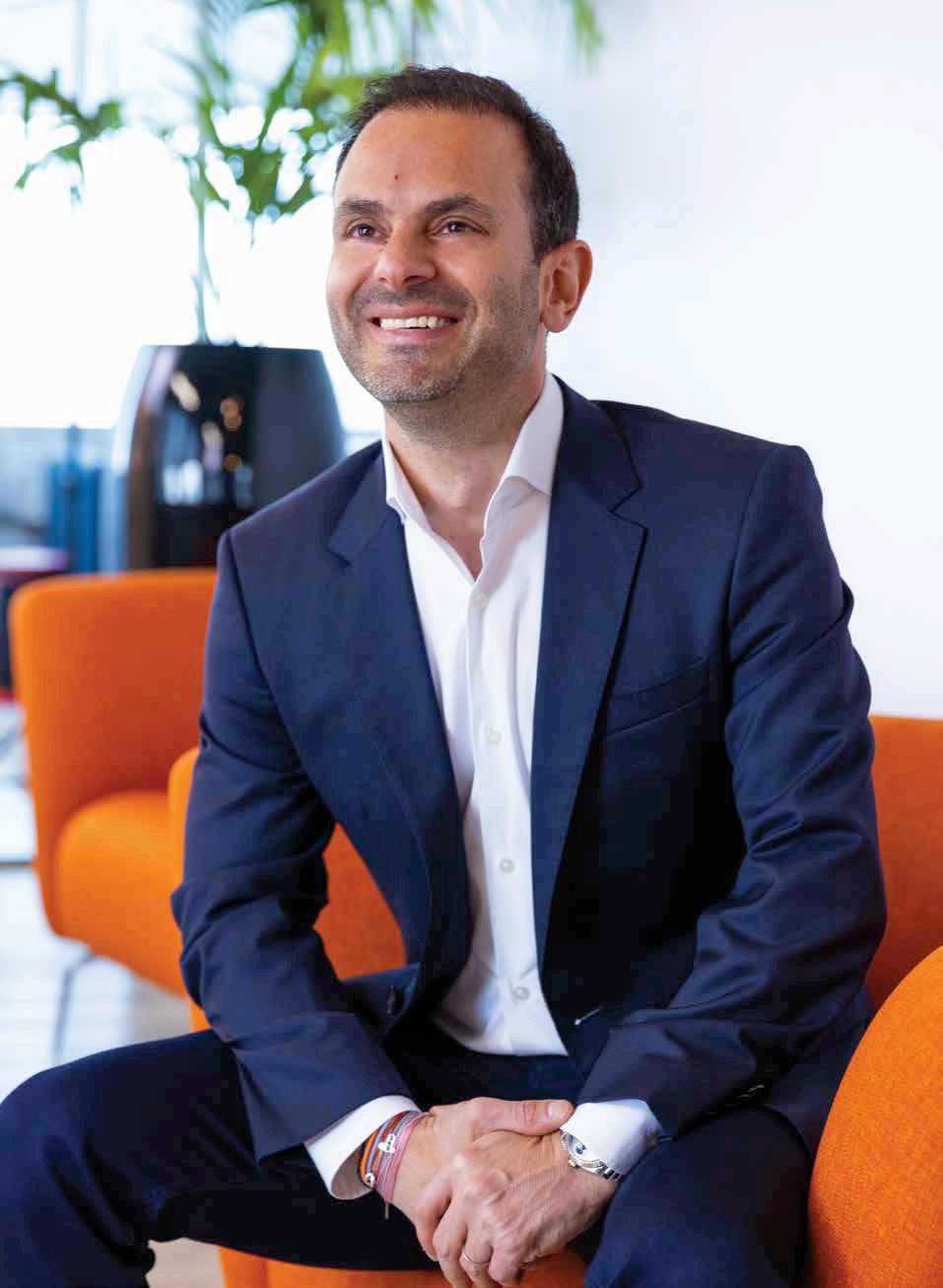


Focus for the next 12 months? Transformation.
Buzzword we need to kill? Techie.
Marketing needs to prioritise? Customer experience.
Marketing needs to change?
Shift from product-centric to customercentric.
Top lesson learnt in 2024? Patience.
What worries you the most? Time.
Biggest blessing in your life?
Reading people and situations. Value/principle that matters the most? Humility and honesty.
Next travel destination?
For work: Egypt. For leisure: Florence.
What is your pet peeve?
Sleeping! I feel like I’m not making the most of my time while sleeping.
Who do you look up to?
My grandma. She was a very wise woman. Favourite restaurant in the Middle East?
Hunter & Barrel.
What are you reading?
I love history and politics. I just finished ‘A Line in the Sand’ for the second time and now I am into ‘1917: Lenin, Wilson, and the Birth of the New World Disorder’.
Favourite hobby?
Cycling.
Top tip?
Businesses succeed or fail based on their team. Surround yourself with smart people who truly care about the business, not just those looking for a job.
By Amer El Hajj, CEO of GroupM MENA
When I read articles about our industry today or even review last year’s 2023 Power List MENA topics, it feels as though AI, technology, digitalisation, and data dominate our discussions.
These topics are not merely buzzwords; they represent critical trends shaping our daily operations. However, despite the excitement around technological advancements, everyone would do well to remember the essence of our industry’s purpose: client relationships and client satisfaction.
It’s not uncommon in our industry to hear clients’ express frustration about limited interactions with their agencies beyond their direct teams. While investing in tech stacks is crucial for maintaining competitiveness and operational efficiency, the heart of our success lies in nurturing strong, enduring relationships with our clients and delivering them results.
Improving chemistry with clients, rapport building exercises and information sharing activities should be on-going, not just booked in during pitches and challenging times of the year. This everyday commitment is fundamental to our role as media experts and advertising consultants.
AI, technology, and data analytics undoubtedly play pivotal roles in modern marketing strategies. They empower us to tackle daily challenges with precision and insight, but they are not enough by themselves. However, their value is enhanced when complemented by robust client relationships. Despite their undeniable importance, many marketers find themselves involuntarily prioritising infrastructure improvements over interpersonal connections with clients.
Innovation, technology, analytics are essential, but they are not enough by themselves. The danger lies in assuming that technological prowess alone guarantees client satisfaction. The reality is more nuanced.
While efficiency gains from technology are undeniable and allow us to automate at a rapid rate, true client loyalty and satisfaction stem from investing in great talent, nurturing client servicing skills, prioritising personalised interactions and providing an empathetic understanding of their needs. It’s about being present where our clients are, actively listening to their concerns, and responding with tailored solutions that demonstrate our commitment to their success and growth.
In our pursuit of operational excellence and technological innovation, we must not overlook the human element; the personal touch that strengthens bonds and fosters trust. This human touch is what sets exceptional agencies apart from merely functional ones. It requires creating environments where clients feel heard, valued, and understood beyond the metrics and analytics.
If our technological advancements do not align with client relationships and having the right team to collaborate closely with clients, we risk failure. Talent makeup should complement the client’s brand with diversity and inclusion, also playing a large role to offer our client’s businesses fresh perspectives and out of the box solutions.
Perhaps we should blend these tech advancements with different future-proofing methods, customer engagement strategies, and new frameworks for client experiences. Our focus should be on enhancing client retention, fostering robust partnerships, and building loyalty. And ultimately, innovation can only occur from human thinking and creativity from our own lived experiences.
Building lasting client relationships is a journey that demands time, effort, and genuine empathy. It involves aligning our internal processes and team dynamics to ensure every client interaction reflects our commitment to their satisfaction. This commitment extends beyond project deliverables; it encompasses proactive communication, transparent collaboration, and anticipating their evolving needs.
There’s no one-size-fits-all formula for successfully balancing technology focus with client partnerships. Both matters are crucial, but client relationships are uniquely individual. As we navigate the complexities of our industry’s evolution, let’s remember that our clients are at the core of everything we do.
They are not just recipients of our services but partners in our journey towards mutual success. By placing a renewed emphasis on client relationships and satisfaction, we not only enhance our competitive edge but also uphold the values defining our industry’s integrity and longevity.

While AI and technology propel us forward, it’s our commitment to exceptional client experiences that truly distinguishes us as leaders in our field. We should strive to cultivate meaningful connections, foster collaboration, and exceed expectations, ensuring that every client interaction reflects our dedication to their satisfaction and success.



Focus for the next 12 months? Our people.
Buzzword we need to kill?
“It has to be human-centric” (We are not talking to aliens yet).
Marketing needs to prioritise?
“Take care of your employees and they will take care of your business.” – R. Branson.
Marketing needs to change?
Stop being intrusive, focus more on creating value.
Top lesson learnt in 2024? Be resilient.
What worries you the most? Our people.
Biggest blessing in your life?
Doing the job that I dreamed of when I was young.
Value/principle that matters the most?
Passion, ownership, empathy, respect.
Next travel destination?
China again.
What is your pet peeve?
Administrative tasks.
Who do you look up to?
Everyone around me is a source of inspiration because there is something to be learnt from everyone.
Top tip?
Trust yourself.
BY Nathalie Gevresse, CEO, Publicis Communications UAE
I feel lucky in life because I get to do the job that I dreamt of doing when I was young. I get to work in advertising: a world of creativity, ideas and novelty. And I’ve been doing it for almost 30 years now. They say, “Choose a job you love, and you will never have to work a day in your life.” But the truth is that even when you do what you love, you need a lot of resilience.
This fact has only increased over the years, with things getting evermore fast paced, with exponential technological changes, with evolving consumer choices and preferences, ultra-personalisation, and constant market evolutions. Resilience is not just a desirable trait — it is a vital component of creativity.
And if your dream is similar to mine, then you realise this rather quickly after joining the industry. Resilience and creativity: these are two qualities quite intricately linked; as resilience fuels creativity, and creativity, in turn, strengthens resilience. The interplay between these attributes is particularly crucial in our industry, where challenges are constant, and the ability to adapt and innovate determines success and longevity.
“Resilience is accepting your new reality, even if it’s less good than the one you had before. You can fight it, you can do nothing but scream about what you’ve lost, or you can accept it and try to put together something good.” - Elizabeth Edwards.
In fact, resilience is about the stories you tell yourself because it reaches your nervous system, your emotions,
your mindset, it gets under your skin. Today, resilience is certainly one of the most needed values in our industry. Within the current, and future, technological or economic evolving environment, it is not about avoiding challenges, they are inevitable, but it is about facing them with courage and a growth mindset. It is about finding new
“The truth is that creativity is hard and so are careers in creativity. I believe that choosing to work in creativity is certainly one of the most admirable, passionate things you can do.”
ways to thrive, even when the old ways no longer work. But this requires not only a specific profile of talents but also a proper learning ecosystem within the work environment to support them.
While resilience supports creativity, creativity also plays a pivotal role in enhancing resilience. Just because
everyone can cook a dish, it doesn’t mean that everyone is good or a Michelin-starred chef. It is easy to have ideas, but it is much more difficult to turn them into successful ideas. For this, you need a combination of persistence, a relentlessness mindset, and a lot of flexibility. In a time of constant change, creativity in our industry is not just about generating novel ideas; it is about thinking strategically and adapting to new realities, navigating complexities, and finding unconventional ways to address challenges, which enhances resilience.
The truth is that creativity is hard and so are careers in creativity. I believe that choosing to work in creativity is certainly one of the most admirable, passionate things you can do. But let’s face it, it’s hard. There is never a dull moment or resting time, all is in constant change, requiring agility, and innovation in record time with multiple and complex challenges at all levels. Working in creativity doesn’t equip you only for a career; it also equips you for the ups and downs of life. The best companies know this, and they give you the flexibility you need, whether you are a working mom, whether you want to ‘work your world’, or whether you are working with cancer.
With the rapid pace of technological advancements and evolving consumer expectations, now more than ever, there will be greater demands on creativity and resilience. Creativity will be essential for devising innovative solutions and agile strategies, while resilience will be crucial in maintaining this creative momentum and navigating inevitable challenges.

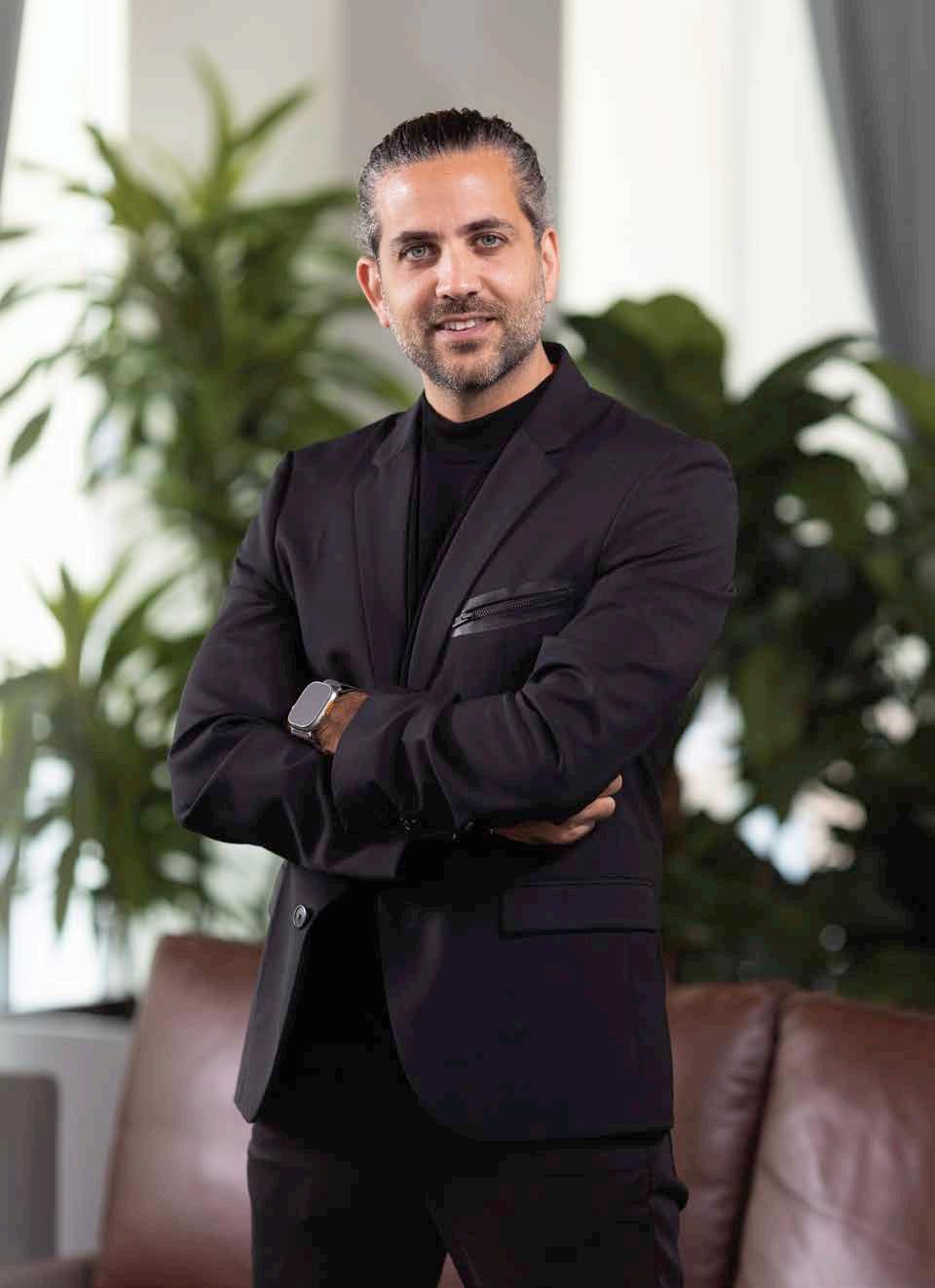


Focus for the next 12 months?
Read more.
Buzzword we need to kill?
“Thrilled to announce”.
Biggest blessing in your life?
After visiting Uganda, Rwanda and Kenya this year, as part of a company initiative to support Médecins Sans Frontières (MSF), my biggest blessing is that my family has a roof to sleep under, and food they can eat.
Value/principle that matters the most?
Treat people with respect.
Next travel destination?
For work, Saudi Arabia. For leisure, Lebanon.
What is your pet peeve?
Those who don’t take care of their health.
What are you reading?
‘Good to Great’ by Jim Collins
Favourite hobby?
Running.
Top tip?
Don’t limit your potential by limiting your belief.
significant opportunities for growth.
In this article, I will not be able to point out all the opportunities and challenges of the MENA ad industry, but rather will focus on a specific aspect: how consumers have shifted their behaviour and consumption patterns, and how industry specialists should adapt to these changes.
For years, TV advertising dominated MENA advertising investments. However recently we have seen digital advertising surpassing TV and accounting for more than half of the total ad spend. Of these digital expenditures, over three-quarters (some reports claim 90 per cent) are concentrated on Meta, Google, TikTok, and Amazon.
This shift is unsurprising given the technological advancements, innovation, and accessibility of these platforms. Search ad spending constitutes more than 30 per cent of global ad spend, compared to 14 per cent in the MENA region. Yet, we’re witnessing a dramatic shift in how people search for information.
I can’t recall the last time I searched for a restaurant on Google. Nowadays, people often find it easier to browse Instagram for pictures of meals. Similarly, they turn to X for real-time news and rely on TikTok for the latest recipes.
Technological advancements have introduced new search formats like Circle to Search on Android devices, streamlining the search process by eliminating the need to switch apps. Moreover, the growing popularity of AI language models like ChatGPT and Gemini suggests that a significant portion of future searches will occur within these platforms.
partnership with TikTok. This partnership allows for seamless in-stream purchases, eliminating the need to navigate to the Amazon app or website.
To accelerate growth, brand marketers should reassess their strategies and shift their focus towards improving their commerce ecosystems. By addressing the shortcomings in their online shopping experiences, marketers can better capitalise on the growing e-commerce market in the MENA region.
Finally, like all recent articles, AI should have their own dedicated section. AI is a dominant force in today’s technological landscape. Earlier this year, Chat GPT unveiled GPT-4, demonstrating significant advancements in intelligence and capabilities. Apple showcased its AI prowess and demonstrated it with the launch of iPhone 16, while Google quietly integrated Gemini AI into Chrome’s address bar.
These developments will revolutionise how people search, consume, learn, and purchase. As a result, we can expect a shift in how brands utilise AI. By adopting AI, businesses can make faster decisions and gain a competitive edge.
Accordingly, agencies, whether creative or media-focused will have to shift their focus, embracing AI to fuel their tools and shifting their search for talent, hiring those who are AI-fluent.
The future of advertising globally and in the MENA region is bright, but it requires a concerted effort from marketers and industry leaders to navigate the complexities and capitalise on the potential. Those who embrace these shifts will be better positioned to succeed. Those who fail to adapt to those shifts may find themselves at a disadvantage.




Focus for the next 12 months?
Continued growth and innovation.
Buzzword we need to kill?
“Disruptive”.
Marketing needs to prioritise? Relevance.
Marketing needs to change?
Shift from intuition to data-driven decisions.
Top lesson learnt in 2024?
It’s all about the team. What worries you the most?
The fast-evolving nature of the industry.
Biggest blessing in your life? Family, direct or professional.
Value/principle that matters the most? Integrity.
Next travel destination? Tokyo.
What is your pet peeve? Inconsistency.
Who do you look up to?
My two sons.
Favourite restaurant in the Middle East? Right Bite.
What are you reading?
The Anxious Generation. Favourite hobby?
Chess.
Top tip?
Always be positive.
By Ahmad Itani, Founder and CEO, Cicero & Bernay
We tend to divide time into neat segments, as if each respective period stands alone. The reality is far more fluid; the passage of time is continuous, and the lifespan of the spaces and tools we interact with reflects this. Platforms we rely on today are built on histories and choices, making their evolution inevitable: the ongoing conversation around behaviour and trust in social media is a perfect example, where every update, controversy, and technological shift nudges us closer to important turning points.
One pivotal moment came when users left X en masse, rejecting Elon Musk’s vision for it. The divisive reactions his arrival sparked highlight the deep emotional connections people have with these arenas, connections that are essential to maintaining their relevance. And relevance will be the focus in 2025. While Threads made an ambitious attempt to take over the space, it has since retreated, carving out a new, intriguing identity centered around storytelling. This evolution shows how platforms must (and will) continually adapt to meet the changing demands and values of their users.
The revelations about social media networks deliberately suppressing certain content have become central to discussions about integrity lately, and their role in riots and unrest elsewhere has sparked further debate. Despite these controversies, Instagram has maintained its user base and even taken on a more valued role in disseminating information during crises. Traditional news outlets are increasingly being
overshadowed by these mediums, so it’s no surprise that digital-first, youth-led news services like blinx and such have successfully stepped in to fill the gaps left by mainstream media.
As we move forward, users will likely become even more entrenched in their chosen digital routines. However, we can’t ignore the possibility of a seismic shift brought on by AI. A major artificially intelligent innovation or add-on could emerge on one of these platforms, drawing attention and reshaping the landscape entirely.
“ In 2025, we can expect richer metadata to surface around user behaviours and platform choices, especially as they are driven by the vivid emotions that world events have brought up.”
Snapchat, while no longer dominating the conversation, has shown resilience by engaging its core users and staying ahead of the curve in terms of technological enhancement, including AI hardware. Updates emerge with regularity about the exciting developments they have. The app may not be front and centre, but it continues to prove its versatility.
The much-anticipated augmented reality Meta world we were supposed to be living in by now never materialised, despite the column inches it received. Facebook’s role in this unrealised future didn’t become clear in 2024, and it’s unlikely to do so any time soon. What we can say is that its rivals are showing that smaller, user-focused innovations are what these trend-leading generations demand.
In 2025, we can expect richer metadata to surface around user behaviours and platform choices, especially as they are driven by the vivid emotions that world events have brought up. As Google continues to cling to its Chrome cookies, our approach to SEO is evolving, requiring marketers to adapt swiftly to ensure resonance. Without overstating it, our future is tightly tied to the future of digital habits, platform trust, and technological innovation.
In 2025, much will depend on how these channels respond to users’ demands, values, and ever-evolving expectations. While we may be checking off a new year on the calendar, the atmosphere will likely feel very familiar, leaving us to wonder if it’s us or them who have truly changed.

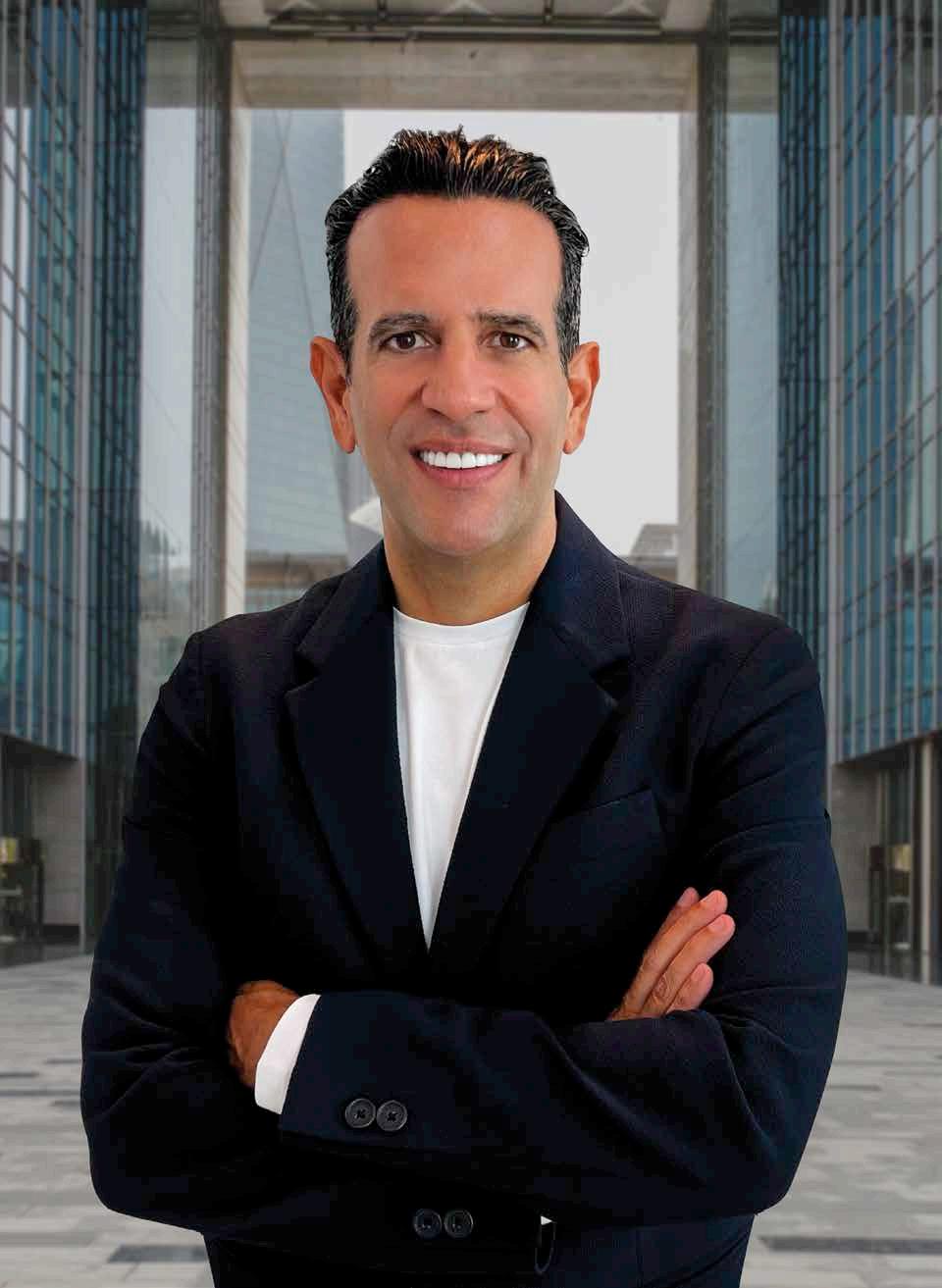


Creativity is the engine that drives our Never Finished story: from the DHL “Yesterdelivery” campaign that generated US$ 43mn in ad value, to the Nissan “Test Life” activation in Kuwait that generated +27 per cent increase from footfall to test drives and sales to, the Lipton “Ramadan Nights” campaign that extended those traditional gatherings in Saudi Arabia far past all previous KPIs. We believe brilliant ideas have the power to drive the bottom line, acting as an economic multiplier that grows our clients’ businesses and builds their reputations.
Focus for the next 12 months?
Our clients – always.
Buzzword we need to kill?
“We’re looking for a digital agency.”
Top lesson learnt in 2024? Numerology.
What worries you the most?
Polarised global politics.
Biggest blessing in your life? My daughter.
Value/principle that matters the most? Integrity.
Next travel destination?
Somewhere on the Horizon.
Who do you look up to?
Our Executive Chairman, Rafic Saadeh. What are you reading?
Zero to One: Notes on Startups, or How to Build the Future.
Favourite hobby? Travel & Discovery.
Top tip?
Never stop exploring.
consulting company. Our brand is based around our belief in the economic power of a brilliant idea that impacts culture, changes minds and behavior, and can even make the world a better place. That’s why clients who work with us view the business of creativity as an investment, not a cost.
This is not just ad agency propaganda. The latest IPA report says that 79 percent of financial analysts value a company’s ‘brand and marketing’ equity over ‘technology’ or even ‘profit’. That perspective is clear when we review some of the most significant global pitches in the past year, as clients continue to hire both large global agencies and newer, more agile challenger agencies with strong brand identities and creative approaches. The power of data and new technologies, such as AI and machine learning, are now accessible across the scale of agency sizes and are not confined to the global holding companies.
“The best agencies empower their employees to shape their companies and become proud of the brands they represent.”
Our business is about people. The best agencies are filled with the best and brightest talent, which is the same for the most successful brands, and that is why agency brands will always matter and why we continue to invest in our people.
At my home in MENA, we expect strong and steady regional economic growth through 2025. We continue to navigate our own set of challenges and opportunities, including political tensions, issues of nationalisation of assets, the education and training of our young people and the increasing branding sophistication of our consumers and our clients.
But despite these challenges, we’ve enjoyed great success in our region with innovative, creative and engaging new campaigns for global clients, such as DHL and Lipton, and for local brands like the advocacy/aid group, The Children of Female Prisoners Association.
We believe that our region, our clients and our people deserve the hard work, integrity, creativity, and passion that we deliver to our clients and our communities, to lay the groundwork for the success of our future generations. That’s why it’s crucial to invest in programmes and initiatives to attract and develop a diverse and inclusive team of young talent, and we will continue to partner with educational institutions, vocational training centers and government agencies to make this future a reality.
The best agencies empower their employees to shape their companies and become proud of the brands they represent. That combination invariably leads to the best work. And that’s what every CMO should want, from Dubai to Detroit.




Focus for the next 12 months?
Building relationships – professional and personal.
Buzzword we need to kill?
Matcha!
Marketing needs to prioritise?
Insightful, locally relevant communication.
Marketing needs to change?
Keep doing the same thing and expecting a different result.
Top lesson learnt in 2024?
Democracy is not so democratic in our world.
What worries you the most?
The situation in my home country, Palestine.
Biggest blessing in your life?
Family and ‘framily’ – friends who became family.

Value/principle that matters the most?
Respect, humility, and genuineness.
Next travel destination?
Japan, one day!
What is your pet peeve?
People who don’t try.
Who do you look up to?
My late father.
Favorite restaurant in the Middle East?
Abu Jbara. If you know, you know.
What are you reading?
A book in Arabic by Dr. Ahmed Khaled
Toufic. A collection of short stories about paranormal activities. I don’t read it at night!
Favourite hobby?
A new interest, more than a hobby –educating myself about financial markets.
Top tip?
Don’t be scared to fail, life will happen either way!
By Reham Nader Mufleh, Managing Director, Horizon FCB
It’s no secret that the advertising landscape is continuously changing. Advertising in the Middle East specifically is experiencing a transformative phase, driven by rapid digitalisation and steered by a new generation.
And there is no surprise there. Young people are, and will always be, the advocates and drivers of change. In our region, young people are the largest and one of the fastgrowing demographics, so they naturally play a pivotal role in shaping the advertising scene. And they are not just consumers but also trendse ers, influencing purchasing decisions and brand perceptions.
Our youth, or Gen Z as we call them today, are the next generation’s moms, dads, marketers, clients, and even advertisers. They are the ones who will be in the driving seat next, if not already there. They are more aware, ethical, authentic, exposed, advanced technologically, socially aware & storytellers.
For marketers and brands, connecting with Gen Z would significantly reshape the advertising industry by shifting the focus toward more authentic, engaging, and socially responsible strategies. As this demographic increasingly demands transparency and relatability, brands will need to move away from traditional advertising models that prioritise polish and perfection, instead embracing raw and genuine storytelling that resonates with their values and experiences. The rise of digital platforms and influencer culture will further drive innovation in campaign strategies, encouraging the use of interactive and immersive content that fosters community and participation.
Ultimately, understanding and integrating into their interests and lifestyles, as well as speaking their language (rather than speaking at them), will enable brands to establish strong brand loyalty and advocacy, transforming the industry by prioritising empathy, inclusivity, and meaningful connections over mere transactions. And, as a result, advertising will become a more dynamic and responsive environment, be er reflecting the diverse voices and aspirations of the younger generation.
This all sounds great and on paper makes total sense, but would this be enough to ‘crack Gen Z code’? Do we really want to be ‘the-40+-year-old-bunch’ that sits in a room throws theories, makes assumptions and speaks on their behalf?
It’s very interesting to see how most marketers and advertisers now use the term ‘Gen Z’ casually whenever they want to either impress or feel that they ticked all boxes. Not realising that we were like them once and needed to belong, feel heard, be acknowledged and have a voice.
This is not rocket science. Similar to previous generations and generations yet to come, we need to connect with our young people by immersing ourselves in their culture and spending time with them. We must listen to their conversations, follow their pages, hire them and make them part of our entourage. Not only is this basic industrial psychology, it’s also common sense.
It’s like when a middle-aged songwriter, who has fallen in and out of love several times through their life is divorced and has two children, needs to be able to write a song that will resonate with teenagers. Through the lyrics they make them taste the sweetness of the beginnings of young love, cry from the pain of first heartbreak, and feel the electricity of the first touch.
We are no different. We’re the artists, the creators, the storytellers. We express ideas, harness creativity, entertain, inform and weave a narrative that must speak to all audiences.
By cracking this fusion of ‘channeling our inner teenagers’ and ‘mastering the artistry of storytelling’, we can help brands create a powerful platform for communication to inspire, evoke emotions, and empower young people to see themselves in the stories being told. Have we cracked the code?



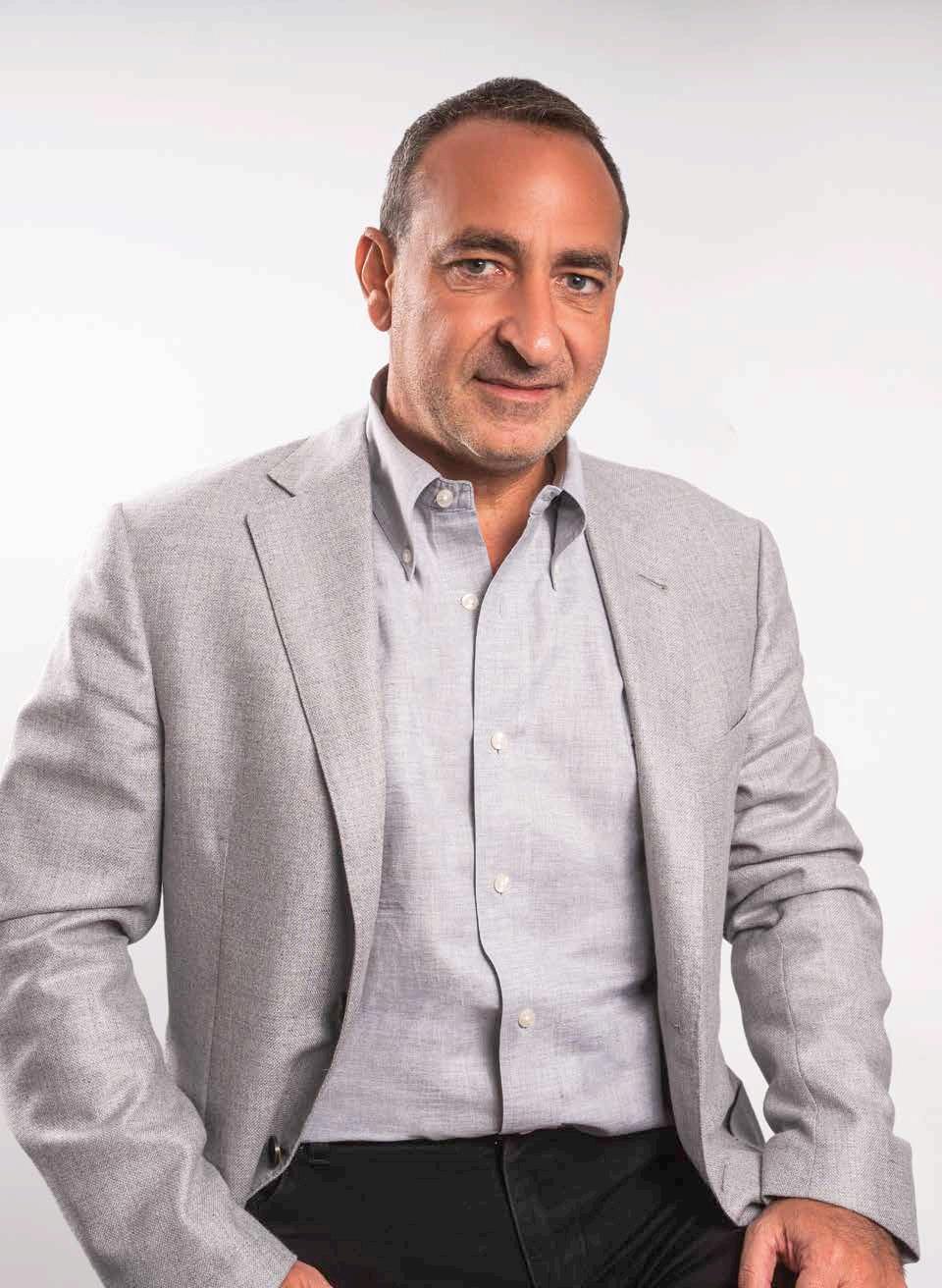


structured, with all disciplines under one roof and working towards a shared goal. Collaboration thrives on two critical elements: the right mindset and the right framework. Generosity, openness, and team spirit are essential, but they must be paired with clear structures to drive results.
“Collaboration thrives on the right mindset and the right framework. Generosity, openness, and team spirit are essential, but they must be paired with clear structures to drive results.”
That’s where our integrated model comes into play, allowing us to operate fluidly across disciplines –whether it’s creative, media, production, or strategy. This cross-functional approach ensures that the solutions we bring are tailored to client needs, not bound by traditional silos. Our growth teams are constantly looking for opportunities to foster internal cross-pollination between disciplines, ensuring we don’t just solve problems in isolation but create value across the board. Take our dashboards as an example. They’re not just a tool for media or performance – they add value across disciplines by providing insights on
approach. The results speak for themselves: 62 per cent of our revenue now comes from clients who rely on us for more than one line of service.
Our success isn’t just driven externally – it starts within. Across Havas, from leadership to individual teams, there’s alignment and belief in the value of collaboration. Strategy and data consulting, for instance, have grown four fold year-on-year, a direct result of teams recognising how these solutions can elevate their work and drive better outcomes for clients. When leadership fully buys into the model, it creates an unstoppable momentum that drives growth across the organisation.
Looking forward, our new Converged strategy will take this even further, building stronger bridges between creativity, media, production, and technology.
At the core of Converged is a new Operating System, designed to deliver integrated, meaningful value through four steps that mirror the client journey: intelligence, design, activate, and measure. Powered by data, technology, and AI, with creativity at its heart, this new OS will be rolled out across all areas of expertise, empowering our 23,000 talents to work smarter, faster, and more effectively. This isn’t just about efficiency; it’s about crafting more innovative, impactful solutions. By combining the latest in tech with our creative expertise, Converged will enable us to not only keep pace with change but to lead it.
Additionally, our expansion through ventures like Liquid Havas and H/Advisors is a testament to our commitment to collaboration and integration. As we continue to grow, our focus remains on building a seamless model that leverages the strengths of every team, ensuring we can deliver unmatched value to our clients.
At the end of the day, collaboration isn’t a buzzword – it’s the engine that drives business success. Our clients don’t just benefit from individual talents; they gain access to a team united by a shared vision to create meaningful, lasting impact. The future demands nothing less.
Focus for the next 12 months?
Accelerate the transformation across our Middle East operations.
Buzzword we need to kill?
Always on.
Marketing needs to prioritise?
Partnerships.
Marketing needs to change?
Double standards.
Top lesson learnt in 2024?
Patience is a virtue.
What worries you the most?
Globalisation of indifference
Biggest blessing in your life?
My family.
Value/principle that matters the most?
Generosity.
Next travel destination?
Riyadh.
What is your pet peeve?
Beating around the bush.
Who do you look up to?
Pope Francis.
Favourite restaurant in the Middle East? Zuma.
What are you reading?
‘Atomic Habits’.
Favourite hobby?
Football.
Top tip?
Try, try, try.
At Havas Middle East, the past six years have been a remarkable journey of growth, innovation, and dedication. I’m incredibly proud of what we’ve accomplished as a team. From expanding our regional footprint to delivering forward-thinking solutions, our success is driven by passion, creativity, and collaboration. Our achievements –entering new markets and launching cutting-edge services – reflect the talent and determination that define us. Today, we stand stronger than ever, with a reputation for delivering meaningful results. As we look ahead, I couldn’t be prouder of the milestones we’ve reached and the opportunities ahead.




transformed adversity into a launchpad for success has been a defining point in my career.
Focus for the next 12 months?
Redefine excellence and own tomorrow.
Buzzword we need to kill?
It’s time to retire digital transformation, we’ve already transformed, now let’s innovate and redefine the game!
Marketing needs to prioritise?
Balancing the focus on short-term performance while preserving and enhancing long-term brand equity.
Marketing needs to change?
Stop playing it safe and start breaking the rules.
Top lesson learnt in 2024? Comfort breeds complacency; discomfort drives growth. What worries you the most? Stagnation.
Biggest blessing in your life? Relentless ambition and a supporting family that fuels it.
Value/principle that matters the most? Accountability without excuses. No blame, just responsibility.
Next travel destination?
Amalfi Coast.
What is your pet peeve?
Arrive late, and you’ve already lost me. Who do you look up to?
Omnicom’s visionary “Shark”. His relentless pursuit of perfection, fearless determination, and ability to push limits inspire me every day.
Favourite restaurant in the Middle East? Cipriani, Dubai
What are you reading? ‘Relentless’ by Tim Grover, delves into what it truly takes to be unstoppable in any journey.
Favorite hobby? Padel.
Top tip?
Impossible is nothing: If it’s not impossible, you’re not dreaming big enough.
By Wissam Najjar, Chief Operating Officer, OMG MENA
There’s a narrative out there that suggests media agencies are on the decline, rendered obsolete by the rise of automation, programmatic buying, and direct-to-consumer models. But the reality couldn’t be more different.
Far from being unnecessary, media agencies are more essential today than at any point in history. As brands navigate an increasingly fragmented and complex media landscape, they are realising that their success hinges on the expertise, strategy, and innovation that only a trusted partner can provide.
Today’s media landscape has evolved into a labyrinth of platforms, devices, and channels, each governed by its own set of rules, algorithms, and complexities. It’s no longer about simply buying ad space, it’s about mastering an ecosystem that demands seamless, personalised experiences at every touchpoint. Brands are under pressure to navigate a perfect storm of challenges: data privacy concerns, shifting regulations, and relentless technological advancement. This is where media agencies come in, not as intermediaries but as navigators.
Brands need more than just impressions, they must cut through the noise, bring order to chaos, and achieve measurable impact. Whether it’s crafting seamless cross-channel strategies, leveraging data to create personalised experiences, or staying ahead of rapid technological shifts, brands can navigate and thrive in an ever-evolving ecosystem with the right strategic guidance and expertise supporting them.
As the complexities grow, the expectations placed on brands have never been higher. Gone are the days when simply reaching a broad audience was enough. Today’s clients need to reach the right audience at the right time with the right message, and they need to do it in a way that drives tangible business outcomes. This requires not just technology but insight, creativity, and a deep understanding of how to weave together different channels into a cohesive narrative.
This is where the collaboration between clients and agencies becomes essential. Internal teams, no matter how capable, often don’t have the bandwidth or the breadth of
expertise and always benefit from the specialised expertise and support agencies provide. By bringing together marketers, data scientists, strategists, creatives, and technologists, both clients and agencies help craft campaigns that are both efficient and impactful. This partnership ensures brands always remain agile and ahead of the curve.
Even with the rapid advancemenrts in data and technology, creativity remains the beating heart of effective media campaigns. While automation may streamline processes and enhance efficiencies, it will never replace the magic of a well-crafted message that resonates emotionally with its audience. In a world flooded with content, creativity is the spark that sets a brand apart and makes it unforgettable.
The media industry today calls for bold leadership, a commitment to push boundaries, take calculated risks, and constantly challenge the status quo. In this evolving landscape, agencies and clients must work hand in hand to embrace new platforms, experiment with emerging technologies, and stay ahead in an increasingly competitive environment. Together, we are not just following trends, we’re setting them, guiding brands through today’s complexities with confidence and vision.
Brands that partner with forward-thinking agencies are better positioned to adapt, innovate, and thrive in a world that rewards boldness and creativity. Media agencies aren’t relics of the past; they are dynamic, essential partners, guiding brands through one of the most complex eras in media history. As the landscape shifts, the value of this partnership will only grow. Today, clients don’t just need a partner who can execute, they need a partner who can lead.
To those who believe agencies are becoming less relevant, I say: think again. The brands and agencies that truly grasp the value of their partnerships are the ones poised to thrive in this new era. Far from fading into irrelevance, media agencies are stepping into a future where our role is not just to survive but to lead the industry forward with vision, creativity, and purpose.

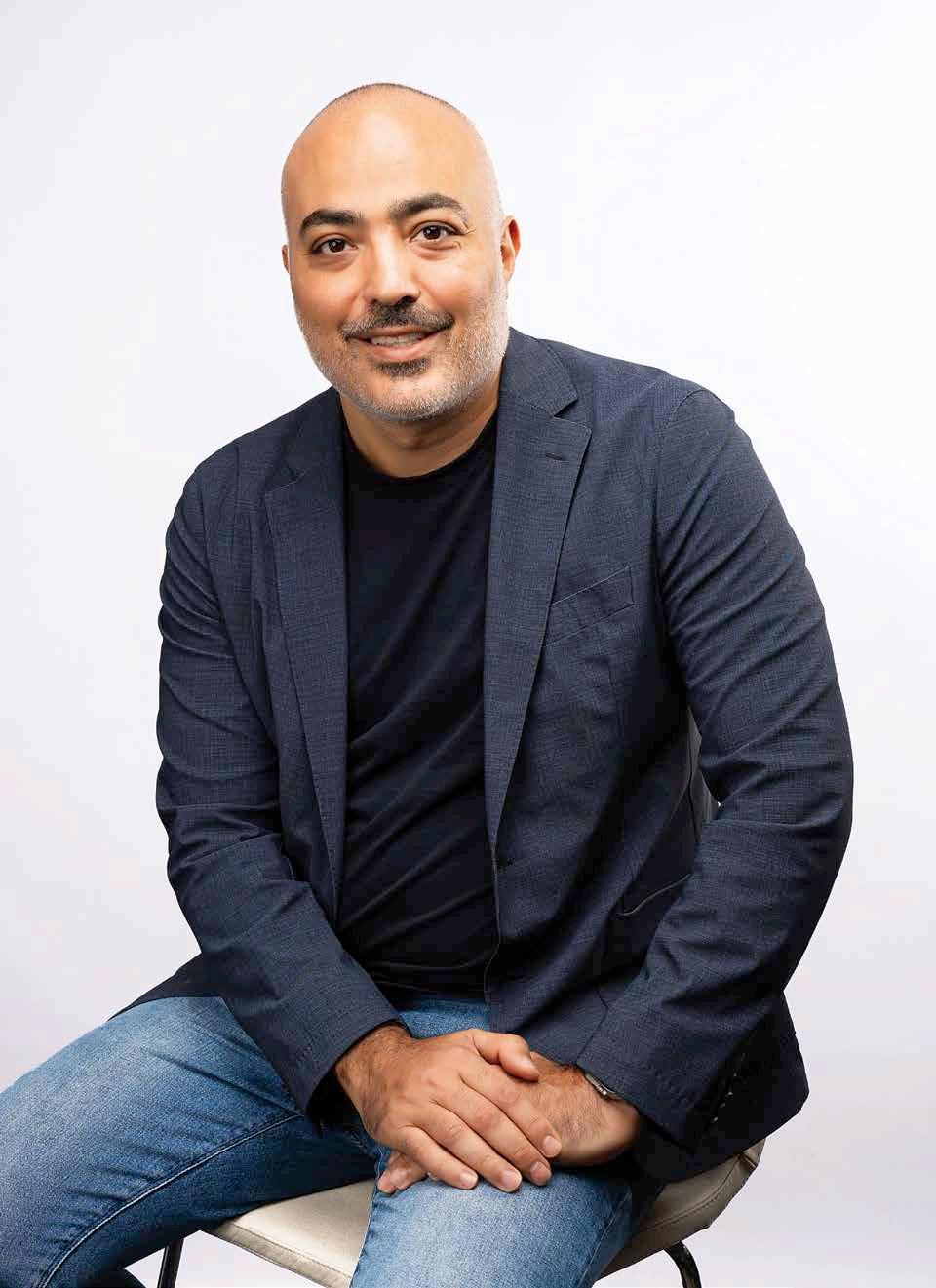


Focus for the next 12 months?
Bringing back colour and beauty into our industry.
Buzzword we need to kill?
‘Best practice’.
Marketing needs to prioritise? Inspiration.
Top lesson learnt in 2024?
Surround yourself with great minds.
Biggest blessing in your life? My family.
Next travel destination? Istanbul.
Your pet peeve?
PowerPoint presentations with poor design.
Favorite restaurant in the Middle East? McDonald’s.
What are you reading?
‘Scary Smart’.
Favourite hobby?
Indoor playgrounds.
Top tip?
Don’t always assume the crowd is going in the right direction.
“The future of our industry hinges on the final brief we deliver to machines – a brief that will decide whether we remain on a path of mediocrity or carve out a future brimming with passion and innovation.”
As we delegate more of our processes to machines, leveraging their intelligence and innovation, we must ask ourselves: Has our recent work truly represented the peak of our capabilities? Or, in our relentless quest of best practices, are we at risk of being remembered as the dark age of marketing?
Our obsession with best practices has turned us into maestros of efficiency, perfecting the art of rapid execution and deploying strategies across platforms at breakneck speed. While AI has driven a 40 per cent increase in media optimisation efficiencies this year – amplifying our capabilities – our relentless pursuit of optimisation has led us into a dangerous trap.
We’ve allowed uniformity to eclipse uniqueness, and speed to outweigh substance. Brands that once stood out now converge in the same spaces, speaking the same language, and offering little in the way of true differentiation. In essence, we have raced to the mean, creating a world of bland brands.
While machines are powerful tools, they are limited in their ability to pivot once set on a path. Without deliberate efforts to cultivate differentiation, we risk diminishing our brand’s ability to stand out in an increasingly competitive landscape.
As we embark on this transformative journey, we are presented with an extraordinary opportunity to redefine how brands connect with the world. But to seize it fully, we must first confront the homogenised landscape we’ve created and take bold, decisive steps to recalibrate our approach.
In the end, the future of our industry hinges on the final brief we deliver to machines – a brief that will decide whether we remain on a path of mediocrity or carve out a future brimming with passion and innovation.
Now is the time to lead a renaissance in our industry. While we have achieved significant progress, the future demands a final brief that transcends simplistic, black-and-white thinking.
Machines must be guided to look beyond mere metrics, embracing the full spectrum of possibilities – bringing the human touch of empathy, creativity and beauty to the forefront of advertising. We must rise to the challenge of breaking free from the comfort zone of best practices.




This is epitomised by brands like Jacquemus and Loewe, which craft stories that deeply resonate with consumers and emphasise exclusivity and sophistication.
What’s striking about these luxury brands is their ability to remain true to their core identity while adapting to fast-changing times. Jacquemus, for instance, doesn’t just sell fashion; it sells a vision of bold, innovative design. Known for its avant-garde approach, Jacquemus has successfully maintained its reputation for pushing boundaries while embracing the digital age. Its storytelling revolves around challenging fashion norms and adopting a new, edgy aesthetic, resonating with a younger, trend-conscious audience without losing its haute couture essence.
Loewe illustrates how a luxury brand can reinvent itself while staying true to its high-fashion roots. Originally renowned for its traditional craftsmanship, Loewe has managed to blend this heritage with contemporary trends. The brand’s engagement with vibrant TikTok trends and collaborations with modern artists showcases its adaptability and youthful spirit. Loewe’s ability to merge haute couture with playful, cutting-edge trends highlights its commitment to both tradition and innovation, connecting with a diverse, global audience.
More luxury brands are innovating while staying true to their ‘savoir-faire’, or unique expertise and identity. Brands like Gucci, Dior, and Louis Vuitton have embraced innovation by becoming pioneers in integrating the metaverse into their overall strategies. For example, Gucci launched a virtual garden in Roblox, allowing users to explore and purchase digital products, while Dior created unique experiences in the metaverse to engage with younger audiences. Louis Vuitton also joined the digital world by hosting a virtual fashion show in the online game League of Legends, where players could experience their latest collection in an immersive environment.
In addition to their innovative initiatives, brands are evolving by collaborating with celebrities who resonate with younger audiences. A recent example is Dior’s campaign featuring Rihanna as the new face of J’adore, which connects with a demographic that idolises her. Similarly, Tiffany & Co. has made regional distinctions by choosing singer Nancy Ajram to resonate with local audiences, further enhancing their appeal in the market.
The lesson from these luxury brands is clear: it’s not just about keeping pace with technology or chasing fleeting trends. Enduring success comes from maintaining a strong sense of identity and purpose. In a fast-paced world, it’s easy to get swept up in trends and lose sight of what makes a brand unique. Luxury brands navigate this landscape with a long-term vision, building narratives that enhance their offerings rather than diluting their identities for short-term gain.
Creating compelling and enduring narratives can transform the ordinary into the extraordinary. By adopting the luxury brand approach of selling stories rather than just products, brands can forge deeper connections with customers and unlock authentic, sustainable growth.
In times of rapid transformation, humans continue to dream, yearn, and aspire—perhaps more than ever. Authentic connections and meaningful narratives ignite our passions and drive us to reach for something greater. Amidst the noise, we turn to legacy brand they tell their stories with heart and soul.
Brands that master this art will not only thrive but also make a lasting impact on all of us.
Focus for the next 12 months?
Foster transformation while building trust and strong leadership with both teams and clients.
Buzzword we need to kill?
‘Going viral’.
Marketing needs to prioritise?
Consumer centricity and drive omnichannel experiences.
Marketing needs to change?
Break silos and encourage collaboration to create cohesive strategies that reflect all aspects of the brand.
Top lesson learnt in 2024?
Never be afraid of change; embrace it as an opportunity for growth and always know your value.
What worries you the most?
The thought of ceasing to dream.
Value/principle that matters the most?
Resilience and perseverance.
Next travel destination?
Tokyo, Japan.
What is your pet peeve?
When people use excuses to obscure the truth instead of being transparent and straightforward.
Who do you look up to?
I look up to my mom; she taught me to always believe that no matter how difficult the situation may seem, tomorrow will bring a better day.
Favourite restaurant in the Middle East?
Kami Sushi in Gemmayze, Lebanon.
What are you reading?
Atomic Habits.
Favourite hobby?
Skiing with my kids and husband, as well as exploring authentic restaurants.
Top tip?
Always focus on solutions not problems, and never compare yourself to others; simply concentrate on your own journey.
Spearheading a groundbreaking media transformation for LVMH in the MENA region. Through a comprehensive digital overhaul and the successful launch of more than 20 e-commerce platforms, we were able to significantly enhance the region’s visibility and competitiveness on the global stage. This transformation not only elevated MENA to be on par with other key markets but also set a new standard for balancing brand prestige with performance-driven results. A critical aspect of this achievement was the deep, strategic alignment I fostered with our clients.




The MENA region, with its emphasis on human connection and shared values, offers the perfect environment to showcase how data and AI can deepen relationships between brands and consumers.
Here, in the heart of this culturally rich and diverse region, data is no longer just a tool for optimisation – it’s the means by which brands can cultivate genuine connections that resonate on a human level. In the MENA context, relationships are built on trust, empathy, and shared experiences, and it’s this essence that data helps brands to nurture.
Picture a future where brands and consumers aren’t merely exchanging information, but are involved in an evolving relationship. Data serves as the trusted ally that enables brands to act with empathy, anticipate needs, and offer the kind of thoughtful gestures that turn a transaction into a meaningful moment.
Leading MENA-born brands – airlines, hospitality groups, and more – have already mastered this, translating data into personalised experiences that feel as genuine as a friend’s well-timed message. Whether it’s a thoughtful gesture during Ramadan or a culturally nuanced offer that recognises the uniqueness of a particular audience, data is the new language of connection.
In a region where the collective is as important as the individual, brands that tap into data are able to go beyond personal interactions and foster communities. Brands that listen deeply and act thoughtfully build not only customer loyalty but also advocates who feel emotionally invested in their success. This sense of community, built on trust and
shared experiences, is a powerful testament to the role data can play in enriching human relationships.
MENA’s distinctive cultural fabric positions it as the ideal testing ground for this data-driven marketing evolution. When wielded wisely, data has the power to elevate human connection, to help brands navigate cultural nuances with precision, and to nurture relationships that last. It’s not about outpacing competitors; it’s about using data to create bonds that transcend the transactional and endure in the hearts of consumers.
“Brands that listen deeply and act thoughtfully build customer loyalty and advocates those who feel emotionally invested in their success.”
This human-first approach is the future of marketing in MENA. Brands that intertwine data with creativity are the ones telling the most compelling stories, celebrating shared values, and building legacies. The success of MENA brands in global markets proves that when data is used to serve human needs, the result is not only stronger brand equity but also lasting connections that fuel enduring success.
RAPID FIRE
Focus for the next 12 months?
Harnessing the power of AI.
Buzzword we need to kill?
Game-changer.
Marketing needs to prioritise?
Big ideas.
Marketing needs to change?
Myopic short-term tactics.
Top lesson learnt in 2024?
Unlocking the true potential of AI.
What worries you the most?
Ignorance with arrogance.
Biggest blessing in your life?
Maya, Yasmina, Julian and Tamara.
Value/principle that matters the most?
Humility and perseverance.
Next travel destination?
AlUla.
What is your pet peeve?
Long voice messages.
Who do you look up to?
Firefighters.
Favourite restaurant in the Middle East? Rohan at The Arts Club.
What are you reading?
Play Bigger
Favourite hobby?
Collecting fine-aged beverages.
Top tip?
Cherish relationships.
CAREER HIGHLIGHT:
Dani has been honoured as the Dubai Lynx Advertising Person of the Year. Under his leadership, over the last three years, his agency has garnered an impressive 36 Agency and Network of the Year Awards, including Campaign’s Global Best Network in MEA three times and has held the title of Cannes Lions Regional Network for six years running, winning four Cannes Lions Grand Prix. He is leaving a mark on creativity with purposedriven campaigns, which positively impact our planet, freedom of speech and diversity.




pivotal moment. Rapid economic growth, ambitious national diversification and investment strategies –particularly in the Arab Gulf countries – have opened the door to immense growth opportunities.
However, opportunity is always closely shadowed by challenges. Success today depends on a clear vision and a comprehensive strategic approach.
This begs the question: how do you develop a clear vision and strategy to set yourself up for success? For me, it comes down to one guiding principle: purpose-driven growth.
Many firms continue to operate within the confines of the age-old premise that profit is the top and bottom line of every business. So, let’s take that as our starting point, and dispel it as a relic of another time.
Companies today need to be grounded in, and grow from, a common purpose. Today’s generation of conscientious consumers is less willing to engage with enterprises unless they adhere to a clear set of values and make a meaningful impact through their work. And this is the root of purpose-driven growth.
Purpose is not just a slogan. It’s the driving force behind lasting success. Over the years, I’ve found that true satisfaction comes from seeing our clients succeed in their endeavors and knowing we contributed to that journey. This is especially true of the Middle East and North Africa, where we are often fortunate to be part of national transformation projects, working with people who are moving the needle on entire societies, economies and communities.
Today, the region’s economic growth and diversification is accelerating at lightning speed. And APCO’s involvement in significant initiatives in the UAE and Saudi Arabia, such as the hosting of COP28 in the UAE and the World Economic Forum Special Meeting in Riyadh to mention just a few, speaks volumes of our commitment to supporting the
multiple mega-tourism projects in Saudi Arabia, further cementing our role in the region’s development.
As one of the fastest-growing regions in the world, MENA presents a remarkable opportunity not only for us, as a firm, but also for the vast majority of international businesses operating here. An example that demonstrates this point is this: in August 2023 just three months before COP28 UAE, APCO Insight conducted global research across 39 countries. Our research revealed that sustainability and climate action are top priorities across generations and geographies. One of the most telling findings of our research, particularly in the Middle East, was about employability: young talent overwhelmingly prefers companies with a clear, genuine commitment to sustainability.
If your company’s purpose is to make people happy, or in our case, to build the un/common ground upon which progress is made, the challenge lies in embedding that purpose into every aspect of your organisation. The biggest ambassador of any brand is its employees. Building a model that they believe in helps capture and embed the diverse values across multiple generations that can build a sustainable brand.
The path ahead is filled with both opportunities and challenges. By focusing on purpose, sustainability, and a genuine commitment to ESG, regional players in MENA can build a legacy that extends beyond mere profit and puts people, the planet and our shared prosperity front and center.
I hate to generalise, but for a long time, businesses, as well as our industry, dismissed purpose as fluff and triple bottom line as a punchline. It was an inhibitor to business, or it was a box to tick. Those days have gone. You simply can’t scale, hire, sell or connect without it, and that should tell us something. Purposedriven growth is really the only kind of sustainable growth there is.
Focus for the next 12 months?
New, innovative products and services, and happy clients.
Buzzword we need to kill?
“Outside the Box.”
Marketing needs to prioritise?
Target audience.
Top lesson learnt in 2024?
Change is constant.
What worries you the most?
Missing perspective.
Biggest blessing in your life?
Family and friends.
Value/principle that matters the most?
Empathy.
Next travel destination? China.
What is your pet peeve?
“Can’t do it.”
Who do you look up to?
My mother.
Favourite restaurant in the Middle East?
Il Borro Tuscan Bistro Dubai in Jumeirah Al Naseem.
What are you reading?
The Anxious Generation by Jonathan Haidt.
Favourite hobby? Boxing.
Top tip?
Think positive.
Growing APCO’s MENA office from a team of 15 in 2006 to more than 360 in 2024 has been a proud and humbling journey, to say the least. Our strength and unity at work are characteristics of our teams that I deeply appreciate and admire. The way we work is centered around our people; it is their grit, expertise and strong sense of collaboration that continues to drive our growth. APCO also draws on a deep pool of talent, knowledge and expertise from nearly 1,200 people from more than 30 global offices to every client we have. If I can take away one thing from the years that I’ve spent in this role, it is that our creativity and entrepreneurial mindset are what make APCO stand out, and I am so proud of that.




innovation, and industry leadership.
Focus for the next 12 months?
Maintaining the company’s impressive growth trajectory.
Buzzword we need to kill?
All of them, if all we are doing is just trying to sound impressive without providing real substance.
Marketing needs to prioritise?
More accurate data-driven decision-making for better customisation.
Marketing needs to change?
In the dynamic world of business, where the only constant is change, we need to continuously evolve to remain effective.
Top lesson learnt in 2024?
Investing in innovation and technology pays dividends in both the short and long term.
What concerns you the most?
Helping young professionals find their way to success and making sure that they feel important as part of the group, encouraging people who have joined our family to add
value both to the companies and to themselves.
Biggest blessing in your life?
My three amazing daughters.
Value/principle that matters the most?
Integrity.
Next travel destination?
For business, an industry event; for leisure, somewhere quiet please.
Who do you look up to?
I have always deeply appreciated the opportunities that the UAE leadership has given to so many people.
What are you reading?
Mostly trade and industry publications.
Favourite hobby?
I’m a sports fan. So, this year, I really enjoyed watching the Euros and the Olympics.
Top tip?
The key to long-term success and growth in the UAE is a willingness to continually learn and adapt with agility: remaining stagnant is a sure-fire recipe for failure.
By Ammar Sharaf, Founder and CEO, Viola Communications
Reflecting on more than 30 years in the marketing and communications industry, I am both humbled and proud of the transformative journey I’ve been on as the Founder and CEO of Viola Communications.
Having always been actively involved in the region as a corporate leader, I’ve had the unique opportunity to not only contribute to the growth and maturity of modern marketing communications but also to shape its future and influence responses to the rapid changes we encounter daily. My career has been defined by a relentless pursuit of innovation and excellence, propelling Viola Communications to its leading position in the UAE market.
I still vividly remember stepping into the office for the first time, filled with excitement and determination to follow my vision of building something remarkable. As the first one through the door, I laid the foundations for what would become one of the most dynamic and innovative marketing and communications groups in the region. Each decision, challenge, and success during those early days was a step toward realising this dream.
Founded in 2001, Viola Communications has grown into one of the largest integrated communication organisations in the region. Our team, comprising over 300 professionals from more than 20 nationalities, operates from our headquarters in Abu Dhabi and offices in Dubai and Cairo. I have immense pride in how Viola
has expanded its services since then to offer a uniquely comprehensive in-house marcomms solutions, including media planning, advertising, public relations, events management and production, digital marketing, and outdoor media solutions. This holistic approach has further support from our subsidiaries – Purple Exhibitions, Purple Printing, and the soon-to-be-launched Purple Digital Solutions.
To be honest, we have passed so many important milestones over the years, but among my proudest achievements this past year is seeing Viola consolidate its healthy financial position with continuous growth and business expansion.
In addition, being ranked in the top ‘Best Workplaces in the Middle East’, #4 ranking among the Best Workplaces in Media, Advertising, and Marketing in GCC, and one of the Best Workplaces for Women in GCC in 2024 underscores our dedication to creating an exceptional work environment and celebrates our people as our greatest asset.
Also this year, Viola Outdoor launched the first ever OOH pan-Emirate bridge banner network and pioneering DOOH solutions like D.Toplight, D.Highlight, D.Totemlights and Digital Hoardings that collectively reflect our unwavering commitment to excellence and innovation.
For the agency, our outstanding projects this year have earned us 12 prestigious industry awards, highlighting our status as leaders in the region.
Our comprehensive CSR programme, ‘Viola with You’, embodies our commitment to community and sustainability focusing on four main pillars: fostering a strong team culture, creating a positive social impact, raising awareness about sustainability, and ensuring stakeholder inclusivity. ‘Viola with You’ represents our pledge to drive positive change and contribute to a better future, extending our dedication beyond mere business success.
I am deeply committed to giving back to the community and nurturing the next generation of leaders, thinkers, and innovators. My core values of integrity, dedication, and relentless pursuit of excellence guide both my professional and personal life, as I strive to create a lasting impact.
The strategic roadmap for the group has always centered on continued growth and expansion. I firmly believe that strategic and agile communication has the power to drive business success and achieve remarkable results. My philosophy is deeply inspired by UAE leaders who have always demonstrated how vision and innovation can combine to shape the future.

On our way forward, we remain committed to our mission of delivering exceptional value to clients and stakeholders, while having a positive impact on the community. Here’s to the next chapter for the Viola Group: may we continue to break boundaries and lead the way.



Focus for the next 12 months?
Our people
Buzzword we need to kill? Disrupt.
Marketing needs to prioritise?
Long term relationships.
Marketing needs to change? Pitching processes.
What worries you the most? Processes.
Biggest blessing in your life?
My wife andw daughters.
Value / principle that matters the most? Integrity.
Next travel destination?
Guararema, São Paulo, Brazil.
What is your pet peeve?
Texting in ungodly hours.
Who do you look up to?
My parents.
What are you reading?
The Grufallo’s child (twice, every evening).
Top tip?
“Leaders eat last.”
expression, architecture, innovation, are drivers of countries’ visions and change, opening, and growth are a natural part of how the society positions itself.
Add to this exceptional moment of creative expression and ambitious long-term national visions the media revolution defining our era. The multiple content, channels, messages, and audiences may feel as though they’ve always been present – but they haven’t. The rapid, volume-driven, ephemeral content we generate by day and absorb by night was not a part of our professional landscape not so long ago, at least not in the form we recognise today.
We live in a world that is in constant flux; operate in an ever-evolving industry; in a region that is forging its future to be a global player in the creative industry. Our task is to decipher patterns that arise from the seeming chaos of change and turn it into value, employment, and growth; to transform insights into culture and use them to craft brands, icons, symbols, and defining moments.
The region follows no template, so why should our industry? With this vibrant mix of talent, infrastructure and opportunity, the Middle East creative industry will continue to flourish. The success of our creative industry will not only attract more global talent but will also catapult our regional talent into creative stratosphere. Our competitive edge lies in the dual nature of multiculturalism: it brings the perspectives of dozens of nationalities together to forge creative excellence, yet it also demands constant vigilance
“Our task is to decipher patterns that arise from the seeming chaos of change and turn it into value, employment, and growth; to transform insights into culture and use them to craft brands.”
had done that” moments. After all, it is easy to recognise genius when we see it; it is refreshing to see great work coming to life; and inspiring to see effort being recognised.
Back in my office, still gazing out the window, I can’t help but to think of the privilege that it is to be in the Middle East, working in the creative industry at this moment in time. We are going through a golden age, where agencies in our region are being recognised in all main creative festivals in the world, where the talent we see our talent flourish and our regional campaigns be talked across continents. I’m also filled with a deep sense of pride of the role that Havas has played in recent years - from the spotlight of global excellence, to developing a truly integrated and efficient product, without losing sight of what matters the most: that creative spark that made us fall in love with our industry to begin with.

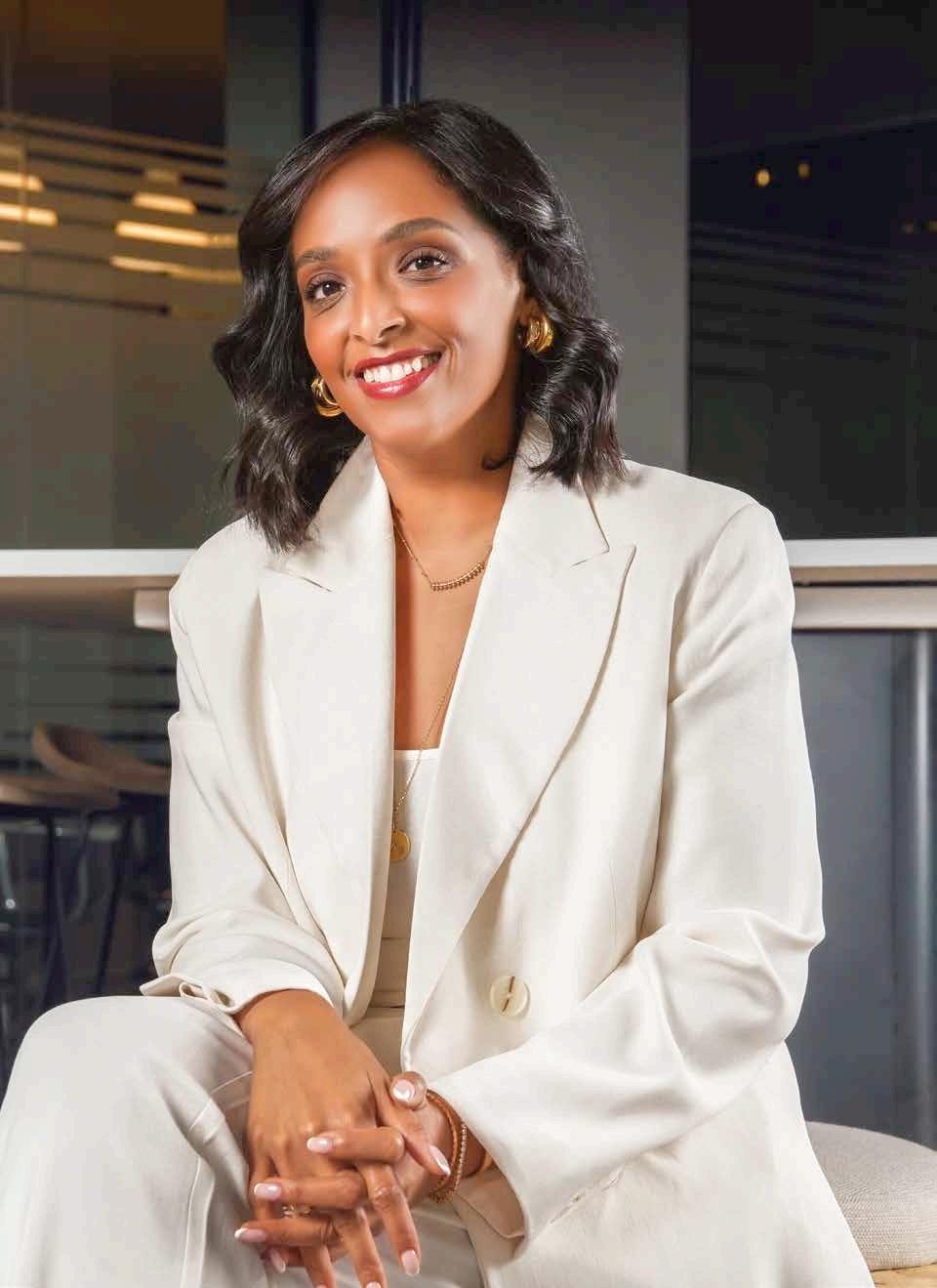


Focus for the next 12 months?
Regional footprint.
Buzzword we need to kill?
Very demure, very mindful.
Marketing needs to prioritise?
Work-life balance.
Marketing needs to change? Pitching process.
Top lesson learnt in 2024? Pick your battles.
What worries you the most?
Losing loved ones.
Biggest blessing in your life? My family.
Value/principle that matters the most? Integrity.
Next travel destination? Japan (hopefully).
What is your pet peeve?
Unpunctual people.
Who do you look up to? My father.
Favourite restaurant in the Middle East? Mythos.
What are you reading?
‘The Neuroscience of Leadership Coaching’.
Favourite hobby?
Weight training.
Top tip?
Communicate more.
is often neglected.
“Regional players have the opportunity to develop empowered, confident communicators who are eager to seize opportunities that will catalyse growth for their business.”
Now more than ever, communicators must internally prioritise ‘stabilising’ messages that promote calm and consistency – all while balancing a business and being in the pursuit of meeting targets. So, how do we set the groundwork for adopting such practices?
Firstly, the need for a balanced approach should make us focus on what’s working on a given day, instead of what constantly needs to change. While managing change is essential, fostering stability is equally critical to maintain trust and morale. Stability is not about resisting change; it’s about creating a sense of continuity that allows employees to navigate new directions with confidence.
Secondly, transparency and supportive communications are now more than ever critical for securing buy-in. Leaders must help their teams
change. At HAVAS Red, we introduced a strategy of identifying trusted employees who have the trust of their colleagues, to act as communication ambassadors – a powerful new communications tool. This approach underlines the importance of leveraging employee ambassadors and other methods to manage change, boost team morale and minimise disruption. Another evergreen strategy to increase buy-in is to use inclusive language – employing ‘we’ instead of ‘you’, creating a collective sense of purpose and responsibility.
In today’s polarised world, putting clear policies in place, prioritising transparent, consistent and supportive communications is more than a strategy — it’s a necessity. Balancing disruption with messages that reassure and unite can help organisations ensure resilience and cohesion within their team. When people are meaningfully engaged, they become an accelerant for successful transformation.
The implications for the PR industry in the Middle East are significant as we strive to grow our business and surpass client expectations. Regional players have the opportunity to develop empowered, confident communicators who are eager to seize opportunities that will catalyse growth for their business. To navigate challenges successfully, we must focus on what works well and stakeholder engagement, to mitigate risks and challenges that will come our way.
As Heraclitus once said, “the only constant in life is change.” None of this diminishes the fact that embracing change is crucial – in fact, change lies at the heart of our ‘why’. At the end of the day, why do we drive change? To better serve our clients and to drive productivity and innovation.
Embracing this mindset, while fostering stability and clarity, will be key to navigating the road ahead, ensuring that PR professionals in the Middle East remain vital players in an ever-changing global landscape.

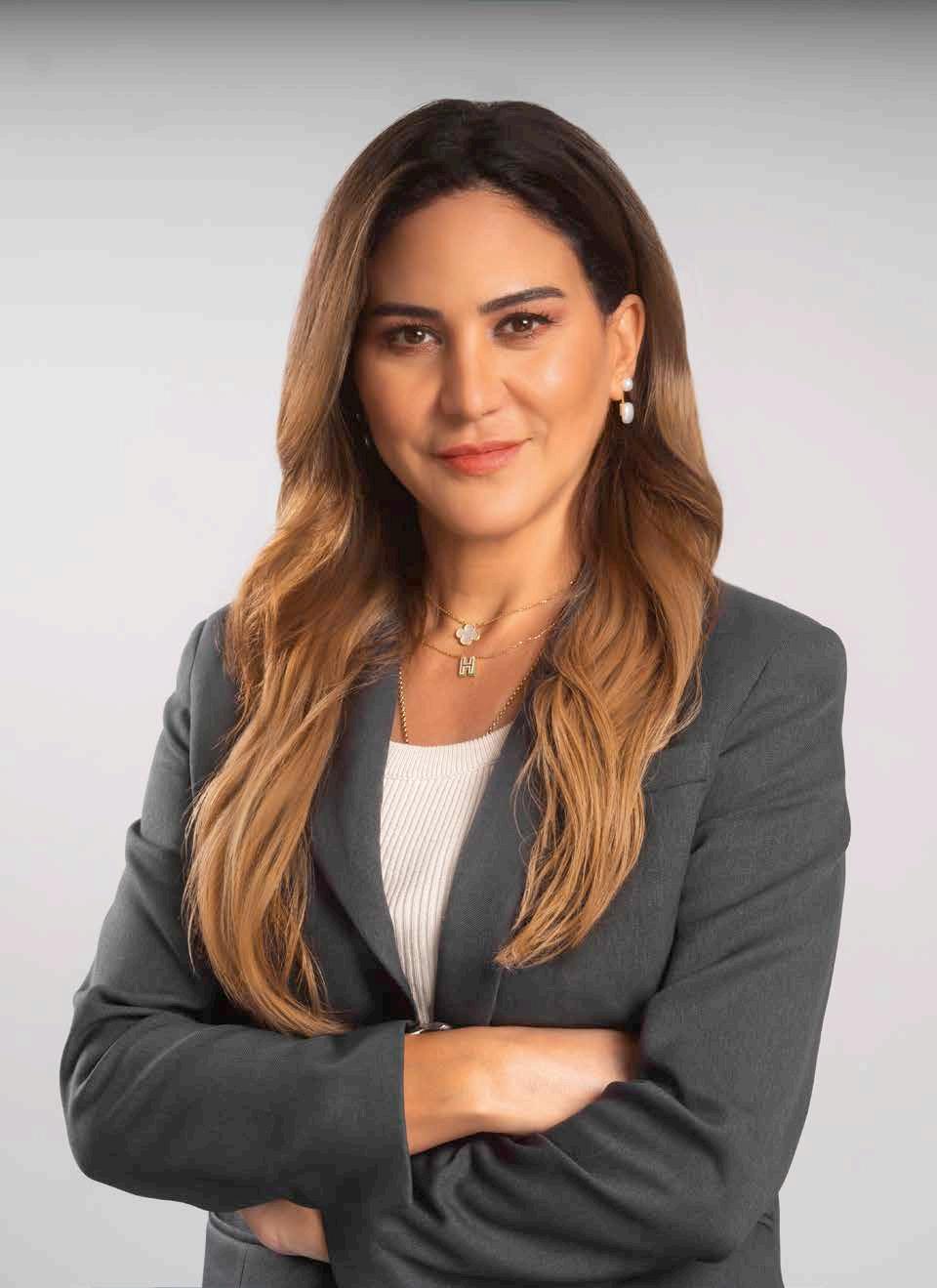


all celebrate. capabilities require ongoing investment in specialised talent and resources.
Focus for the next 12 months?
Regional growth.
Buzzword we need to kill?
Buzzword.
Marketing needs to prioritise?
Building brand equity.
Marketing needs to change?
Demanding more for less.
Top lesson learnt in 2024?
The grass is not always greener.
What worries you the most?
Health of loved ones.
Value/principle that matters the most? Honesty.
Next travel destination? Cyprus.
What is your pet peeve?
Not going the extra mile.
Who do you look up to?
My team.
Favourite restaurant in the Middle East?
Burj El Hamam in Lebanon.
What are you reading?
Becoming Supernatural
Top tip?
Always stay true to your values.
Yet, the pressure to reduce costs has led agencies to make difficult decisions, often resulting in stretched teams and, inevitably, missed opportunities for excellence. This pattern not only affects agencies but ripples across the industry, where media vendors also face constraints in investing in premium content and technology needed to deliver the quality that clients expect.
Another area of concern is the frequency of re-pitching, which has become increasingly commonplace. While periodic reviews can foster fresh thinking, the current practice of frequent pitches, often driven by short-term cost-saving objectives, detracts from the long-term strategic relationships needed for true innovation. It diverts both agency and client focus away from core objectives, placing a strain on resources.
A more structured and strategic approach to pitching would allow agencies and vendors to operate in an environment conducive to genuine collaboration and sustained value creation. Across advanced markets, we’ve seen how long-term client-agency relationships consistently deliver better outcomes. These partnerships are built on a clear understanding of the value each party brings to the table. They are supported by regulations and industry standards, often government-imposed, that ensure fair competition, protect the interests of all parties, and maintain transparency throughout the process. Such frameworks not only elevate the industry but also foster a healthier, more balanced ecosystem.
“A more structured and strategic approach to pitching would allow agencies and vendors to operate in an environment conducive to genuine collaboration and sustained value creation.”
In the Middle East, positive strides are being made. The establishment of Mada Media, tasked with overseeing regulatory compliance in out-of-home media, marks a significant step toward greater structure and transparency within Dubai’s advertising landscape. However, there remains a tremendous opportunity for agencies and vendors to take collaborative proactive steps toward refining their practices, ensuring that our industry’s growth is both sustainable and resilient.
Ultimately, the future of the advertising industry rests on our ability to build sustainable, long-term partnerships that drive both innovation and growth. To thrive, we must cultivate a culture rooted in collaboration and transparency, ensuring that the high standards we set for ourselves are consistently upheld. By doing so, we will not only meet the expectations of those who aspire to build a career in this field but will also create an environment that is both inspiring and sustainable for the future.




Focus for the next 12 months?
First-party data strategies.
Buzzword we need to kill?
New year, new me.
Marketing needs to prioritise?
Personalisation at scale.
Marketing needs to change?
Over-reliance on third-party cookies.
Top lesson learnt in 2024?
Actions speak louder than words.
What worries you the most? Family safety.
Biggest blessing in your life? My two sons.
Value/principle that matters the most? Honesty.
Next travel destination? Japan.
What is your pet peeve?
Chronic lateness.
Favourite restaurant in the Middle East? Gaia.
What are you reading?
‘Death In the Long Grass’.
Favourite hobby?
Padel.
Top tip?
Have fun along the way.
entire ecosystem and ensure that we are equipped with the right formula for success since our solutions do not work in silos anymore as media, creative, data, technology and overall strategy need to work together in harmony to ensure the success of brands and to help our clients win in the moments that truly count.
To stay ahead in a competitive landscape, brands need to shift focus from basic segmentation to transactions and engagement and the only effective possibility for that is through first-party data.
“The winners will be those who evolve, adapt, and have the agility to learn and unlearn in order to enable marketers to stay ahead of the curve.”
Real identity and consent should be the focus for marketers as these are the key drivers for effective marketing strategies. This direct relationship with consumers creates a personalised environment which allows for consistent messaging across all channels.
Ultimately third-party cookies will become less relevant over time, it’s a curve that will continue to accelerate as first-party data strategies mature and as we see greater adoption of the technologies to put this data to use across paid, owned and earned media channels.
The future belongs to those who can enrich first-party data, leading to superior targeting and engagement. By helping build consistent identifiers and unified profiles, brands gain a clear, cohesive view of customer behaviour through one single customer truth across all touchpoints. This personalisation will evolve into hyper-personalised experiences powered by predictive
consumed which offers serious opportunities for growth and evolvement. AI ensures a seamless omnichannel integration while maintaining consistent messaging across digital, social, mobile, and offline channels. The significant implications for our industry are big as it changes the fundamental process on which we operate and enhance personalisation, predictive analytics, and automated content creation. AI-powered data-driven insights are transformative in optimising campaigns, boosting revenue, and cutting down on waste.
Some of the most significant changes that are enabled by AI as well are the automation of our workflows, with the maturity of the automation process we will be more enabled, efficient, and agile in both content creation and the overall enhancement in engagement while maintaining a superior quality. This marketing evolution will ensure focusing on high-quality and valuable content that genuinely engages the audience.
It’s time to redefine our approach as an industry, by adopting sustainable long-term strategies across all layers of the organisation, by harnessing AI and sifting our first-party data strategies as this will truly help us unlock the full potential of the transformation. In this day and age, the winners will be those who evolve, adapt, and have the agility to learn and unlearn in order to enable marketers to stay ahead of the curve.

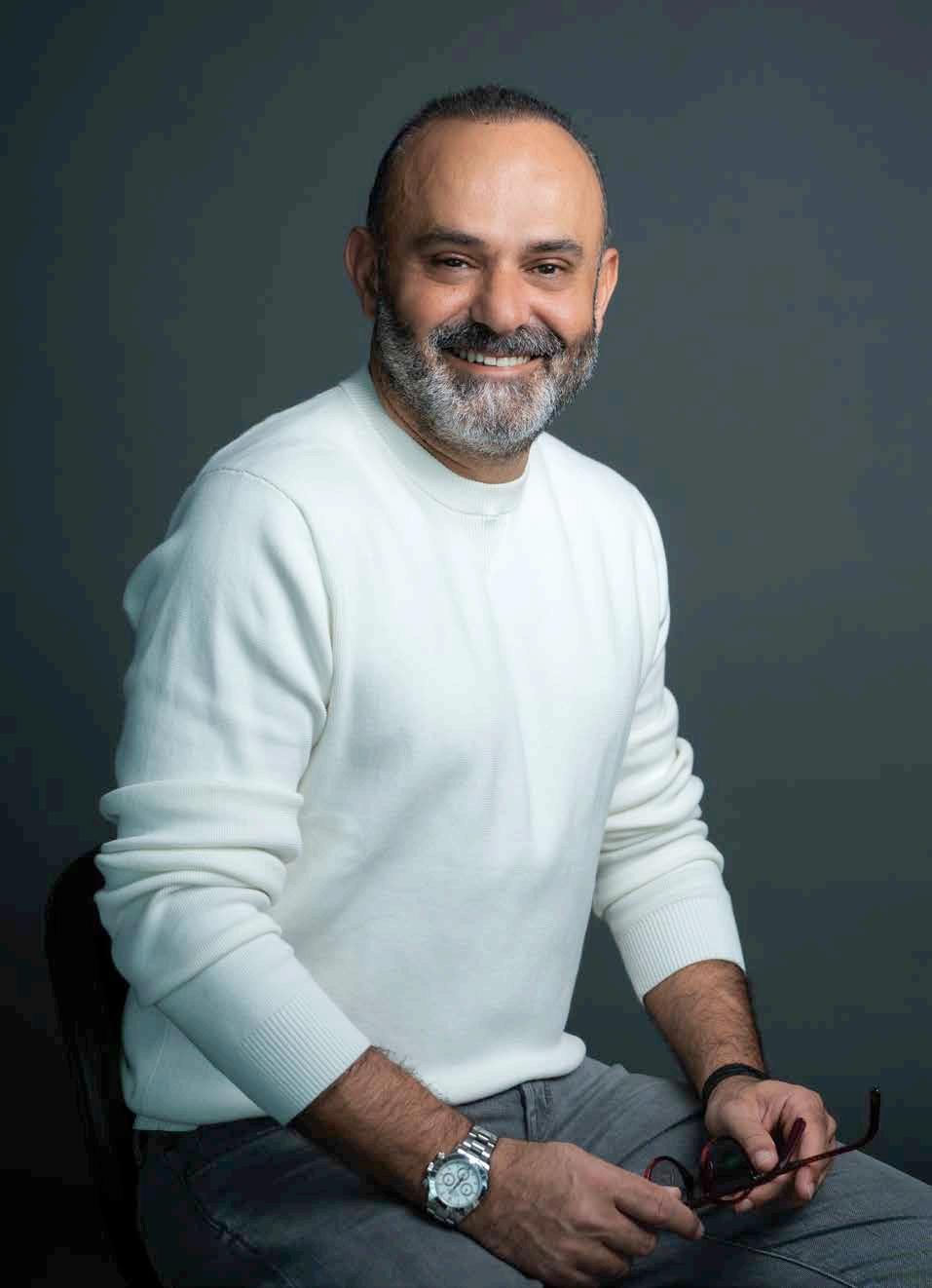


By Habib Wehbi, Chairman & Group CEO at W Group Holding (Hypermedia & DXTA Technology)
The digital out-of-home (DOOH) advertising landscape in the GCC region is undergoing rapid and profound changes and growth, driven by significant governmental investments in smart city development and breakthroughs in artificial intelligence (AI), programmatic advertising, and data analytics. These innovations have turned traditional media into powerful, dynamic and measurable experiences, seamlessly integrating into the urban fabric of cities like Dubai and redefining how brands connect with their audiences.
Ad spending in the Digital Out-of-Home (DOOH) advertising market across the MENA region reached $350mn in 2023, with projections indicating a significant rise to $700mn by 2029. Currently, only about 1 per cent of this spending is programmatic, highlighting the growth potential in this area. DOOH represents approximately 30 per cent of the total out-of-home (OOH) market, estimated to be around $1 billion. The figures underscore the region’s growing influence in the global digital advertising landscape.
We were pioneers in implementing AI and advanced technologies, which have enabled hyper-targeted advertising and real-time campaign optimisation. Programmatic advertising, recently introduced to our DOOH industry in the region, has streamlined the buying process, enhancing both efficiency and effectiveness. Though still in its infancy in the GCC, it represents the next big step. As DOOH media suppliers, we are committed to fully implementing programmatic advertising in our daily bookings and operations, transforming the way we connect brands with their audiences.
Sophisticated measurement tools and data analytics provide unprecedented insights into audience behaviour, allowing for precise adjustments that enhance campaign impact. For instance, in our partnership with Road & Transports Authority (RTA) in Dubai Metro, we utilised AI-driven analytics to optimise content delivery, resulting in six times more engagement and 77 per cent inventory optimisation.
Hypermedia, a key subsidiary of W Group Holding and a regional leader in DOOH and retail media experiences, has embraced these changes by securing media rights with key partners, including RTA, Dubai Holding, Aldar Properties, Majid Al
Futtaim, Union Coop, and ENOC. These strategic partnerships represent more than just growth – they signify our commitment to capturing and engaging new audiences through high-traffic locations to create unparalleled advertising opportunities.
W Group Holding is at the forefront of leveraging technology to revolutionise the DOOH landscape. Hypermedia epitomises this commitment by integrating AI technology, strategically placed media assets, and advanced data measurement tools. This approach delivers visually compelling and highly effective campaigns, enhancing the overall impact of brand messages.
Hypermedia’s network, the largest in the UAE, utilises these innovations to ensure that our media presence reaches consumers throughout their daily routines. From Dubai Metro to retail environments and landmark destinations, our network provides a seamless, engaging experience that keeps brands top-of-mind.
DXTA Technology, another W Group subsidiary, enhances this approach and plays a pivotal role in the group vision by specialising in tailored digital ad products and smart tech solutions. By utilising exclusive technologies, DXTA maximises returns on investment and helps brands in the UAE and the GCC region to achieve their long-term goals.
Together, Hypermedia and DXTA offer a robust digital portfolio that effectively engages consumers both online and offline. What sets W Group Holding apart is our proprietary technologies and unique audience insights, enabling us to craft campaigns that not only reach but also resonate deeply with target audiences.
As we advance in the dynamic media and technology landscape, W Group Holding’s strategic efforts aim to set new standards in OOH media and digital marketing. Our vision extends beyond the GCC, as we explore opportunities to apply our successful model in other rapidly growing markets. By offering innovative communication tools and leveraging cutting-edge technologies, we focus on amplifying reach and driving significant business impact. This commitment to innovation and excellence positions us at the forefront of the industry, guiding the future of media with a forward-thinking approach.
Focus for the next 12 months?
Growth and innovation.
Buzzword we need to kill? Disruption.
Marketing needs to prioritise? Authenticity.
Marketing needs to change?
Rely more on data for decision-making.
Top lesson learnt in 2024?
Adaptability is key.
What worries you the most?
Global economic instability.
Biggest blessing in your life? My family.
Value/principle that matters the most? Integrity.
What is your pet peeve?
Missing deadlines.
Who do you look up to?
Successful entrepreneurs.
What are you reading?
‘Atomic Habits’ by James Clear. Favourite hobby? Sports.
Top tip?
Always keep learning.
CAREER HIGHLIGHT:
Over the past year, we’ve firmly positioned W Group Holding as a regional leader in DOOH, retail media, digital media, and smart tech solutions, truly bringing our tagline, “Experience Media Technology”, to life. A key milestone since 2021 has been Hypermedia’s strategic expansion, amplifying our media network across Dubai Metro, retail media, and iconic UAE destinations such as Palm Jumeirah, Nakheel communities, Expo City Dubai, ENOC petrol stations, and Hudayriyat Island, solidifying our position as a dominant force in the region’s media landscape.

Additionally, at DXTA, we’ve optimised business and brand investments through cutting-edge digital ad products, bespoke experiences, and precise targeting, ensuring sustained commercial success and solidifying our reputation as industry pioneers.

An untapped economic, social and cultural force.
A must-read, this publication is a timely addition to the growing body of global literature on gaming. Multidisciplinary, data-driven and evidence-based, it is one of the few where the focus is on the gamers’ themselves. It o ers insights into drivers, intergenerational di erences, gender-based stereotypes, gaming as an identity, its socialization aspect, and the economies of gaming. A wealth of first-party and second-party data is used. Leveraging the network of Saudi Gamer, three IG polls were rolled out on in 2024, yielding an average response rate of 7,058 and ten focus group meetings with Saudi gamers were conducted.

“ “
I play because I am interested in other cultures. Gaming is like traveling . I meet gamers from di erent nationalities, and I proudly introduce myself as Saudi.
(Saudi female gamer, aged 30.)
Gaming is also about family time. I play with my father and sibings. We are the passionate generation that has finally come to good terms with its family.
(Saudi male gamer, aged 21)
“
























































Join us on 17 October at the Sheraton Riyadh Hotel & Towers to be an active part of top discussions on Saudi Arabia's sports investments, the business of entertainment, and find out how the future of digital and social media are shaping up in the Kingdom.






















DATE: October 17, 2024 TIME: 9:00 AM VENUE: Sheraton Riyadh Hotel & Towers

